|
| Belgrade to get Centre for Fourth Industrial Revolution |
|
Prime Minister Ana Brnabic attended today in Geneva the signing of the Agreement on the Establishment of the World Economic Forum Centre for the Fourth Industrial Revolution in Serbia, the first of its kind in the Western Balkans.
The agreement was signed at the headquarters of that forum by Director of the Office for Information Technologies and eGovernment Mihailo Jovanovic and Managing Director and Head of the Forum's Centre for the Fourth Industrial Revolution Jeremy Jurgens.
The centre in Serbia will be the 16th in the network of centres of the World Economic Forum in the world and the first in the region of the Western Balkans.
The new centre will start operating on 1 March and will function as a non-profit organisation and a platform for public-private partnership and cooperation for the Fourth Industrial Revolution, while the focus of work will be on artificial intelligence and bioengineering.
This centre will work within the Serbian government’s Office for Information Technologies and eGovernment and will cooperate with scientific institutes, state institutions and the private sector.
The signing of this document was also attended by founder and Executive Director of the World Economic Forum Klaus Schwab and President of the World Economic Forum Borge Brende, with whom Brnabic had previously met.
Addressing the press, Brnabic pointed out that this agreement is the result of many years of joint work between Serbia and the World Economic Forum.
We started talking in 2018, signed a Memorandum of Understanding, then 2020 hampered us a bit, but we continued to plan in 2021 and here we are today, she said.
According to her, the centre will be focused on the development of artificial intelligence, biomedicine and biotechnology, and on the ways in which digitalisation can raise the productivity of companies and the entire economy.
This is what further leads to higher salaries, a better standard of living, as well as to an economy that is mainly based on knowledge, creativity and innovation, Brnabic emphasised.
Today, we have received great recognition for everything that Serbia has done in the field of digitalisation, development of high technologies and paradigm shift – from an economy that was based on labour-intensive investments to digital development.
That is why this agreement shows that Serbia has been recognised as one of the leaders in the economy and IT industry in the last six years, the Prime Minister pointed out and assessed that this is the announcement of the beginning of an even closer cooperation between Serbia and WEF.
She added that they will have a joint meeting with the 16 WEF centres for the fourth industrial revolution in the world every month, at which they will talk about what each of them is doing, since each has a different focus.
That is how we will hear what everyone is doing every month, learn from each other and I am sure that the centre in Belgrade will be one of the best, the Prime Minister said.
According to her, this gives us visibility, the opportunity to further establish Serbia as an investment destination, a country good for living and investing in new technologies and knowledge.
Jovanovic said that the ecosystem formed around the centre will use the infrastructure of the National Platform for the Development of Artificial Intelligence, the Centre for Genome Sequencing and the future bioeconomic centre – BIO4 Campus.
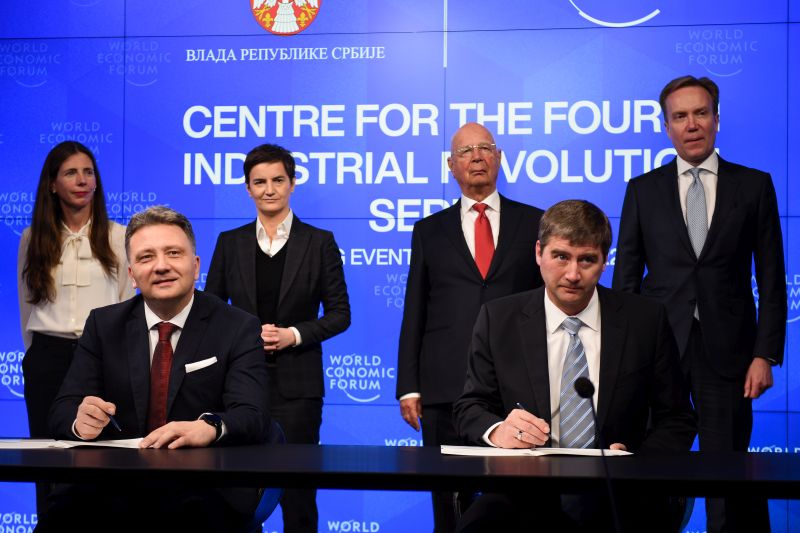
Source/Photo: Tanjug
7 February 2022
|
|
|
| Opening of cluster 4 important turning point for Serbia |
|
Prime Minister Ana Brnabic stated in Brussels today after the Intergovernmental conference on the accession of the Republic of Serbia to the European Union (EU) that today is a very important date and a turning point for Serbia.
Brnabic said that in line with the new methodology, Serbia has opened cluster 4 – Green Agenda and Sustainable Connectivity, and within cluster 4, four chapters have been opened.
The Prime Minister underlined that this is a great success on which she wants to congratulate all citizens of Serbia and she thanked President of Serbia Aleksandar Vucic on the support and understanding he showed.
An important segment of the new methodology is political management of integrations. What we have done in the mandate of the new government is that we manage, together with Minister of European Integration Jadranka Joksimovic, the integration process and all reforms, first and foremost in the field of the rule of law, politically in full, and that yielded results, the Prime Minister said.
She said that the opening of the chapters is a huge motivation for further reforms in the field of the rule of law, public administration and the economy.
I would like to thank all EU Member States, as well as the European Commission, for their support and understanding. They have shown that they are open, that they are ready to see, to listen, to reward everything we have done and therefore this is a great motivation to continue, not even in the same way we have worked so far, but to go faster and to work better, she noted.
Brnabic voiced hope that Serbia will open cluster 3 in 2022, which is ready, and that preparations for the opening of cluster 5 are on the agenda.
The Prime Minister underlined that environmental protection is gaining importance and that this topic is increasingly present and important in Serbia.
Regional stability, dialogue with Pristina and the economy also remain our priorities. I am satisfied, and we talked about that today, about economic results Serbia is achieving. I expect our growth this year to be 7.5 percent, the Prime Minister pointed out.
She said that the degree of harmonisation of Serbia with the foreign and security policy of the EU currently stands at 65.55 percent.
Brnabic also thanked Slovenia for the successful EU presidency, she thanked EU Member States on their support, as well as the European Commission, European Commissioner for Neighbourhood and Enlargement Oliver Varhelyi and European Commission President Ursula von der Leyen.
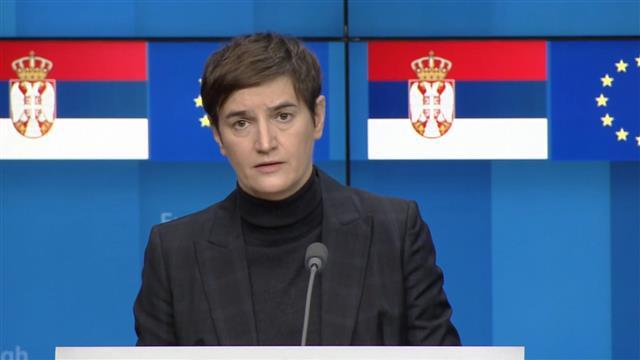
Source: www.srbija.gov.rs
Photo: Tanjug
14 December 2021
|
|
|
| ENTRY INTO SERBIA FROM COUNTRIES OF SPECIAL RISK |
|
All travelers, no matter their nationality, that are arriving to Serbia form countries of special risk of spread of Covid-19 virus ( 1. South Africa 2. Botswana 3. Zimbabwe 4. Namibia 5. Lesotho 6. Mozambique 7. Malawi), are allowed to enter Serbia if they present one of the following documents:
1) Negative PCR test result for presence of SARS-CoV-2, not older than 48 hours from the date of issuing, which is issued by a competent national laboratory in country from which they are arriving from, if there is a delay in entering the Republic of Serbia, which cannot be attributed to the passenger's fault, but is a consequence of an external event that could not have been foreseen, avoided or eliminated – delay of the flight, the departure of buses, trains, etc., then the test cannot be older than 72 hours when entering the Republic of Serbia).
2) Certificate of completed vaccination issued by the Republic of Serbia, i.e. a foreign state with which the Republic of Serbia has concluded an agreement on the recognition of vaccination (GREECE, HUNGARY, ROMANIA, SLOVENIA, TURKEY, UNITED ARAB EMIRATES, CZECH REPUBLIC) or with which there is a de facto reciprocity in the recognition of the vaccination certificate (ANDORRA, ARMENIA, AUSTRIA, BELGIUM, CABO VERDE, CROATIA, CYPRUS, EGYPT, ESTONIA, FINLAND, FRANCE, GEORGIA, GERMANY, ICELAND, IRELAND, ITALY, LEBANON, LIECHTENSTEIN, LITHUANIA, MALTA, MOROCCO, MOLDOVA, NETHERLANDS, SAN MARINO, SLOVAKIA, SPAIN, SWITZERLAND, TUNISIA, UNITED KINGDOM OF GREAT BRITAIN AND NORTHERN IRELAND, UKRAINE).
3) Certificate of overcome COVID-19 disease – a certificate or other public document stating that the holder of the document has overcome the disease caused by the SARS-CoV-2 virus, i.e. that this person has been diagnosed with the SARS-CoV-2 virus, provided that no less than 14 days and no more than six months may elapse from the first test, issued by the Institute of Public Health established for the territory of the Republic of Serbia, i.e. the competent authority of the state with which the Republic of Serbia has concluded an agreement or de facto reciprocity on the recognition of such documents (ANDORRA, AUSTRIA, BULGARIA, GREECE, DENMARK, CROATIA, ESTONIA, IRELAND, ICELAND, CABO VERDE, LIECHTENSTEIN, LUXEMBOURG, GERMANY, ROMANIA, SAN MARINO, UNITED STATES OF AMERICA, SLOVENIA, TUNISIA, TURKEY, SWITZERLAND, SPAIN).
FOREIGN CITIZENS arriving from countries of special risk, or that have been in a country of special risk within the last 14 days prior to entering Serbia, must also additionally present:
1) An e-mail received after registration via following link www.ezdravlje.gov.rs , section „Foreigners Surveillance Registration“, as a proof of successful registration prior to arrival to Serbia.
2) Filled in and personally signed statement of consent of acceptance of quarantine measures at home
ALL TRAVELERS will be subjected to a 14-day home quarantine with a mandatory testing within the first 24 hours from entry and on the 7th day from the start of the measures. Testing will be done by the Institute of Public Health at the expense of the person being tested (negative result is not a condition for release from quarantine). If no symptoms appear within those 14 days, quarantine measures end without a need for additional testing. |
|
|
| UNESCO’s role extremely important for preservation of Serbian heritage in Kosovo and Metohija |
|
Prime Minister Ana Brnabic stated today that severe examples of endangering the Serbian cultural, historical and spiritual heritage in Kosovo and Metohija are proof of the important role of UNESCO in protecting and preserving heritage.
At the 41st session of the General Conference of UNESCO in Paris, Brnabic emphasized that four jewels of the Serbian medieval cultural heritage in Kosovo – Visoki Decani, Pec Patriarchate, Gracanica and Bogorodica Ljeviska, have been preserved thanks to the fact that they are inscribed on the endangered world heritage list. Hundreds of other sites and monuments are endangered.
The Serbian heritage in Kosovo and Metohija is of immeasurable importance, not only for the national identity of Serbia, but also as a part of the esteemed European and world heritage, she underlined.
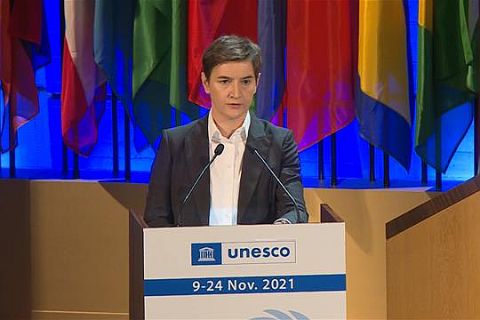
Source/Photo: www.srbija.gov.rs
12 November 2021
|
|
|
| Serbia expects support for opening clusters by end year |
|
Prime Minister Ana Brnabic stated today in Paris that she expects positive news and support from France for opening one or two clusters at the intergovernmental conference to be held in December.
At the press conference, Brnabic stated that she talked with French President Emanuel Macron about the situation in Serbia, primarily in the context of European integration, i.e., whether we can count on the country's support for opening a cluster at the December intergovernmental conference.
We have two clusters ready for opening, so I expect positive news and support from France for one or both clusters, but certainly significant support, the Prime Minister said.
She pointed out that Macron told her to convey greetings to the President of the Republic, Aleksandar Vucic, and the whole of Serbia, as well as that he remembers his visit to Belgrade with great joy.
Today, I had good talks with the President of Cyprus, but also with the President of Slovenia, with whom I also talked about European integration, i.e., the country's support, which is clear and unambiguous for opening a cluster and further progress of Serbia towards full EU membership, regional relations and regional cooperation, said Brnabic.
She stated that she also talked with EU High Representative Josep Borrell in Paris.
There were interesting and good talks, it seems to me that we have done good things for our country and I expect it to continue today, the Prime Minister concluded.
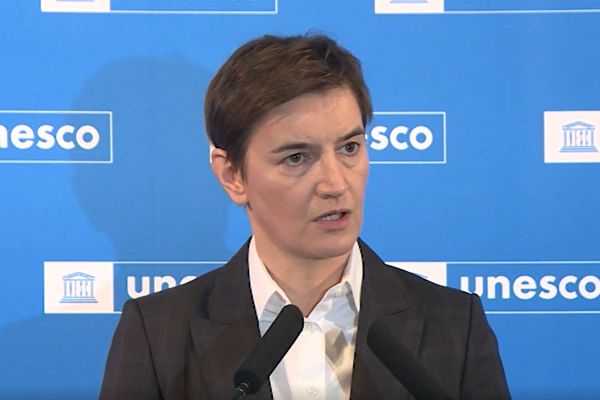
Source/Photo: www.srbija.gov.rs
12 November 2021
|
|
|
| Address of the President of the Republic of Serbia at the United Nations climate change conference COP26 held in Glasgow |
|
"Your Excellences,
distinguished delegates,
dear Sarah,
At the very beginning, I feel obliged to thank Prime Minister Boris Johnson and Her Majesty’s Government for exceptional hospitality.
I feel privileged to represent the Republic of Serbia at this important place and at the highest-level world forum, in working on the most important topic of today – promoting climate awareness.
We all agree that we must make investment into climate and environment.
We all, likewise agree, that future generations must be educated in order not to repeat the mistakes we made, by hurting the only Planet that makes life possible.
I am very honoured that the Republic of Serbia is co-chairing this year’s Conference as a Non-EU representative of the Eastern Europe Group.
In concrete terms, we see the special contribution of our expert team in finalising negotiations on the implementation of Article 6 of the Paris Agreement, which refers to the establishment of the global market and non-market mechanisms for reducing greenhouse gas emissions, as well as to remaining provisions referring to advanced transparency framework and common timeframes for Nationally Determined Contributions, which are the key provisions of the Agreement that have not yet been covered by the decision that is to be adopted by the Conference, i.e. all member states.
We, therefore, believe that this is an exceptional opportunity for Serbia to give its full contribution to the finalization of negotiations, which, we hope, will secure full implementation of the Paris Agreement.
As a result of strong economic development, modelled for Serbia by 2050, the impact of the implementation of climate measures to employment will be optimal, through new jobs creation and creation of new industries which have not existed so far.
One billion euros was raised at the first green bonds auction in Serbia, which clearly confirms the trust of international investors in our green agenda, but also to the economic and political stability of our country.
Incomes from green bonds issuance will be used for financing renewables, energy efficiency, sustainable water management, prevention of pollution and circular economy development and biodiversity preservation.
And as you can see, dear friends, my people made a terrific speech for me, but I am going to add a few more words and a few more questions for those that are coming from big powers and that haven’t answered yet several questions:
Number one is: how are we going to finance all these activities?
We’ve heard the story of trillions of dollars that are at our disposal. My question would be: what would be the interest rate, what would be the terms for taking these amounts of money, and actually how are we going to tackle that issue?
Number two: how are we going to treat the nuclear power plants? Are we going to shut them all or are we going to build them more?
Then, how are we going to build more renewables if we already started endorsing populist movements against wind parks, new hydropower plants, and are we going to put in jeopardy the level of our public debt to GDP ratio if we raise huge amounts of money?
How are we going to treat natural gas, and how are we going to secure decent prices of natural gas and electricity power as well?
And, I came here using an electric car from Edinburgh to Glasgow. But, how are we going to do mining and refining of lithium, nickel, cobalt and many other very important minerals?
In the end, we all know what is our final aim, what is our final target. But, it’s not a fairytale – we’ll have to work a lot, we’ll have to be 100 per cent dedicated, and we’ll have to be more honest with each other.
The health of people living in Serbia depends directly on the implementation of this Agenda, just like the health and life of each living being on Earth depends on arrangements that will be reached here and on national implementation of the respective arrangements.
Perhaps it is the right time to listen and hear the cry of Mother Earth because if we lose this race against time, our children will inherit an irreparably polluted Planet.
Thank you very much for listening to me."
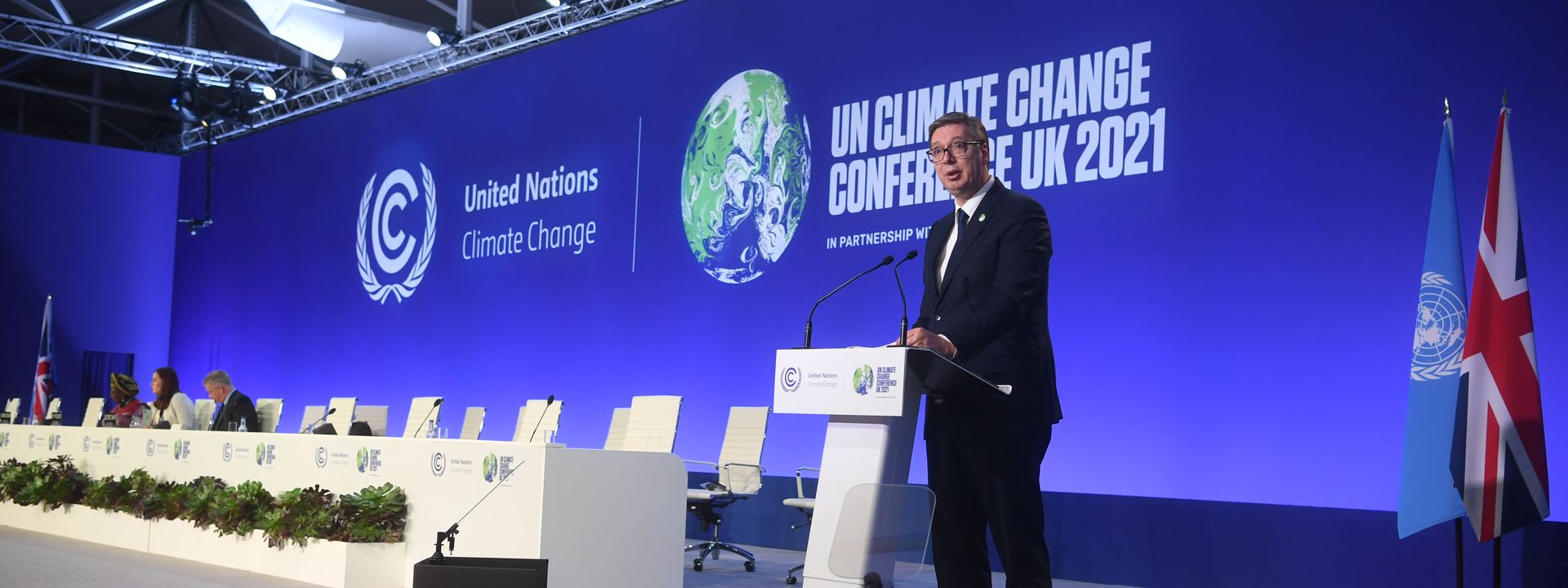
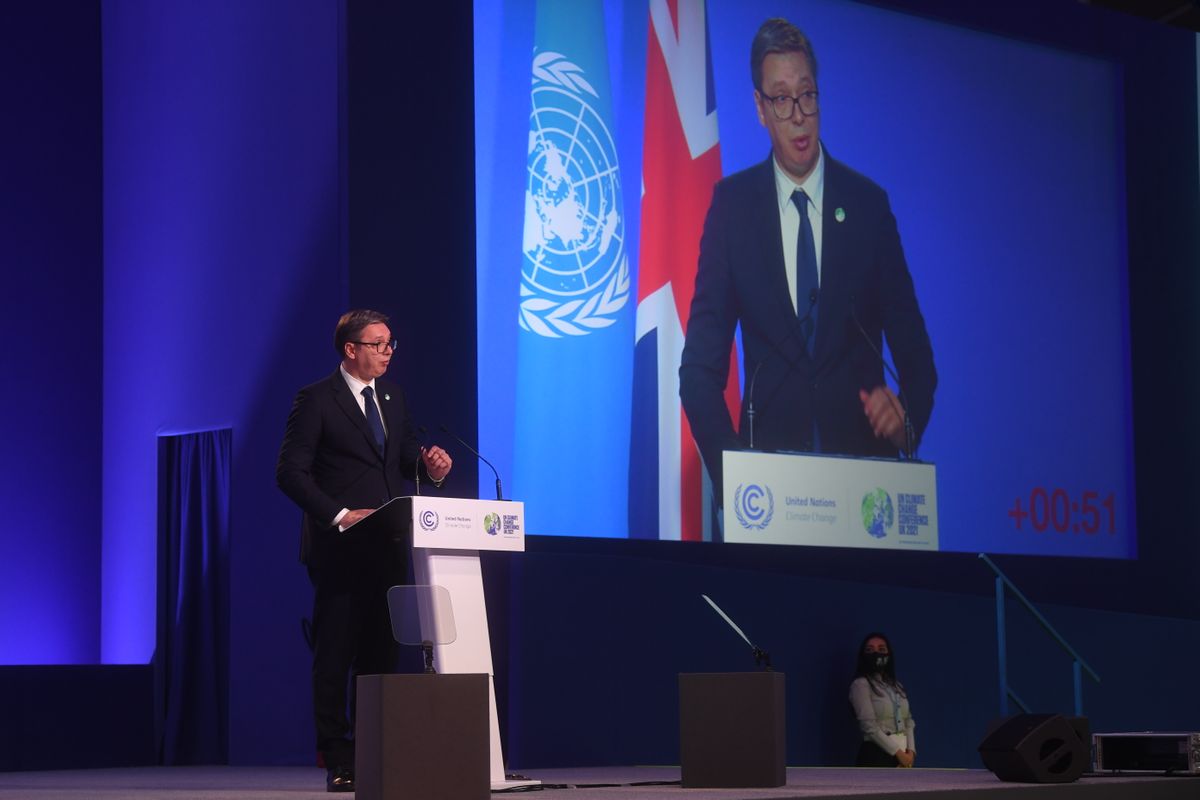
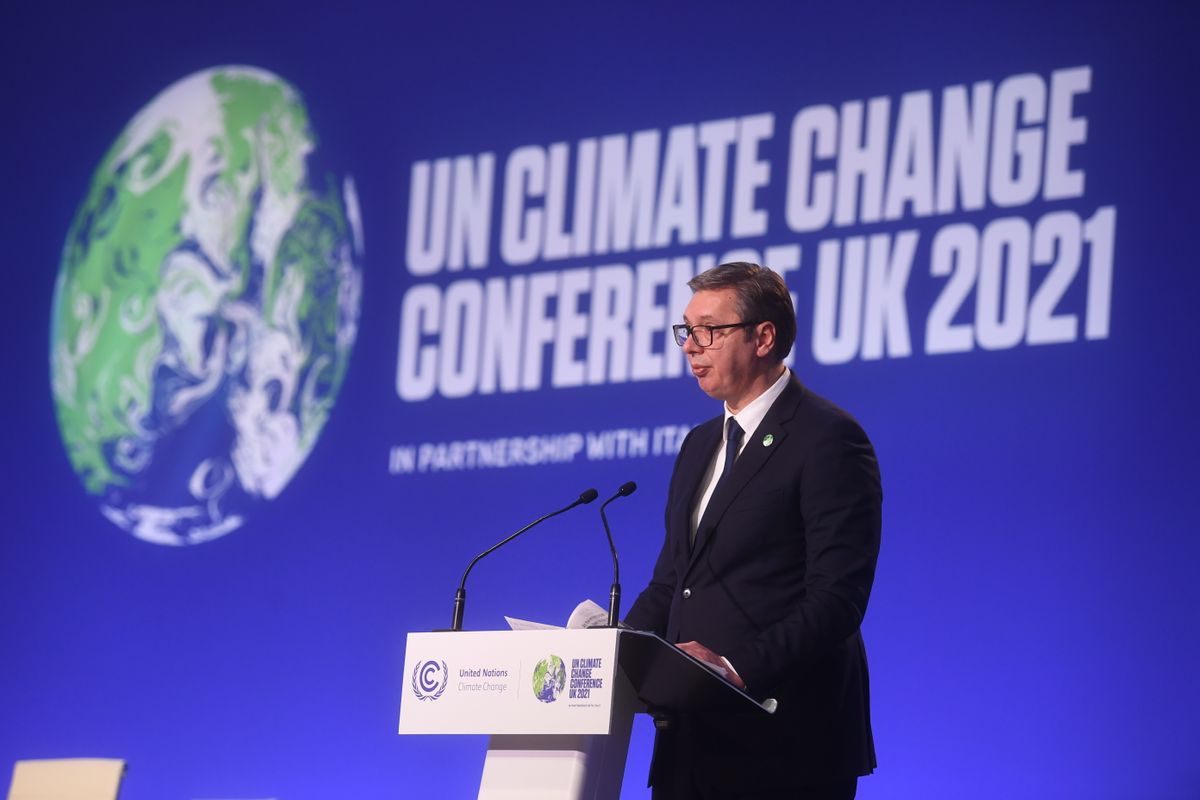
Source: www.predsednik.rs
Photo: Dimitrije Goll
2nd November 2021 |
|
|
| Selaković in UNSC: Dialogue and the implementation of the agreements reached are the only right way to resolve all open issues |
|
Distinguished President of the Security Council,
Esteemed members of the Security Council,
Distinguished Special Representative,
I would like to thank Secretary-General of the United Nations Mr. Guterres and Special Representative of the Secretary-General and Head of UNMIK Mr. Tanin for the report submitted and for their efforts made towards the implementation of the UNMIK mandate. I would also like to thank the members of the Security Council for the continued attention they have devoted to the issue of Kosovo and Metohija. The Republic of Serbia highly values the activities of the Mission of the United Nations in Kosovo and Metohija and supports it in carrying out its work as efficiently as possible, pursuant to the UN Security Council Resolution 1244, and undiminished in scope, aiming to build and preserve lasting peace, stability and security in the Province.
Mr. Tanin,
Please accept the expressions of our gratitude for your engagement and the cooperation we achieved during your term of office.
Mr. President,
Deep regret and concerns are raised by the fact that the security situation in Kosovo and Metohija in the past period has been marked by an increasing number of various ethnically motivated attacks and incidents targeting Serbs, which was also stated in the Report; that the provisional institutions of self-government (PISG) in Pristina continue to take unilateral steps and refuse to implement the agreements reached in the Brussels dialogue; and that institutional discrimination against Serbs, attacks on the sites of the Serbian Orthodox Church and the undermining of the economic sustainability of Serb communities in the Province have continued.
We are witnessing that dangerous provocations by Pristina are taking place every day, at an accelerated pace, thus seriously threatening the safety of Serbs in Kosovo and Metohija and directly violating the agreements and arrangements reached within the Brussels dialogue.
The latest violent incursion of the so-called ROSU units into the northern part of Kosovska Mitrovica, on 13 October, is the ninth incursion of its kind. Tear gas, shock bombs and unbridled violence are becoming a matter of everyday life for Serbs in the north of Kosovo and Metohija, and that must be stopped immediately.
In the last attack with firearms and chemicals used by Pristina special forces, 71-year-old Verica Djelic died as a result of chemicals used in the intervention, 10 unarmed civilians were wounded, one of them 36 years old Srećko Sofronijević was critically wounded in the back with of an automatic rifle. A three-month-old baby, who miraculously remained unharmed, was also the target of the shooting.
The false excuse for the latest unilateral action, as EU High Representative for Foreign Affairs and Security Policy Josep Borrell called it, was the fight against organized crime and smuggling. Ladies and gentlemen, Serbia is strongly against organized crime and smuggling, but the members of the UNSC should know that such an important and general global goal, which we all share, was cynically used for an armed attack on unarmed civilians, which began with an automatic rifle raid of pharmacies in which patients of Serbian and other nationalities are supplied with vitally important medicines. Four days before the local elections in Kosovo and Metohija, in order to gain votes in an irresponsible and inhumane way, fully motivated by separatist goals, the current PISG regime used medicines on which people’s lives depend to prove its position on the status contrary to UNSCR 1244.
Only a few days earlier, another provocation on the part of Pristina led to a dangerous crisis, when personnel of the so-called ROSU unit, armed with long firearms and reinforced with armoured vehicles, were deployed to administrative crossings between central Serbia and Kosovo and Metohija - Brnjak and Jarinje – in order to remove Serbian license plates and replace them with temporary ones, thus violently preventing the free movement of citizens.
These events do not fall within the reporting period covered by the latest Report of the UN Secretary General on the work of UNMIK, but it is incumbent upon us to address them on this occasion, in order to have everyone understand how dramatic the situation on the ground has been and how serious the consequences of Pristina's unilateral actions can be.
The incursions of heavily armed Pristina police formations, composed exclusively of Albanians, into the north of Kosovo and Metohija, under various pretexts and motives, with the use of excessive force, are provocations that have an extremely dangerous potential to destabilize the already sensitive security situation on the ground. The goal of the latest incursions of Pristina’s special force personnel into the north of the province was to provoke the Serbs and additionally intimidate them with a demonstration of force, as well as to provoke Belgrade to react hastily in some way.
It is obvious that with such moves Pristina aims to erase the 10 years of dialogue, which is the only way to resolve open issues. These provocations once again demonstrate that the provisional institutions of self-government in Pristina, not only do not intend to implement everything agreed in the Brussels dialogue, but that their goal is to completely deny dialogue as a means of resolving problems. An effective response to Pristina's lack of credibility and their dangerous play with fire, which could have unforeseeable consequences, cannot be provided by calling on "both sides" for constructiveness and restraint, which has long been a manner in public communication of some important factors in the international community. There is only one source of destabilization, it has a name – and that is the provisional institutions of self-government in Pristina - and after the events of 13 October, it is clear that it can and needs to be stopped by urgent and decisive action of the international community. It is now quite obvious that these are no longer sporadic and isolated provocations by Pristina, but that this is an organized campaign of ethnically motivated violence and discrimination against Serbs.
We also express our concern over the latest imposition of tariffs by Pristina on certain products originating from central Serbia, which was made public on 8 October. We remind you that the unilateral decision of Pristina to impose duties on products from central Serbia in November 2018 resulted in a de facto complete trade blockade and a long-term stalemate in the dialogue between Belgrade and Pristina. In contrast to Pristina, which persistently seeks to raise barriers towards central Serbia through unilateral acts, Belgrade is persistently and consistently working to liberalize the flow of people, goods, services and capital, which is the basic goal of our "Open Balkan" initiative. North Macedonia and Albania joined this initiative, but Pristina did not.
Distinguished members of the Security Council,
In the period from March to September this year, which is covered in the latest Report, close to 100 ethnically motivated attacks were carried out against Serbs, their private property, religious and cultural heritage sites. The increase in the frequency of attacks was accompanied by the strengthening of the intensity of ethnically motivated violence, which more and more often targets children, the elderly, women, the few returnees present there, as well as churches and other property of the Serbian Orthodox Church.
This systematically intensifies the ubiquitous sense of insecurity of the remaining Serbs, but also deters potential returnees, who are in fact being told that local Albanian communities can attack them with impunity and prevent them from returning to live in their own homes.
The most striking example of the position of Serbs in Kosovo and Metohija is the case of the displaced person Dragica Gašić, who moved into her apartment in the municipality of Djakovica again in early June. In that town – to which local Albanians proudly refer as a place forbidden to Serbs - Ms. Gašić, on her return, first faced physical and verbal attacks by citizens of Albanian nationality living there. Instead of being provided protection, that seriously ill woman then became a victim of institutional persecution as well, that the local self-government bodies and the police unleashed against her. Since this is a person who is the first and only Serb returnee to Đakovica after more than twenty years, it was to be expected that, at that moment, at least civil society organizations would attempt to protect her rights. However, NGOs from Djakovica soon joined the activities aimed at the expulsion Ms. Gašić, including those receiving funding from international donors for projects related to strengthening democracy and the rule of law.
I must also mention the latest attack on the house of the only remaining Serbian woman in the center of Pec, retired teacher Rumena Ljubić, whose windows were stoned twice in just 24 hours on 13 October.
Dragica's and Rumena’s fate is a frightening reflection of the real situation of human rights that almost every one of over 200,000 displaced Serbs and non-Albanians would face in Kosovo and Metohija - provided that they gather the courage to return to their homes in the Province after more than twenty years. I would like to remind you again that since 1999, only around 1.9% of internally displaced Serbs and other non-Albanians have achieved a sustainable return to Kosovo and Metohija.
Therefore, I believe that the aforementioned will encourage the members of the Security Council and the international presence on the ground to devote priority attention in the future
to the issue of the return of displaced persons, which is an important part of the UNMIK mandate under UN Security Council Resolution 1244.
I therefore thank the Secretary-General in particular for keeping this extremely important issue in focus and for calling again, in the conclusions of his Report, for the creation of conditions for the sustainable return of internally displaced persons and the sustainable reintegration of returnees.
Distinguished members of the Security Council,
Serbian medieval monuments in Kosovo and Metohija, including monuments that, due to their exceptional value but also constantly being subject to threats are inscribed on the UNESCO List of World Heritage in Danger, are still among the most endangered cultural heritage in Europe.
I wish to recall that there are over 1,300 Serbian churches and monasteries in Kosovo and Metohija. Attacks on Serbian cultural and religious heritage are at the same time attacks on the identity of Serbs in the Province and directly affect their sense of safety.
A striking example of disrespect for Serbian cultural and religious monuments in the Province is the case of the Visoki Decani monastery. The monastery, which has been the target of attacks and shelling several times since 2000, is still secured by KFOR forces due to being under a threat. It is faced with a series of hostile actions, and the perpetrators are not deterred by the fact that this is a World Heritage Site. Despite frequent declaratory statements, even the decision of the so-called "constitutional court" of the PISG in Pristina five years ago confirming ownership of Visoki Decani Monastery over 24 hectares, is not respected. We welcome the assessment made by the UN Secretary General in his Report.
Dear Mr. President,
The Republic of Serbia remains committed to finding a compromise political solution, as prescribed under Resolution 1244, which will ensure lasting peace and stability. We firmly believe that dialogue and the implementation of the agreements reached are the only right way to resolve all open issues.
As a state committed to the respect for international law and a member of the United Nations, Serbia opposes any attempt at establishing an artificial balance between the parties in the dialogue, as well as the relativization of responsibility for unilateral acts.
We note with concern that not even eight years after reaching the Brussels Agreement, the establishment of the Community of Serb Municipalities has not been initiated, although Belgrade has fulfilled all its obligations under that agreement.
There are also numerous and repeated examples of Pristina violating or obstructing agreements reached in dialogue, in the areas of energy, justice, freedom of movement and visits by officials.
One such example is the verdict sentencing Ivan Todosijevic to two years in prison, which is also pointed out in the Secretary General's Report. The Brussels Agreement was directly breached, which was also stated by the representatives of the European Union. With its conduct Pristina caused immeasurable damage to the reconciliation process in Kosovo and Metohija.
Despite the interpretation from the European Commission that this is a violation of the Brussels Agreement, because Todosijevic had to be sentenced by a panel consisting of the majority of judges of Serbian ethnicity, Pristina still does not take any action in this regard.
Pristina also continued with the practice of banning Serbian officials from entering the territory of the Autonomous Province of Kosovo and Metohija.
We believe that it is important that the international community, and especially the European Union, as the guarantor of the agreement, firmly insists that the provisional institutions of self-government in Pristina start implementing all the agreements reached.
Distinguished members of the Security Council,
As before, the Republic of Serbia remains fully committed to resolving the issue of missing persons, as also demonstrated through full cooperation with relevant international mechanisms as well as participation in the work of the Working Group on Missing Persons. We expect that the representatives of the provisional institutions of self-government in Pristina will fulfill their obligations.
Bearing in mind everything I delivered here today in my address, we hold the position that the international presence in Kosovo and Metohija, pursuant to UN Security Council Resolution 1244, is still necessary. In addition to UNMIK, the presence of KFOR as the main guarantor of security and EULEX, due to its engagement in the field of the rule of law, is also important. I would like to emphasize once again that Serbia fully supports respect for international law, comprehensive implementation of UN Security Council Resolution 1244 and activities of UNMIK in an undiminished scope and with adequate financial resources, so that the Mission fulfills the mandate entrusted to it under the Resolution.
Thank you.
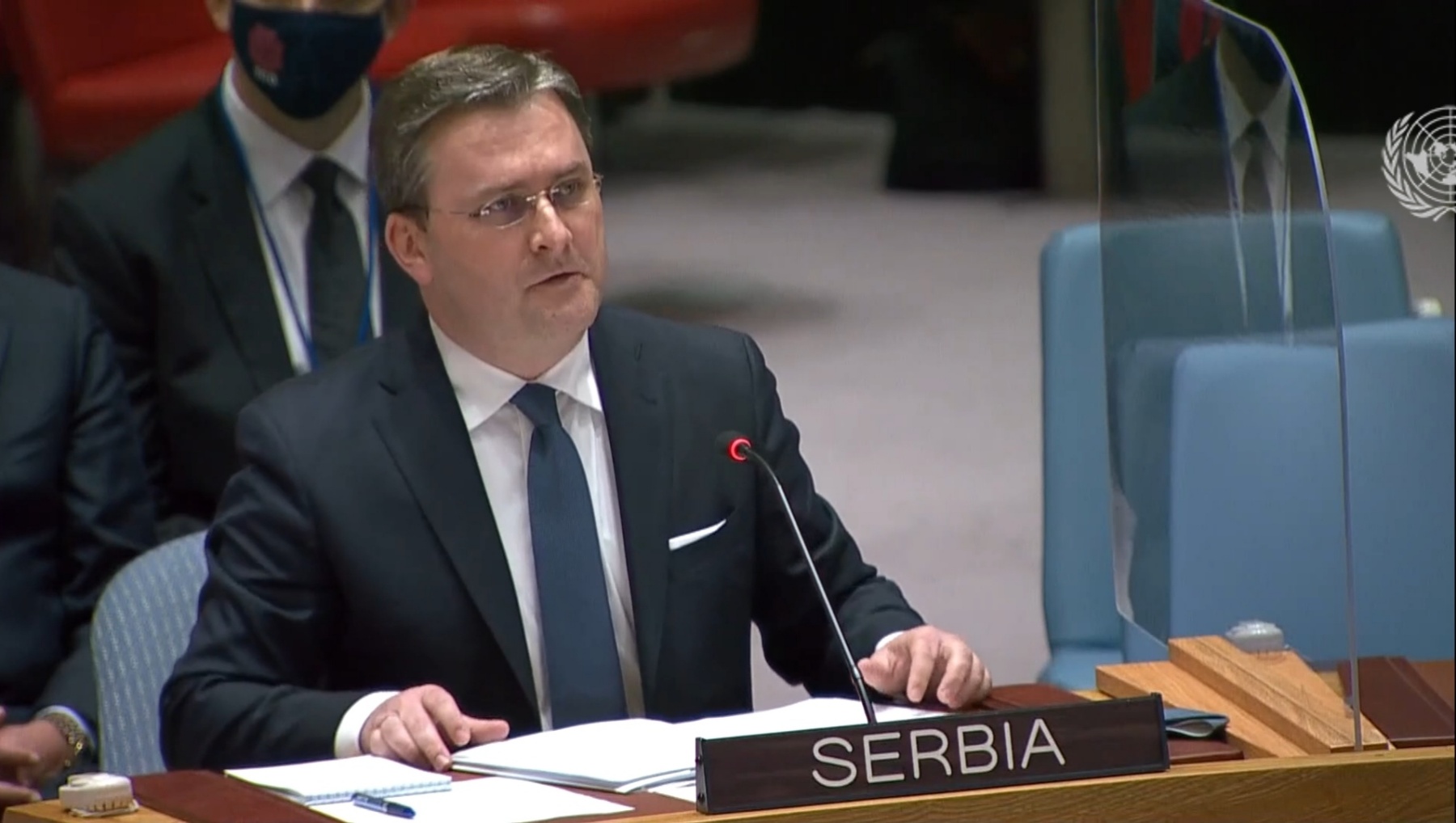
15th October 2021
|
|
|
| President Vučić visits the Republic of Slovenia |
|
The President of the Republic of Serbia, Aleksandar Vučić, participated in the Summit of the Leaders of the European Union and the Western Balkans, at which a Declaration was adopted in which EU leaders give unequivocal support to the European perspective of the Western Balkans and reaffirm their commitment to the enlargement process based on "credible partner reforms", emphasizing the importance of "strengthening the integration and the capacity of absorbing new members" by the EU itself.
After the EU-Western Balkans Summit, President Vučić stated that there is a perspective of EU enlargement, but that not all member states have the "same appetite" for enlargement.
"On behalf of the Republic of Serbia, I am satisfied with the fact that the presidents and prime ministers of the EU countries talked to us for four hours about the future of the Western Balkans. On behalf of Serbia, I thanked for the help and support, investments and money that EU taxpayers invest in our country. We talked about the fact that there is a prospect of enlargement and it is clear that there are strategic interests of the EU in that European area", said President Vučić and added that there was a positive atmosphere at the Summit and that the host, the Prime Minister of the Republic of Slovenia, Janez Janša, has always fought for a clearer European perspective of the countries of the Western Balkans.
"It seems to me that we have presented ourselves in a good way with a responsible and serious policy, and I believe that in the coming period, we can improve our position in the EU", said President Vučić, adding that he had many bilateral talks: with Greek Prime Minister Kyriakos Mitsotakis, who said Athens would continue to support Serbia's territorial integrity, with the French president, the Hungarian prime minister, the Spanish prime minister, the Slovak prime minister, the Romanian president, the president of the European Council, Charles Michel, and with many other European leaders.
President Vučić stated that he also talked with the prime minister of the Republic of Croatia about the relations between our two countries, as well as with the prime ministers of the Republic of Albania and the Republic of Northern Macedonia, Edi Rama and Zoran Zaev.
President Vučić paid a two-day visit to the Republic of Slovenia, where he attended the Summit of Heads of State and Government of the European People's Party on the first day and assessed that, after the loss of the German Christian Democratic Union in the elections, the strength of the European People's Party was concentrated in Central and Eastern Europe.
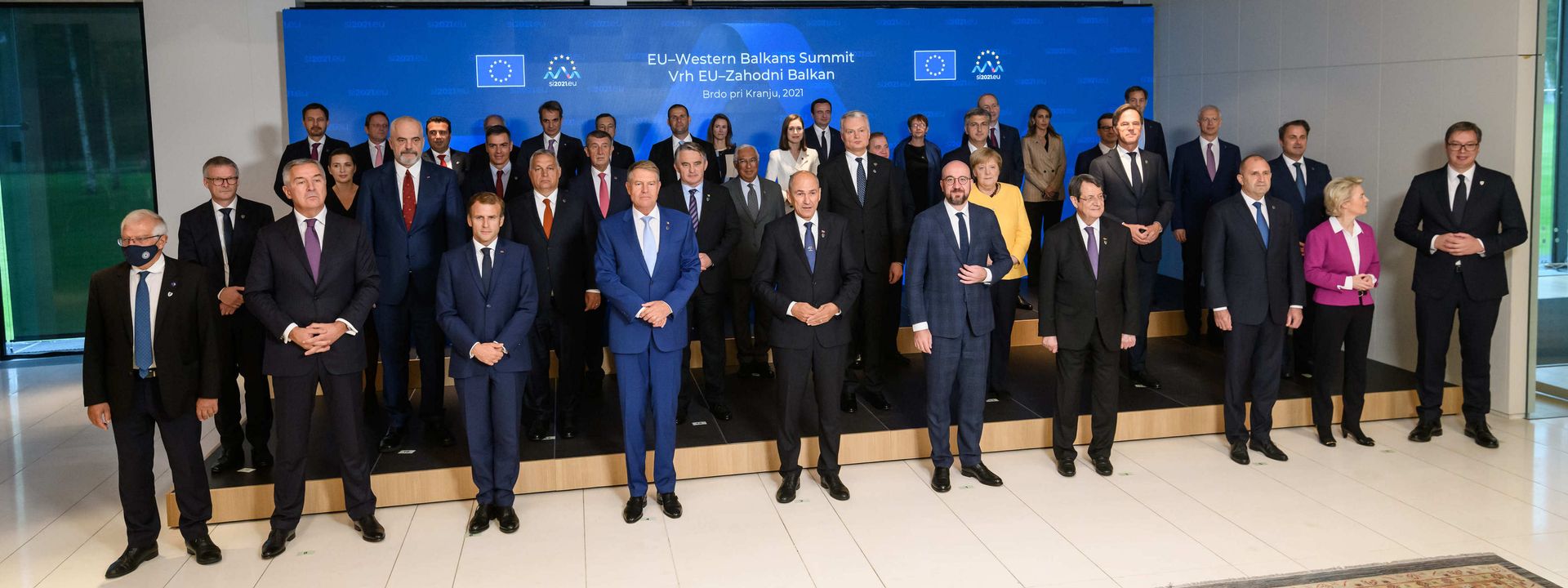
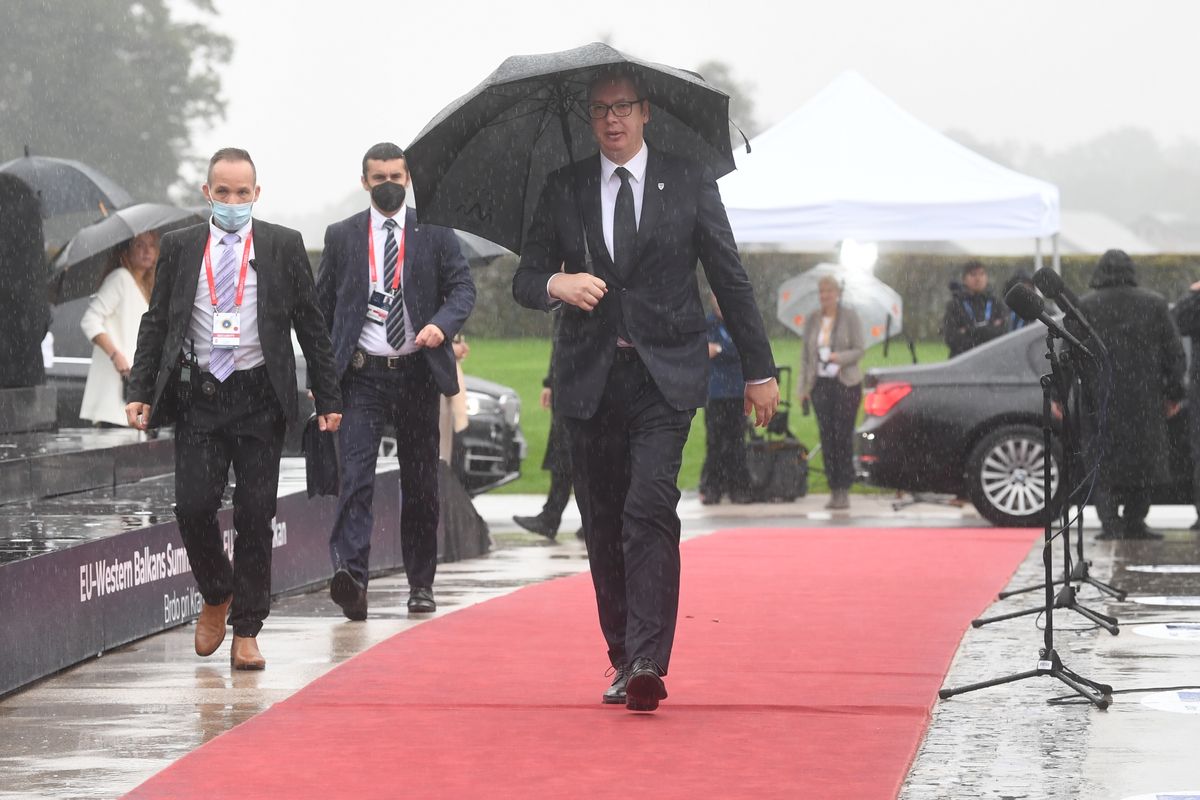
Source: www.predsednik.rs
Photo: Dimitrije Goll
6 October 2021
|
|
|
| Art Embassy of Serbia opened in Slovenia |
|
The Art Embassy of Serbia, a kind of a tourist and business center of our country in Slovenia, was opened tonight in Gorizia Hills in Slovenia, and the opening was also attended by the President of Serbia, Aleksandar Vučić.
The art embassy was opened in the villa of one of the most famous Slovenian winemakers, Marjan Simčič, and represents one of the best preserved and most representative Renaissance buildings in Slovenia, and Simčič himself was proclaimed the artistic ambassador of Serbia to Slovenia.
President Vučić said that he was happy to attend the opening of the art embassy, which thus joins the embassies in another 16 other countries, which were created based on the idea of connecting artistic diplomacy and wine.
"It is not easy to find a higher level and degree of artistic freedom and expression than making good wine. I am even happier that the embassy is located in the winery of the extraordinary winemaker Marjan Simčič. His decision to open his winery to Serbian art speaks of the respect he and the Gorizia Hills have for Serbia, but also the respect of Serbia for Gorizia Hills and Slovenia", said Vučić.
The President expressed his belief that Serbian artists will use the embassy to present themselves to Slovenia, that we will visit each other, learn from each other, respect and love each other.
"The idea that every winery in the Gorizia Hills should be home to one art embassy has to this day given us a real wine-artistic diplomatic corps", the President of Serbia noted.
He added that Serbia is very satisfied with the good bilateral relations with Slovenia, especially in the economic field, and that Slovenia is one of the most important trade partners of our country.
"I am convinced that economic cooperation can be even better and greater, and this is one of the ways to unite our souls and friendships, and show how much we care for you, and you for us. I understood every word in Slovenian tonight, probably because I often come to Slovenia, and I spend a lot of time in your country and in the Gorizia Hills. Serbia is another home for you, just as we perceive Gorizia Hills as our second home", Vučić said.
The art embassy of Serbia was opened within the project initiated by the organization Art Circle, and it is the 17th in a row that was opened in the wineries of Gorizia Hills.
It is planned that from 10 to 17 October, artists from Serbia will paint the space of the villa in the colors and symbols of our country.
The opening of the Art Embassy in Gorizia Hills was also attended by the Minister for European Integration, Jadranka Joksimović, and the Ambassador of Serbia to Slovenia, Zorana Vlatković.
In the artistic part of the program, tenor Dejan Maksimilijan Vrbančić and actress Milena Župančič performed, who read excerpts from the works of Ivo Andrić and Miloš Crnjanski, in which they wrote about wine.
At the opening ceremony, Simčič said that he was honored to be the artistic ambassador of Serbia and said that he and his family would do their best to connect artists from Serbia and Slovenia through wine.
"We want them to create in our beautiful Gorizia Hills, to bring back beautiful memories from here and to strengthen the ties between our two countries through creativity", Simčič said.
The artistic director of the project, Klenem Brun, congratulated on the opening of the Art Embassy of Serbia in Slovenia and said that artists from Serbia and other places are welcome to create in Gorizia Hills.
At the end of the ceremony, President Vučić and Simčič symbolically unveiled the board of the Art Embassy.
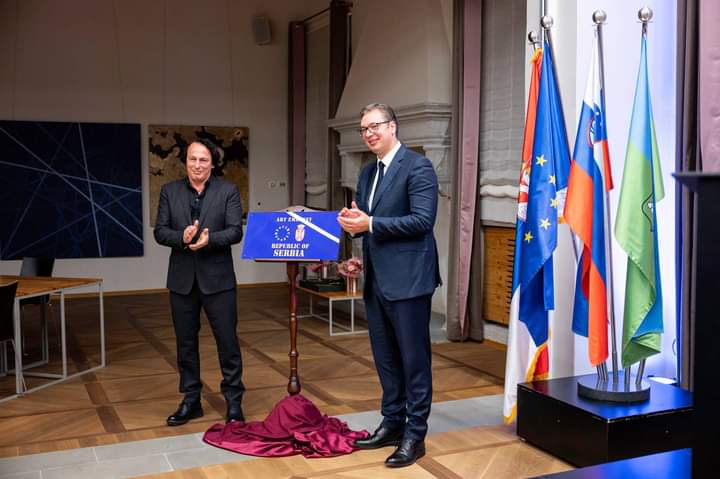
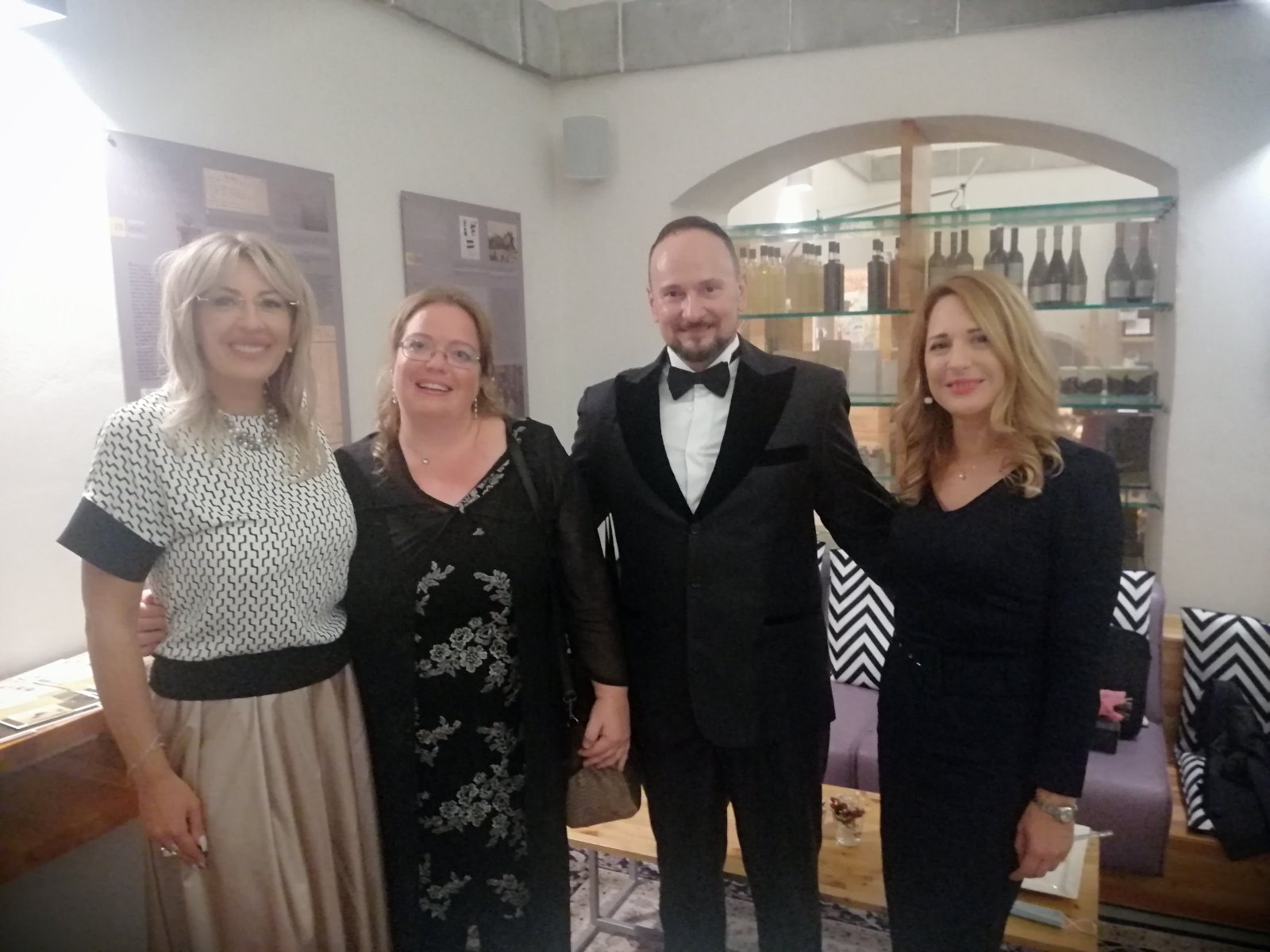
Source: Tanjug
5 October 2021 |
|
|
| Selaković in New York with 28 foreign ministers on economic successes of Serbia and K&M situation |
|
The Minister of Foreign Affairs of Serbia, Nikola Selaković, has stated that in New York he introduced foreign ministers of 28 countries to economic success of Serbia but also to the situation in Kosovo and Metohija, which he also discussed with the Russian Minister of Foreign Affairs, Sergey Lavrov, who told him that we could count on the support of the Russian Federation, with regards to Serbian interests in K&M.
Summarizing results of his visit to New York within the session of the UN General Assembly, Minister Selaković says that one of the last meetings was with Minister Lavrov, which was their third meeting in the previous nine months.
The Serbian Foreign Minister says that he surely used this opportunity, too, to introduce Minister Lavrov to the latest events in northern Kosovo and Metohija, the situation of the dialog between Belgrade and Priština and very clear and unambiguous attitude of President Aleksandar Vučić regarding the continuation of the dialog and subsequent events in K&M.
“We discussed the principled support of the Russian Federation, which is constantly present not just in Moscow, Belgrade, in the field, but also here in the East River, by the delegation of the Russian Federation as the permanent member of the UN Security Council. Of course, we will continue to maintain this type of dialog. What Minister Lavrov said was that we could count on the support of the Russian Federation in future with regards to our interests in K&M”, highlighted Minister Selaković.
He said that he had had the opportunity in New York to hold 33 meetings, of which 28 with ministers of foreign affairs, whom he had introduced also to topicalities related to the latest events in Kosovo and Metohija, but also to our principled position regarding the observance of the international public law, territorial integrity and sovereignty.
Minister Selaković said that his colleagues at the meetings had praised the substantial and fantastic success of Serbia in the consolidation of the economic sphere and transformation of what had been on the edge of collapse and economic disaster seven years before to the fastest growing economy in Europe, which Serbia was in the past two years.
He said that most of his interlocutors had supported our reforms and expressed great respect toward what President Aleksandar Vučić and Serbia had done in the previous period.
Many of them, says the Serbian Foreign Minister, showed great interest in the manner in which Serbia organized the figth against Covid 19.
“It was a great pleasure and pride to represent the Republic of Serbia in all these meetings. Many of my colleagues confirmed their arrival to Belgrade to the Conference on 11th and 12th October, which is dedicated to the 60th anniversary of the foundation of the Non-Allied Movement”, said Minister Selaković.
He emphasized that it was not just the evidence of how much they had cared to come to Belgrade to the conference, but also to see and witness the Serbia which after several decades of attempts to fight different challenges rose to its feed, was economically consolidated and turned towards its traditional friends.
“That is a great deal and our country will surely during October be one of the spots on Earth of greatest importance for multilateralism, for cooperation among the countries which share the same values, the values entered into the UN Charter and which are based on the promotion and fight for peace, equality, observance of the international public law and rights of every country to pursue its path to happiness and better and more ordered society in compliance with the wishes of its population”, said Minister Selaković.
He said that the Minister of Foreign Affairs of Azerbaijan, Jeyhun Bayramov, would come to Belgrade to the conference on the occasion of the Non-Allied Movement adding that we had strategic cooperation with Azerbaijan and frequent contacts.
“We agreed to realize as soon as possible after the Belgrade conference his bilateral visit to Serbia”, added Minister Selaković.
He said that it had been agreed to intensify the cooperation and finalize the agreements which should be signed and after that realized when the meeting of Serbian President Aleksandar Vučić and Azerbaijan President Ilham Aliyev took place.
Minister Selaković says that the Ministry of Foreign Affairs had recently received its sector for economic diplomacy and there were great expectations from it and one of the tasks was to deepen the cooperation with Azerbaijan.
25 September 2021
|
|
|
| Telephone conversation of President Vučić and General Secretary of NATO |
|
The President of the Republic of Serbia, Aleksandar Vučić, has discussed today by phone with the General Secretary of NATO, Jens Stoltenberg about, as the General Secretary said, worrisome situation in northern Kosovo and Metohija.
President Vučić said that Serbia had not violated either Brussels Agreement or Resolution 1244 by anything, by any single move or in any manner jeopardized peace preservation.
“The complete occupation by armored vehicles of northern Kosovo and Metohija has lasted for seven days and it is conducted by Priština and everyone in the international community “are thunderously silent”, said Serbian President. “However, everyone is worried all of a sudden when they spot Serbian helicopters and airplanes at the territory of central Serbia, because apparently they should not exist, or should not take off until they receive the approval from Kurti or someone from the international community”, says President Vučić.
Serbia observes all international agreements it signed, Serbia will always conduct responsibly and seriously, but Serbia is still asking when the formation of SMC will start and when Kurti’s armored units will be withdrawn from northern Kosovo and Metohija.
Finally, with the gratitude to General Secretary Stoltenberg for the fair relation and wish to listen to the Serbian side, President Vučić asked about the norm and international regulation violated by Serbia? Today, yesterday or any time?
The two interlocutors agreed to stay in constant touch due to necessity of the preservation of peace and stability in the entire region.
Source/Photo: www.predsednik.rs
26 September 2021
|
|
|
| Prime Minister Brnabic at Global COVID-19 summit organised by White House |
|
Prime Minister Ana Brnabic participated today at the Global COVID-19 summit, organised by the White House, which was opened by US President Joseph Biden.
The video messages are attended by a large number of world leaders and officials of international organizations, including UN Secretary General Antonio Guterres, European Commission President Ursula von der Leyen, British and Canadian Prime Ministers, Boris Johnson and Justin Trudeau, German Chancellor Angela Merkel and many others.
In the message, the Prime Minister pointed out that Serbia was among the first European countries to procure a covid vaccine, and that she was the first European Prime Minister to receive the vaccine.
Thanks to years of investment in digitalisation and development of eGovernment, we have managed to organise a complicated and complex vaccination process very efficiently and in a way that it is focused on citizens, she explained.
However, as she added, from the very beginning we were aware that this is not just a matter of our citizens and only our struggle. In the fight against the COVID-19 pandemic, we are all safe or no one is safe.
That is why, in addition to procuring vaccines for our citizens, we donated vaccines to the citizens of the Western Balkans, but also to other countries, she reminded and specified that Serbia donated 230,000 doses of vaccines to the region, we vaccinated foreign citizens in Serbia with approximately 300,000 doses and set aside we have 570,000 doses of vaccines for countries in Africa and Asia.
Brnabic mentioned that Serbia has already started the production of covid vaccine from one manufacturer, and that it will start production from another by the end of the year, because in that way we want to help and support all people and countries that need vaccines.
This is a pandemic in which we will either win together or lose together, but we must fight together, the Prime Minister repeated.
That is why Serbia supports the goals of this global summit, she emphasised, and expressed her gratitude to the United States of America and President Biden for organising the summit and supporting joint efforts in the fight against the COVID-19 pandemic.
Vaccines are the only way out in the fight against the pandemic, concluded Brnabic.
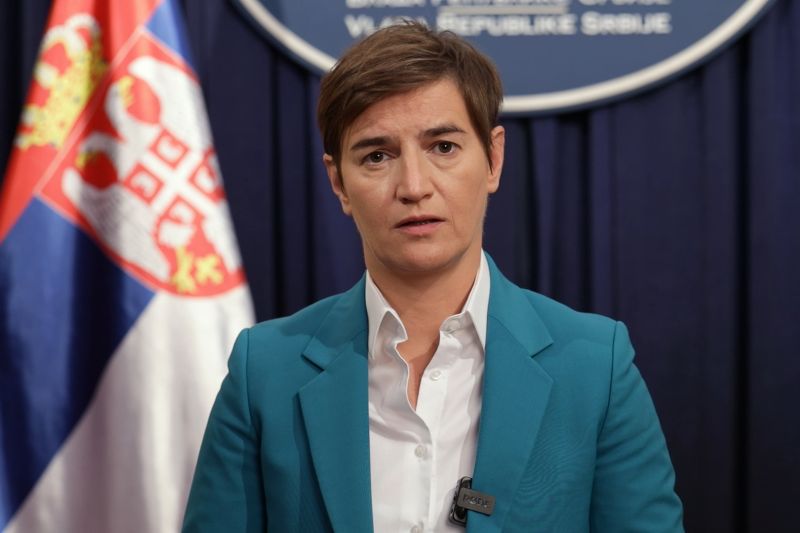
22 September 2021
|
|
|
| Marking the Remembrance Day of all Serbs who died and were expelled in the armed operation "Storm" |
|
The President of the Republic of Serbia, Aleksandar Vučić, attended the marking of Remembrance Day of all the victims and expelled Serbs in the armed operation "Storm" and said that Serbia remembers!
"Today, when we remind ourselves again of what happened in August 1995, the terrible pogrom, the expulsion of more than 250,000 Serbs, the exodus and ethnic cleansing, we, at the same time, and finally, remind ourselves of who we are, what we are, where we come from and where we are going. Thank you all for being here together tonight and for showing how much we love our people", said President Vučić, adding that we will not forget any of the things that the Krajina people had to go through.
"For us, these are not just terrible numbers of victims", said President Vučić and emphasized that Serbia will not forget.
"History has never been rewritten like today. That is why I want to remind us all not only of what others have done to us, not wanting us to exist, but also of what we have done to ourselves, just as if we ourselves did not want to exist", said the President, noting that we must never again allow Serbia to forget its silent heroes.
President Vučić emphasized that we must never again cover our eyes, ears, and mouths in front of something that truly was a pogrom and the downfall of all humanity.
"Pretending that this is not true, avoiding saying it, is a crime not only against the victims, but also against ourselves, every living Serb, people from Krajina, as well as Serbia and its future", said President Vučić and underlined that people can stand up straight and live with themselves and the others without hesitation, fear and doubt, only if they remember.
President Vučić pointed out that Serbia must fight for peace and cradles with children, as well as that not remembering annuls and erases us from the history and the future, depriving us of the right to tomorrow.
"Our mission is a happy future for us and for the new generations! Today's Serbia is based on a clear identity and a culture of remembrance", said President Vučić and reminded that everything that had been neglected for decades had been done, and that a strong Serbia has become the master of its own destiny.
"Eternal glory to you, Serbian martyrs who perished in the "Storm" and all other pogroms. Your children are in their Serbia, taken care of, loved and successful. Sleep peacefully, Serbian falcons, the future of your children is our vow", concluded President Vučić and thanked everyone who showed that night how much they love their country and that Serbia remembers.
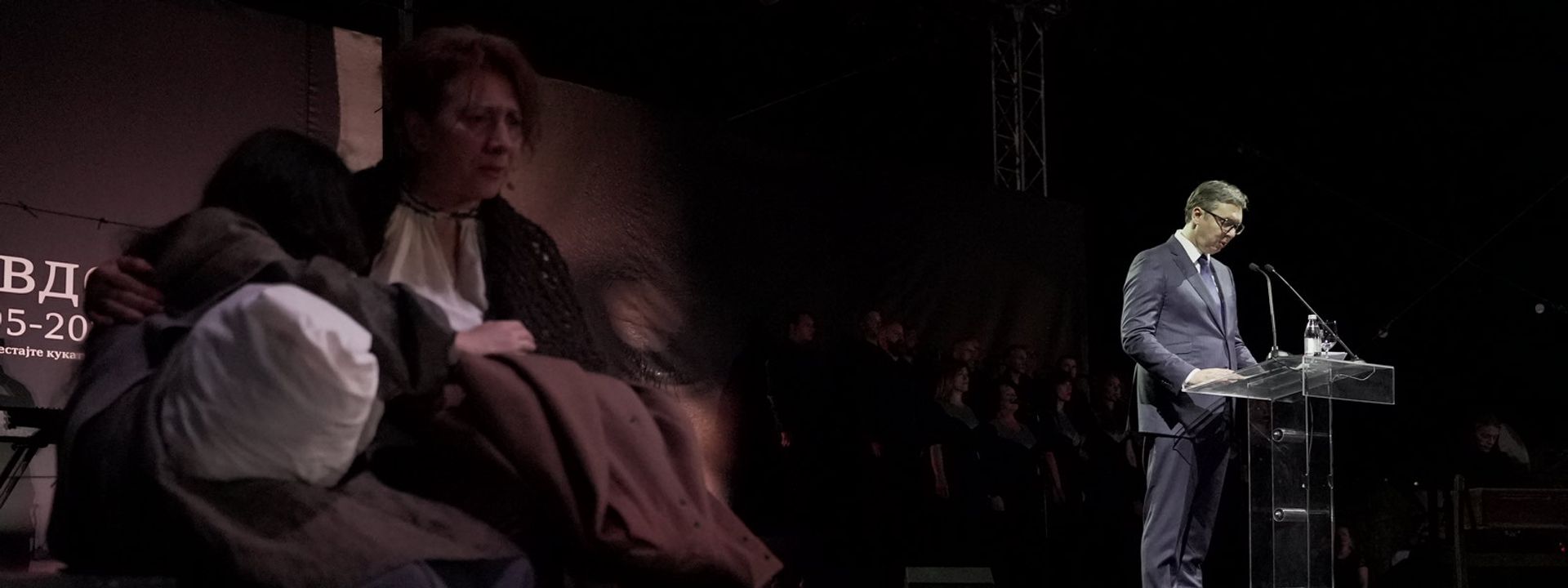
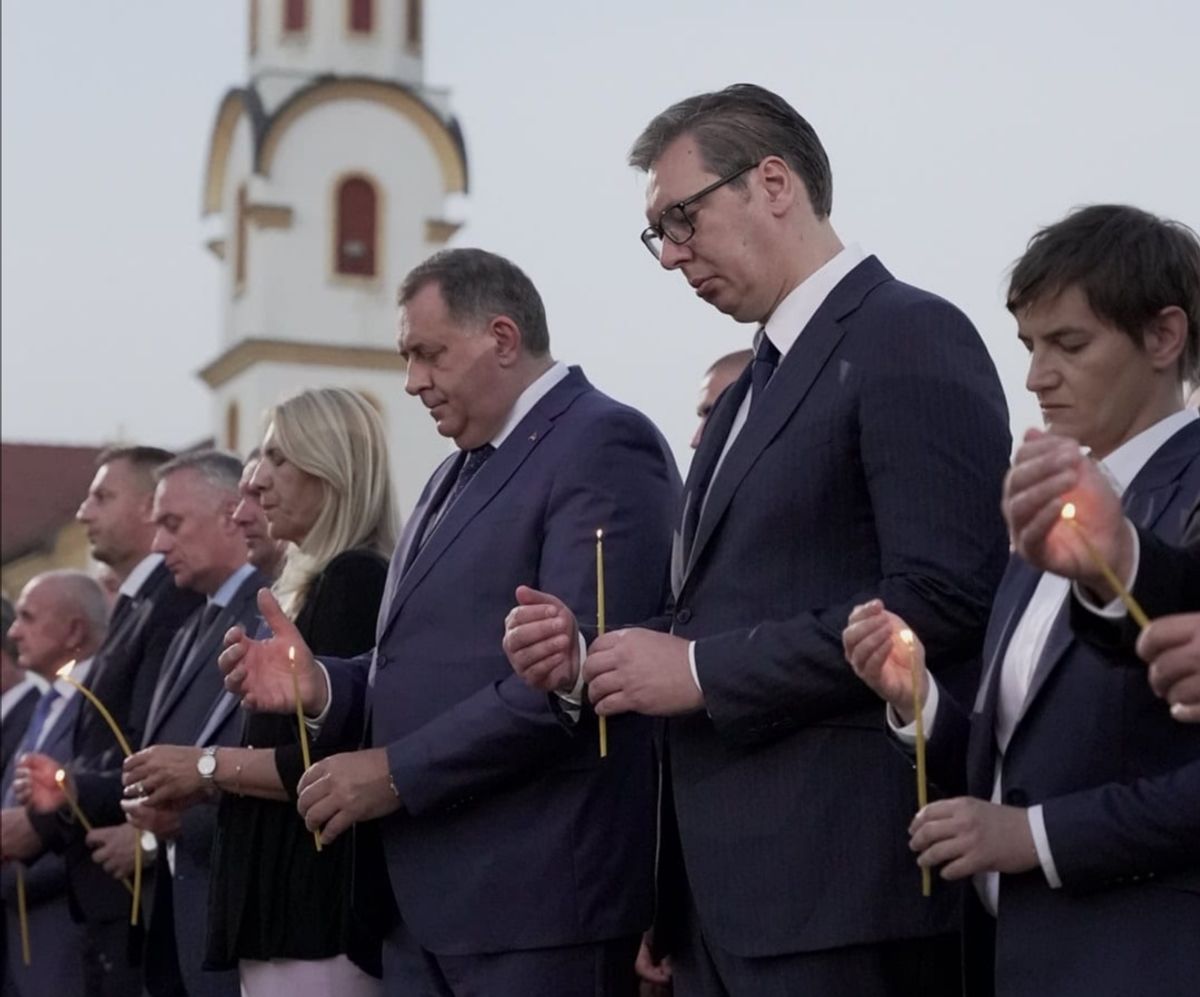
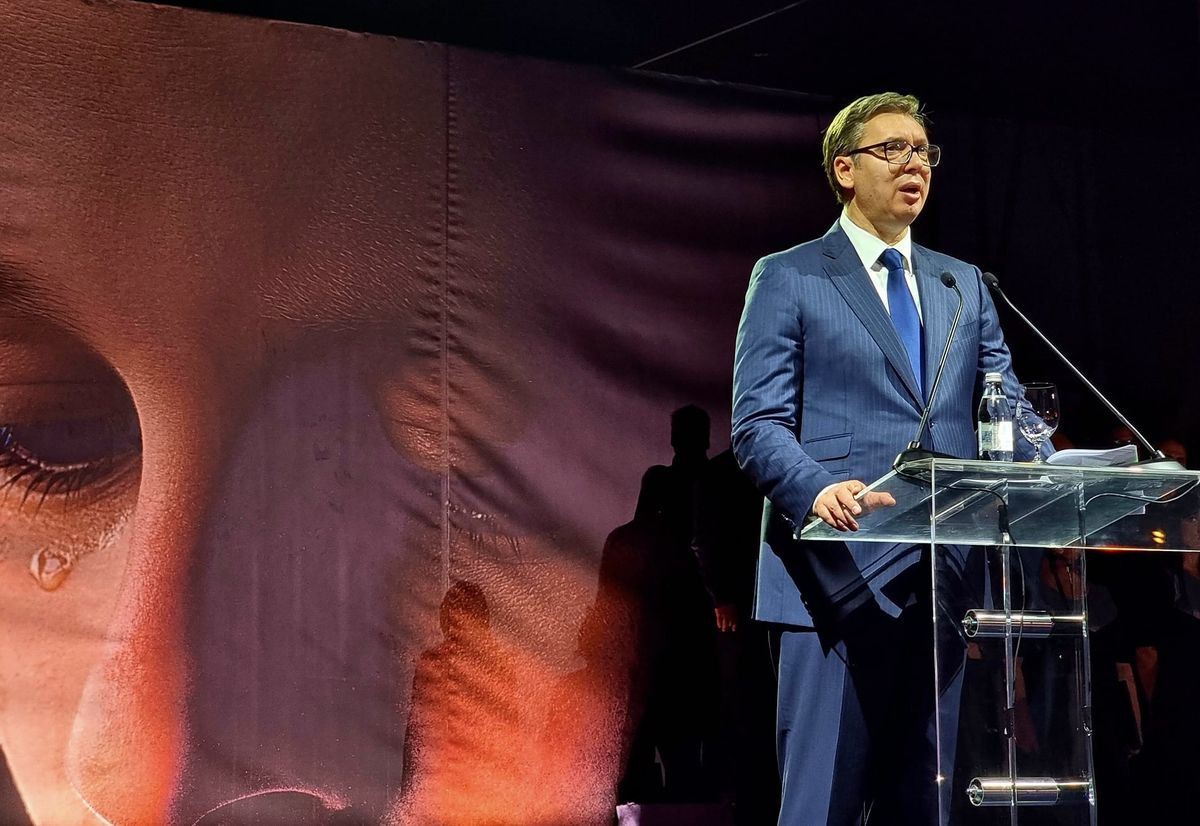
Source: www.predsednik.rs
Photo: www.predsednik.rs
5 August 2021 |
|
|
| Selaković and Kavšek: Bela Krajina is an example of centuries-old unity of Serbs and Slovenes |
|
The Minister of Foreign Affairs of Serbia, Nikola Selaković, talked with the Mayor of the Slovenian city of Črnomelj, Andrej Kavšek, who today received the Gold Medal of Merit for Cultural Activities and Development of Relations between Serbia and Slovenia from the President of Serbia, Aleksandar Vučić.
Selaković thanked Kavšek for the fact that Serbs, who have been living in Bela Krajina in Slovenia for centuries, successfully preserve their national and cultural identity, living in harmonious and close relations with their neighbors and representing an example of centuries-old unity of Serbs and Slovenes.
According to him, the municipality of Črnomelj is an example of successful coexistence of people of different but close cultures, and a place where the traditional friendship of the Serbian and Slovenian people is strengthened.
Selaković emphasized the importance of good cooperation between local self-government units of Serbia and Slovenia and reminded that cooperation has been established between twenty municipalities so far, noting that it would be useful for the municipality of Črnomelj to be twinned with some of the municipalities in Serbia.
According to Selaković, it is extremely important to encourage Serbian-Slovenian cooperation at the municipal level, in various areas, such as the economy, culture and tourism.
Selaković once again thanked the guest for his readiness to nurture the culture of remembering the presence of Serb uskoks in Bela Krajina, whose descendants have lived in that part of Slovenia since the 16th century.
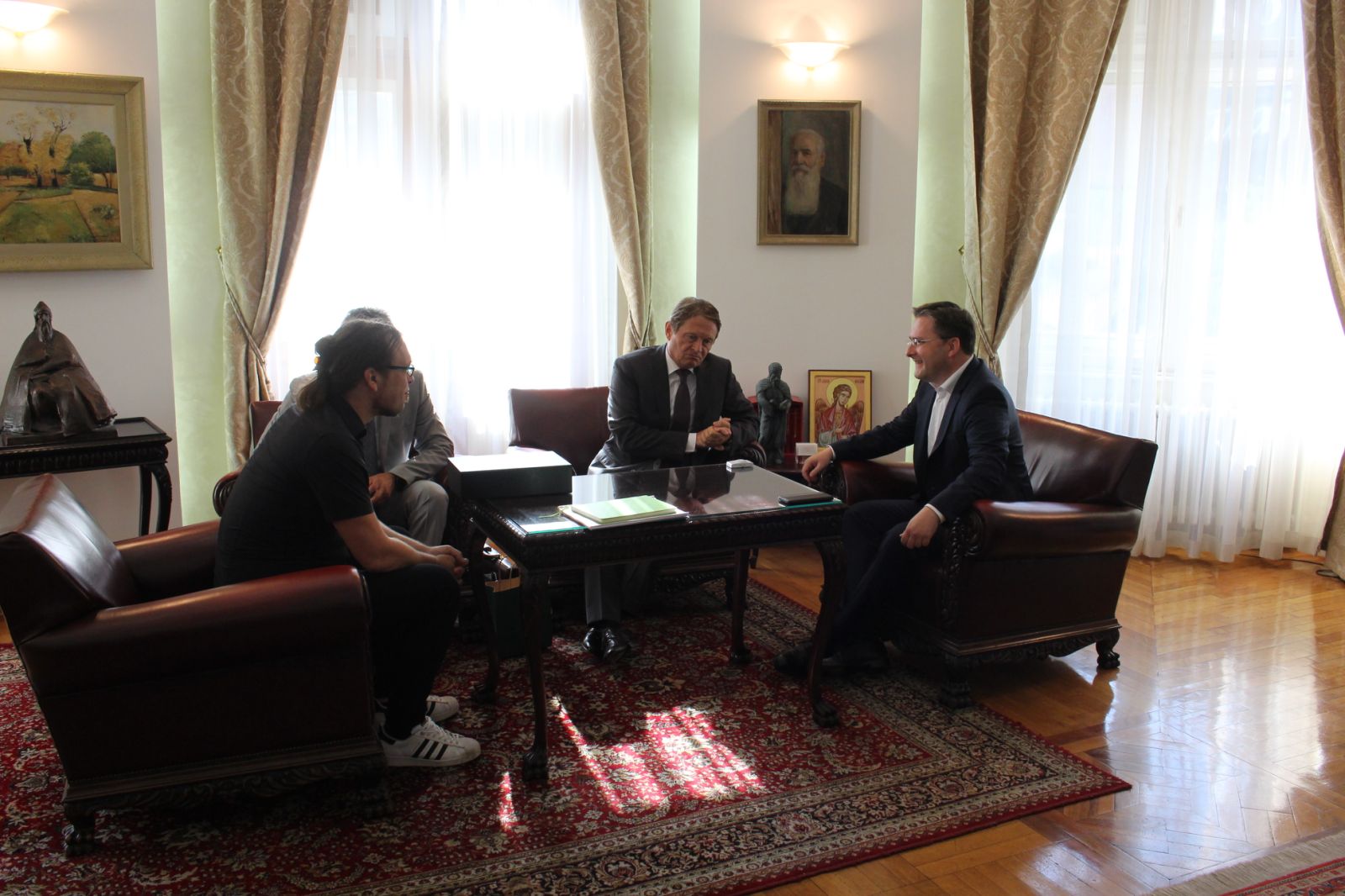
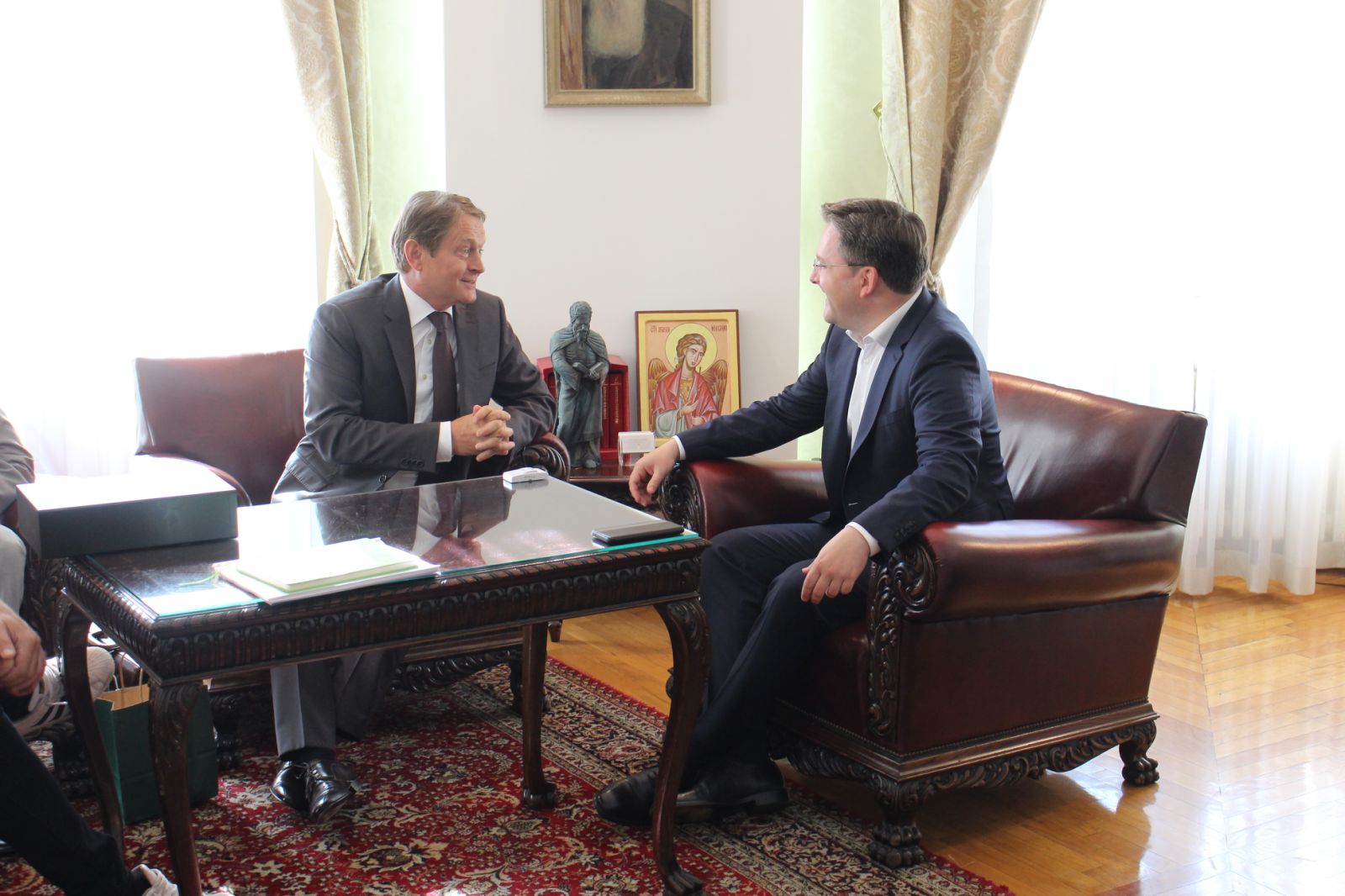
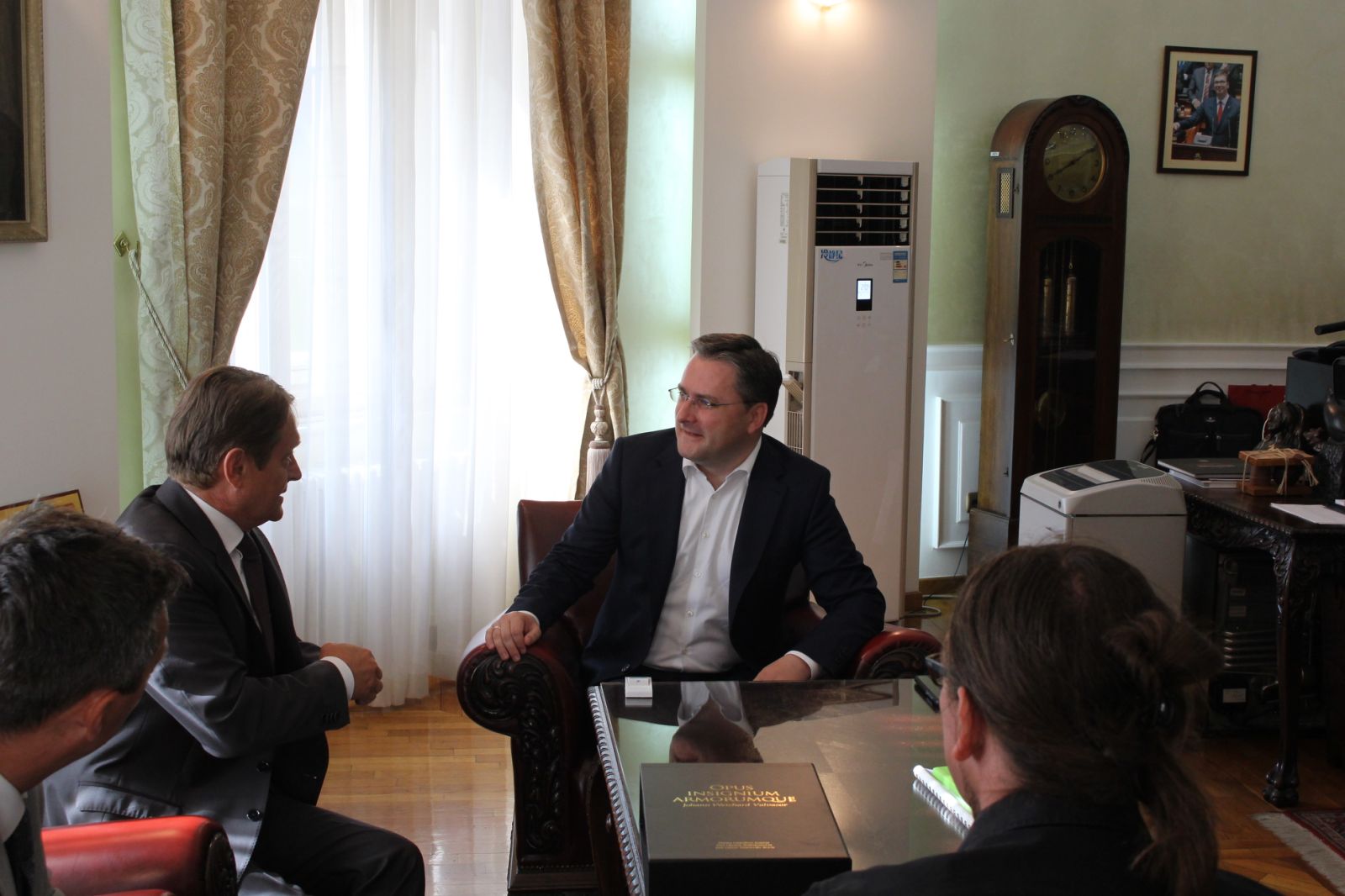
29. June 2021.
|
|
|
| Serbia strongly supports Berlin Process |
|
Prime Minister Ana Brnabic participated today in the online Summit of Leaders of the Berlin Process, which discussed the concrete results achieved during its seven-year term, plans for the next period and initiatives aimed at providing support Western Balkans on its way to the European Union.
The focus of the summit was on building a common regional market related to four fundamental freedoms: free movement of people, goods, services and capital, for which the Action Plan was adopted in November last year, and from which the region would have special benefits.
The summit said that the transport and energy infrastructure has been expanded in recent years and connected to the roads of the European Union, and praised the implementation of the agreement on the abolition of roaming fees in the Western Balkans, which began this month.
An important project of the process is the Regional Office for Youth Cooperation (RYCO) in order to connect and build understanding and tolerance in the region.
The activities of the Regional Cooperation Council (RCC) and the Secretariat of the Central European Free Trade Agreement (CEFTA) were also praised for their efforts to implement the Common Regional Market Action Plan.
Assessing that the Berlin Process is firmly based on the fundamental belief that the economy of the Western Balkans is part of Europe, German Chancellor Angela Merkel pointed out that it greatly contributes to stability and connecting the Western Balkans region, which is also in the interest of the European Union.
In her address today, Prime Minister Ana Brnabic thanked German Chancellor Angela Merkel for her strong support and active approach to regional cooperation.
Thanks to the support of Germany and Chancellor Merkel, but also to the internal initiatives of the representatives of Serbia, Albania and North Macedonia, the Prime Minister explained, the implementation of the Action Plan will enable further expansion of economic and trade cooperation in the region, which will make it more attractive for foreign investors.
Brnabic pointed out that Serbia strongly supports the Berlin Process, not only for the purpose of economic development of the region, but also as an idea of connecting and unifying the Western Balkans and its approach to the European Union.
She concluded that support in the region was particularly visible through solidarity with neighbours during the pandemic and assistance with vaccines and medical equipment.
The summit, opened by German Chancellor Angela Merkel, was attended not only by representatives of the region, but also by Slovene Prime Minister Janez Jansa, European Commission President Ursula von der Layen, Austrian Chancellor Sebastian Kurz, French President Emanuel Macron, Italian Prime Minister Mario Draghi and Polish Prime Minister Mateusz Jakub Moravjecki and Secretary General of the Regional Cooperation Council (RCC) Majlinda Bregu.
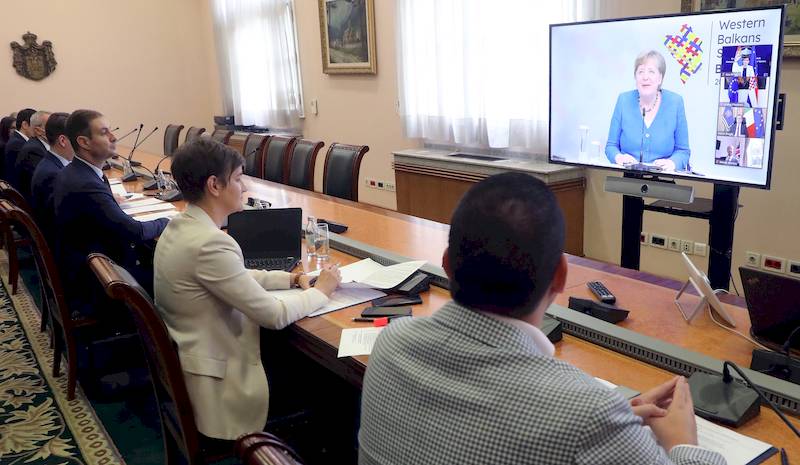
Source: www.srbija.gov.rs
Photo: www.srbija.gov.rs
5 July 2021 |
|
|
| President Vučić participates in the Mini Schengen conference |
|
President of the Republic of Serbia Aleksandar Vučić participated today via a video link in the conference "Mini Schengen" with the Prime Minister of the Republic of Albania, Edi Rama, and the Prime Minister of the Republic of North Macedonia, Zoran Zaev. The officials discussed further steps in regional cooperation, as a process vital to the progress of the Western Balkans and the European path as a whole.
The interlocutors agreed that the countries of the Western Balkans need membership in the European Union, but also that the European Union needs the Western Balkans just as much since the region is surrounded by EU borders and the countries aspiring to membership share common European values.
The President of Serbia and the Prime Ministers of Albania and North Macedonia have expressed the wish that the four European freedoms - the movement of people, goods, services and capital, begin to be implemented as soon as possible throughout the region, and that in this context they will provide full support to the regional common market at the Berlin Process Summit to be held on the 5th July.
"We are aware that only by working together and accepting regional cooperation within various regional initiatives such as the common market, regional Schengen, green corridors or the Berlin Process, can we bring our economies closer, increase the well-being of our people and bring in large investments that would otherwise not be possible for any of us individually", is one of the joint conclusions of this video conference.
The interlocutors agreed to meet in Skopje on July 29th to review the progress in the implementation of existing initiatives and projects and to sign additional agreements between the three countries related to the implementation of the Berlin Process commitments, as well as cooperation and assistance in the event of natural disasters and relief measures for trade, export and import.
"We call on and encourage our colleagues from the region to sign and implement similar agreements, so that the vision of a common political and economic space across the Western Balkans would soon, through the single market, become an important part of our citizens' daily lives," said the Serbian President and Prime Ministers of Albania and North Macedonia.
The interlocutors pointed out that despite the delays in the enlargement process, they will continue to try to identify new ways, policy areas and financial instruments for all three countries to increase their contribution to Europe, strengthen ties with the European Union and gradually integrate the region into the single European market.
Speaking on the Green Agenda, the interlocutors issued a joint call to the European Union and the United States to join countries across the region to support the development of projects that could be invested as soon as possible to improve environmental protection and increase the widespread use of renewables as part of the EU Economic and Investment Plan implementation and the Green Agenda for the Western Balkans.
"Our countries have a huge potential for sustainable growth and development of this sector. We will ask for practical support to find out which projects can improve our region in terms of renewable energy sources for our citizens and for the green energy future of the EU ", said the interlocutors during the "Mini Schengen" video conference and concluded that only regional connecting, with the EU support, can contribute to the overall stability and progress of the entire region and Europe.
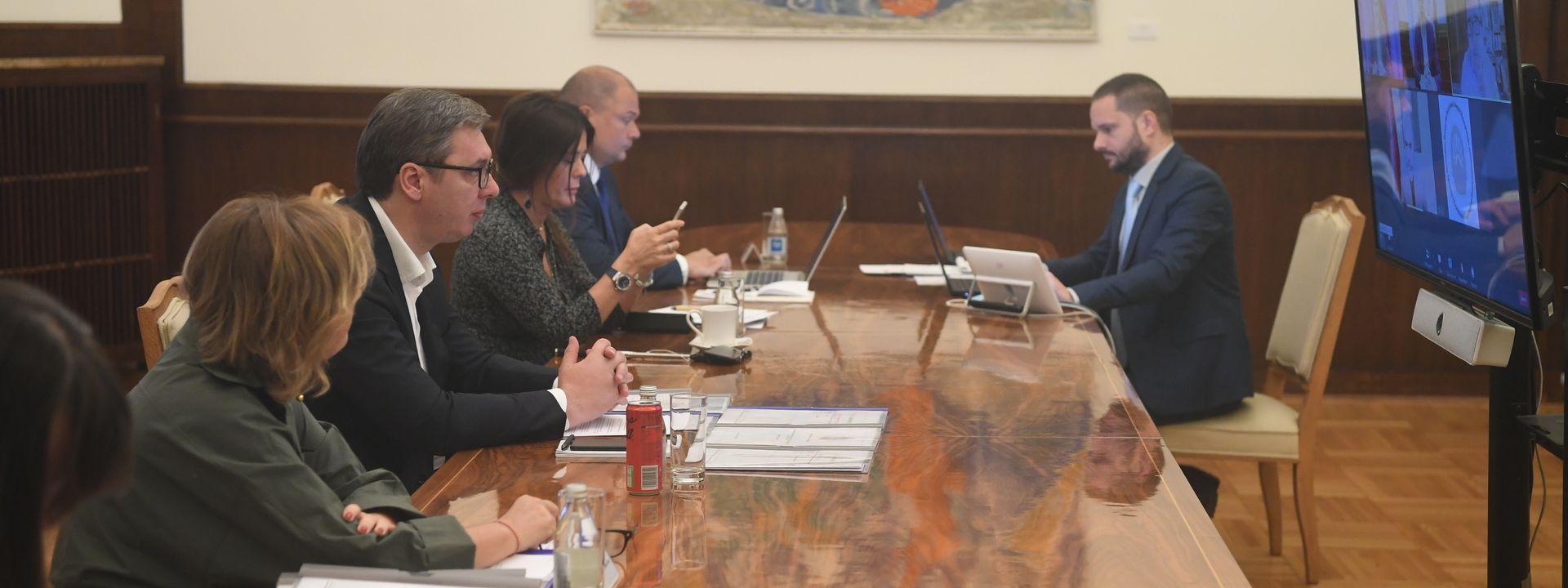
Source: www.predsednik.rs
Photo: www.predsednik.rs
29th June 2021
|
|
|
| Selakovic: Cooperation and good-neighbourly relations are in the general interest of the entire region |
|
Minister of Foreign Affairs of Serbia Nikola Selakovic took part today in Antalya in the Meeting of Ministers of Foreign Affairs of the South-East European Cooperation Process participants.
Selakovic underlined that the key foreign policy and strategic goal of our country was to achieve full membership of the European Union.
“I hope that the European Union will continue to support the process of integration of SEECP participants into the EU, which will, I am confident, bring lasting stability and prosperity to the region and help the consolidation and development of Europe as a whole”, Selakovic said.
The Minister pointed out that peace and stability had no alternative, representing the guiding star on the path of our region towards the European Union. Furthermore, he emphasized in particular that Belgrade was determined to resolve all open issues through dialogue and in good faith - as a responsible and predictable partner, and in line with the principles of international law.
“We need to make sure that what is agreed upon is also respected and fulfilled on the ground later on, because our agreements primarily concern the well-being of our peoples, but they also reflect who we are and what kind of future we want”, the Serbian Foreign Minister said.
Selakovic stated that Serbia devoted full attention to the promotion of regional cooperation and good-neighbourly relations, stressing that the strengthening of economic ties within the region also contributed to the relaxation of existing political relations.
“Through participation in various formats we have committed to undertake the necessary reforms and promote regional cooperation in numerous areas, and among them, as particularly important and being in the general interest of the entire region, I would like to underline the joint infrastructure projects in the transport and energy sectors”, Selakovic said.
As concrete positive results of regional cooperation, the Minister underlined the Central European Free Trade Agreement (CEFTA), the Western Balkans Fund, the Regional Youth Cooperation Office, the Southeast Europe Transport Community, the Western Balkans Chamber Investment Forum, and the signing of the "Agreement on the Price Reduction of the Roaming Services in the Western Balkan region".
Selakovic commended in particular the establishment of “Green Lanes” in our region during the coronavirus pandemic, while pointing out that it was now necessary to enable their extension to border crossings with neighbouring EU member states.
The Minister also stated that Serbia welcomed the Common Regional Market Action Plan and added that this document was largely based on concrete proposals stemming from the initiative launched by Serbian President Aleksandar Vucic in cooperation with the Prime Ministers of Albania and North Macedonia.
In addition, Selakovic emphasized that Serbia had demonstrated its commitment to enhancing regional cooperation with its neighbours in the region - by sending vaccine shipments and enabling vaccination in Serbia,
“So far, Serbia has sent 120,000 vaccines to the region and vaccinated around 65,000 citizens from countries of the region on its territory, which means that we have provided a total of around 200,000 vaccines for our neighbours”, the Minister said.
In his statement, the Head of Serbian diplomacy also touched upon the importance of the Regional Cooperation Council which, as a pivotal regional initiative, provided concrete results and contributed to achieving economic progress and deepening cooperation, and said that he expected that the implementation of the South East Europe 2030 Strategy, once it is adopted, would benefit our region.
Selakovic congratulated Turkey on its successful chairmanship and wished Greece every success as the upcoming chair.
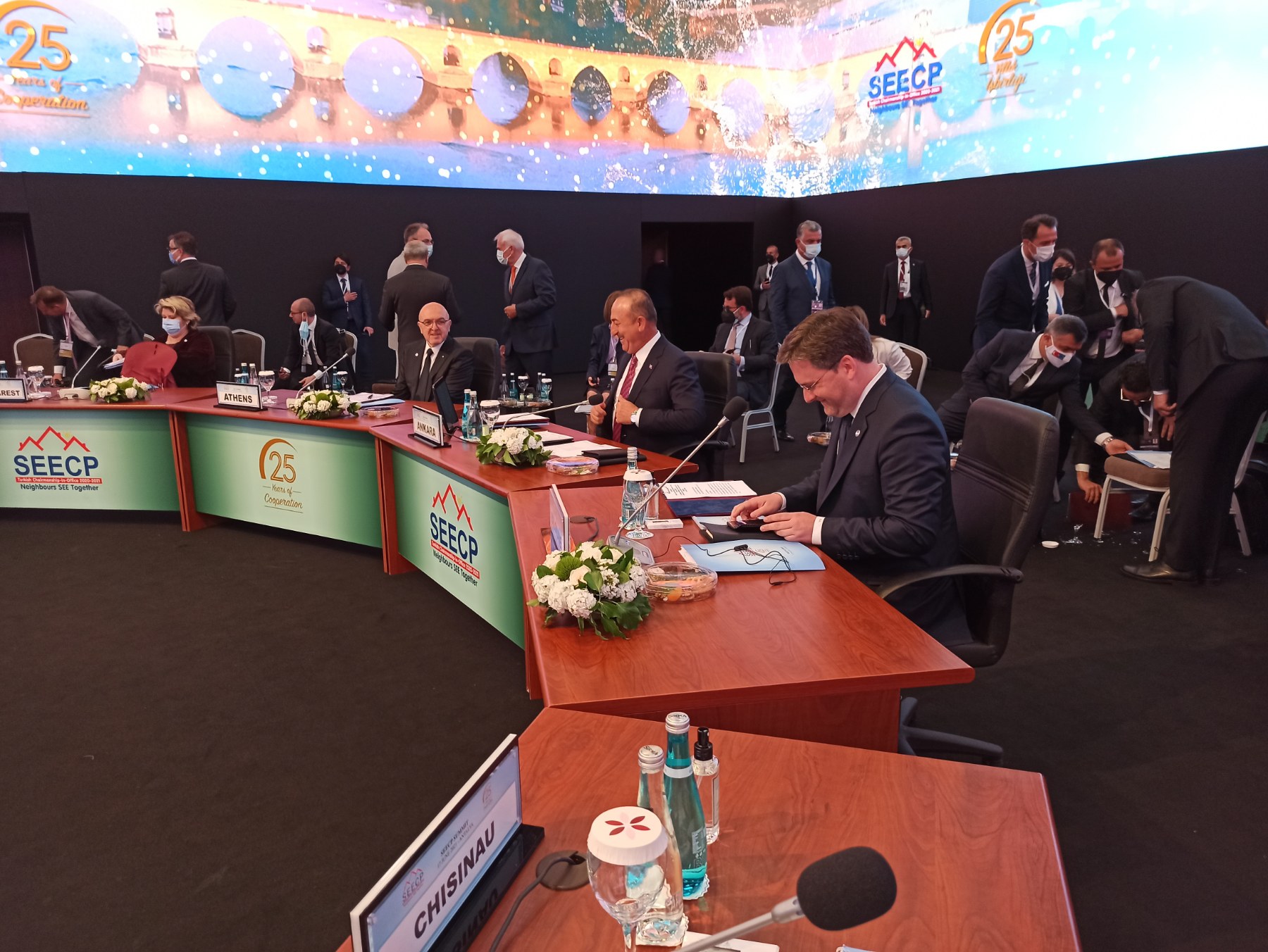
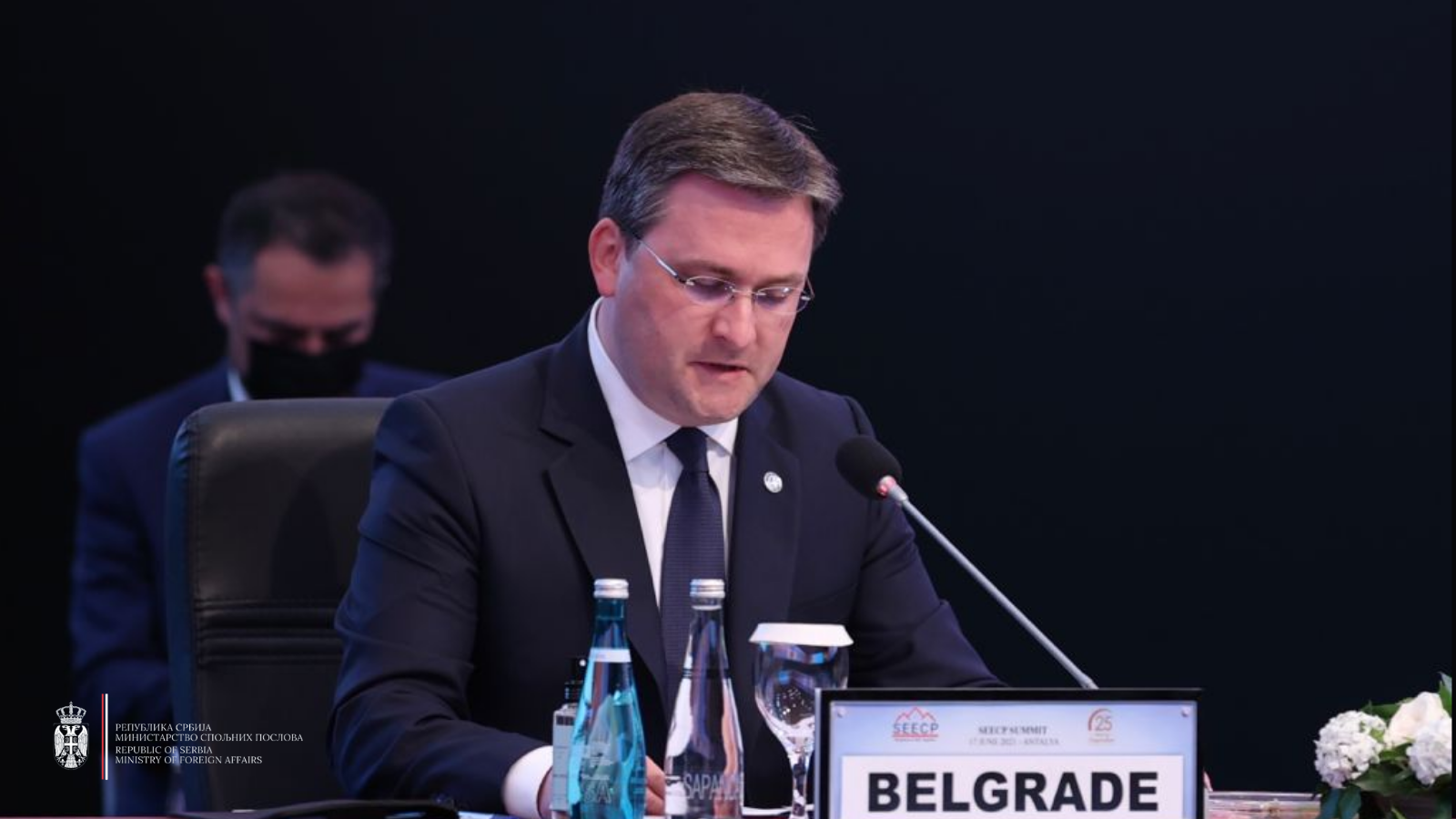
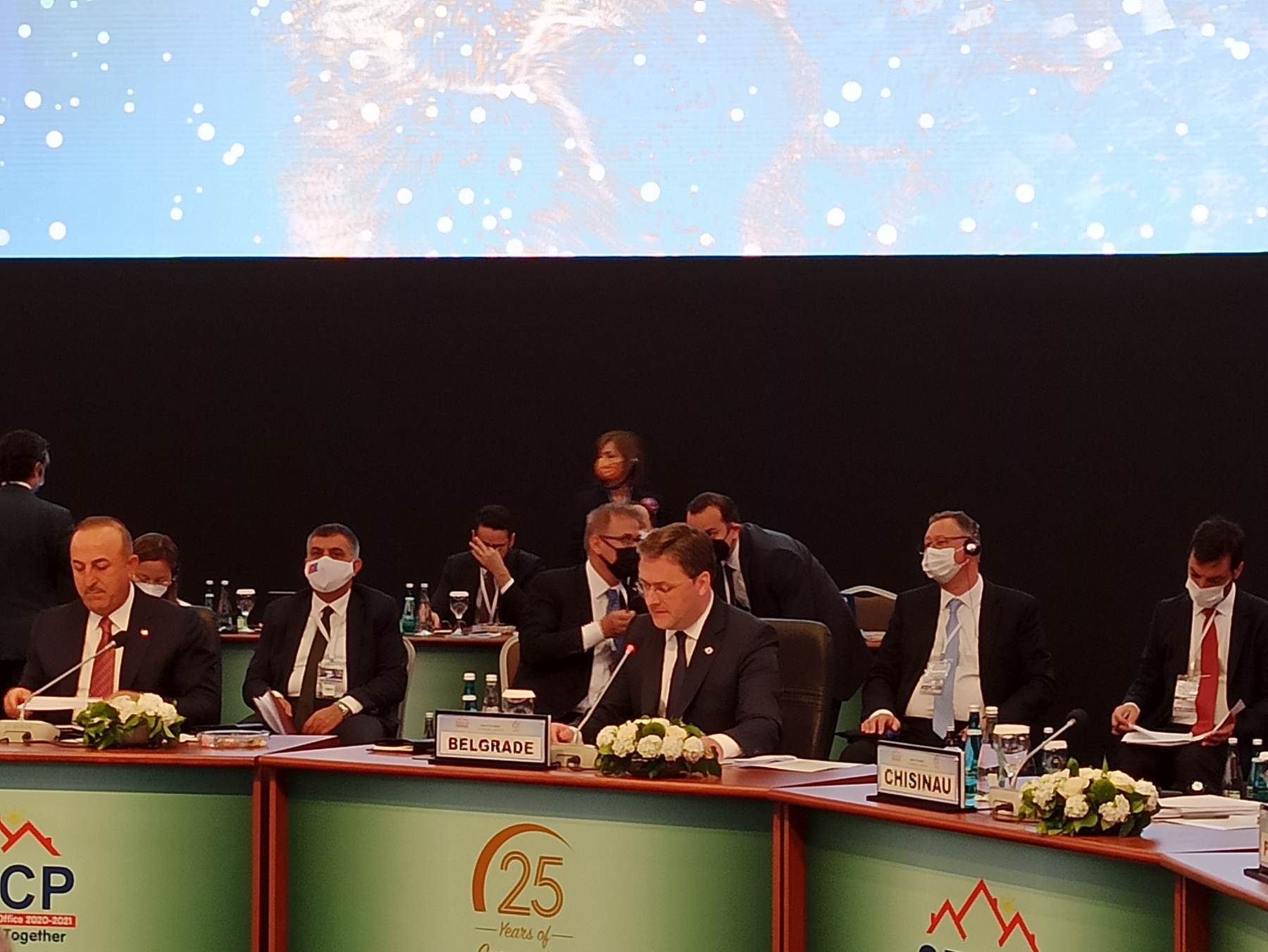
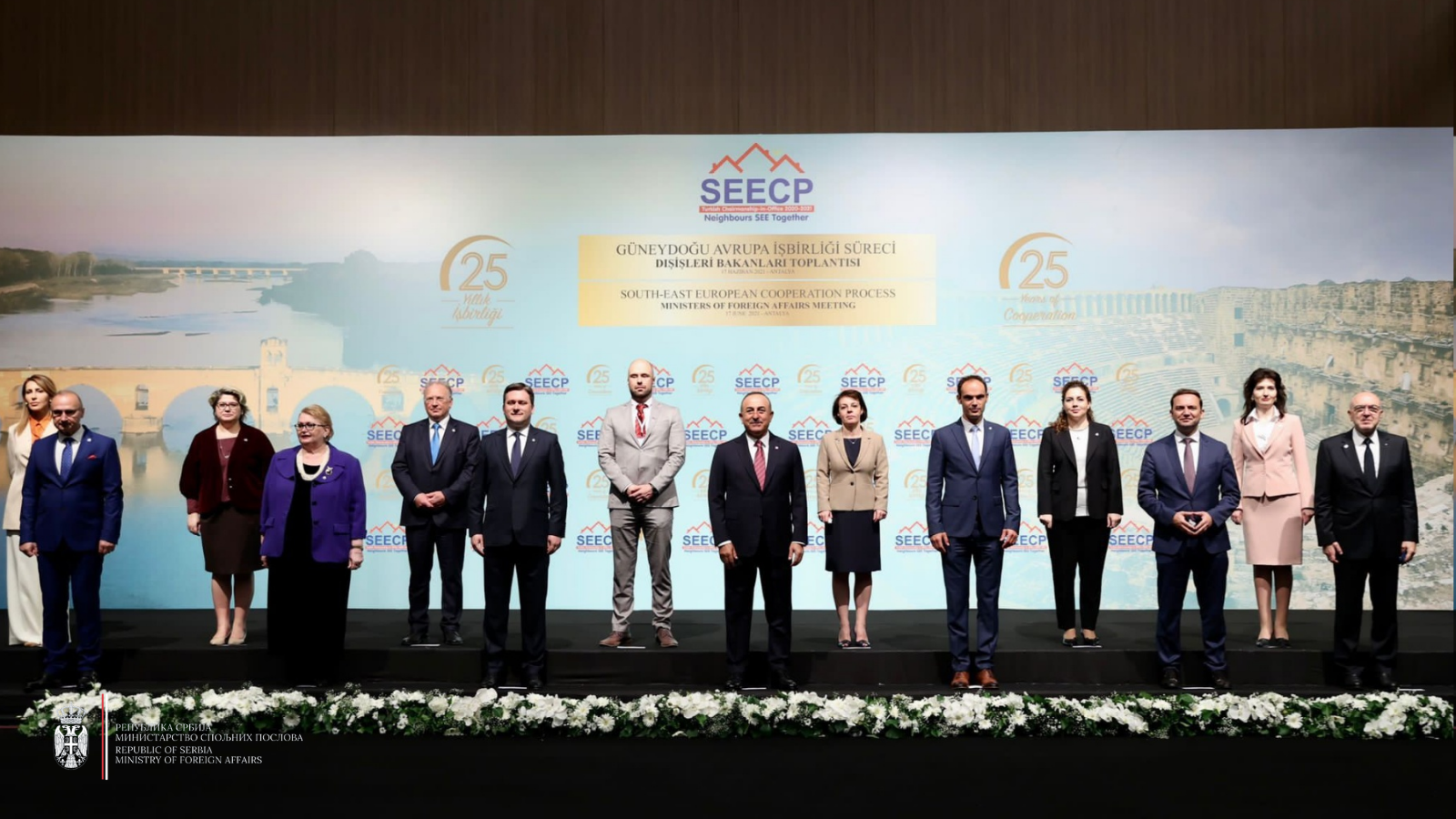
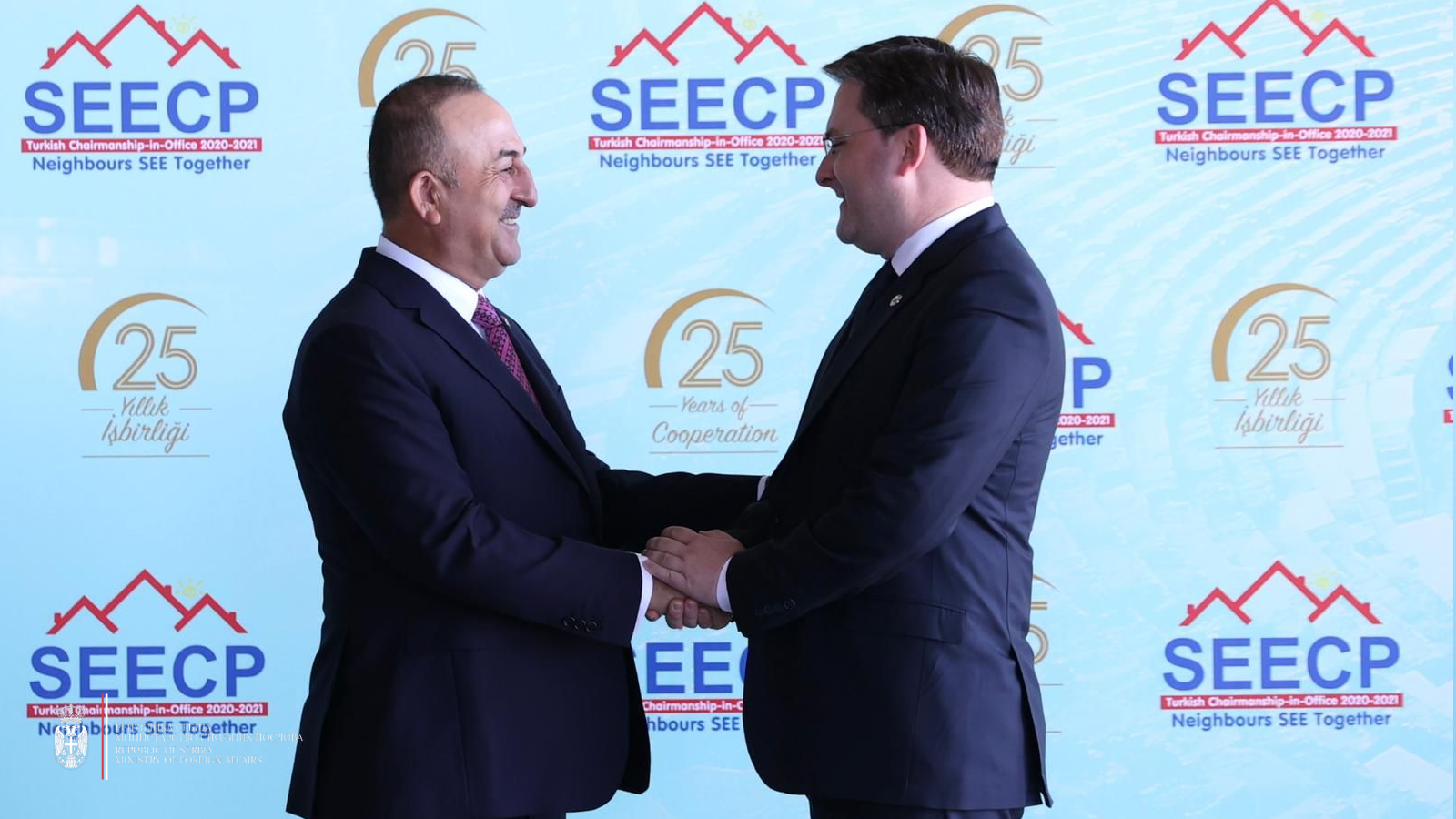
17 June 2021 |
|
|
| Meetings in Antalya successful for Serbia |
|
Prime Minister Ana Brnabic stated today, after the plenary meeting of the South-East European Cooperation Process (SEECP) held in Antalya, that the Joint Declaration, the Strategic Document for South-East Europe and the annual report of the Council for Regional Cooperation were unanimously adopted at this meeting.
Speaking to the press, Brnabic said that the plenary meeting was marked by two things – the fact that even Pristina voted for all documents, although Kosovo is marked in them with an asterisk, and also that President of the interim institutions in Pristina Vjosa Osmani referred to the Brussels Agreement at one moment.
Brnabic underlined that in the Strategic Document for South-East Europe, in every place where “Kosovo” is mentioned, it is marked with an asterisk and a footnote.
It is also interesting that at one moment Osmani invoked the Brussels Agreement and said that according to it, asterisk is not put every time, but only the first time “Kosovo” is mentioned.
We see now that the Kosovo side invokes the Brussels Agreement when it suites them, and when it doesn’t suit them, then the agreement doesn’t exist. That is why I hope they will finally return to the Brussels Agreement, first and foremost in order to form the Community of Serb Municipalities, the Prime Minister underlined.
That has been constructive from them today and totally contrary to everything it could be heard in the Pristina parliament – that they would not allow the adoption of such documents.
Brnabic said that the meeting with Turkish President Recep Tayyip Erdogan was very good and that Erdogan once more sent an invitation to Serbian President Aleksandar Vucic to visit Turkey.
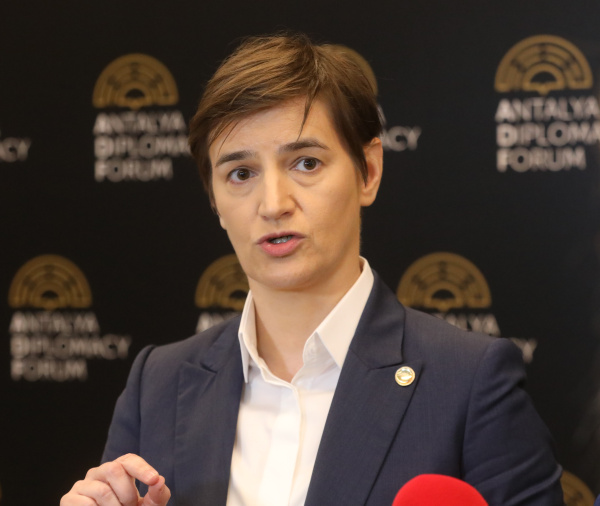
www.srbija.gov.rs
17 June 2021 |
|
|
| Address by the President of the Republic of Serbia at the session of the United Nations Security Council |
|
Dear Mr. President, ladies and gentlemen, members of the delegations
I would point to a few ongoing issues in my speech that refer to the competences of the Mechanism, namely, the possibility of serving the sentences passed by the ICTY and Mechanism in the Republic of Serbia, with the current practice of disabling early release of the sentenced persons as well as obligation of the Mechanism regarding protection of sentenced persons.
The second part of the speech will be dedicated to issues that are opened by the six –month Report on the work of the Mechanism by Mechanism President Mr. Agius and Report by the Chief Prosecutor Mr. Serge Brammertz, especially regarding current cooperation of the Republic of Serbia and the Mechanism.
The third part of my speech, and I noticed that in many of your statements even today, is going to be the view of Serbia on everything that took place in The Hague Tribunal and what the Tribunal verdicts brought to people in the region of former Yugoslavia.
The Republic of Serbia has initiated before the Security Council, on several occasions, the issue of possibility of serving sentences passed by the ICTY and Mechanism in the Republic of Serbia. Beside the efforts to move this issue from “square one”, not a single response was obtained from the Security Council. The majority of persons that are serving their prison sentences are citizens of the Republic of Serbia, and it comes naturally that the Republic of Serbia is interested in enabling them to serve their prison sentences in the Republic of Serbia.
ICTY and the Mechanism are making references to the Security Council as an institution in charge of dealing with this issue.
I am ready to reiterate here the readiness of the Republic of Serbia to take over obligations and liability for executing prison sentences that the Tribunal or Mechanism passed on the citizens of the Republic of Serbia, under the monitoring of the Mechanism and full respect for the authority of the Mechanism regarding early release.
Mr. President
A particular problem that we are facing with is disturbance by the judicial institutions established in the territory of Kosovo and Metohija, which is within Serbia and which is under Interim Administration of the UN. We are witnesses of attempts of retrial for two citizens that are serving their prison sentences for which they had already been trialed before the ICTY. More concretely, in previous period there was an attempt for hearing of Nebojša Pavković and for obtaining extradition of Vlastimir Đorđević.
I urge on the Mechanism and Security Council to prevent attempts of violation of the principle ne bis in idem, a civilization principle that was confirmed in Article 7 (1) of the Statute of the Mechanism and to disable retrials for persons already convicted by the ICTY, particularly to make sure that it is not done in the territory which is under interim UN administration.
Mr. President,
President of the Mechanism (Mr. Carmel Agius), apart from the regular Report, delivered also on 11 May 2021 a letter to the President of the Security Council, whose subject is the alleged omission of the Republic of Serbia to apprehend and turn over to the Mechanism Petar Jojić and Vjerica Radeta, indicted of contempt of court, claiming that in this way the Republic of Serbia was acting contrary to its obligations towards the UNSC Resolution 1966 (2010) and asking the Security Council to take measures in order to ensure that Serbia meets the alleged obligations in accordance with the Mechanism Statue and Resolution 1966.
The point of the argumentation of the President of the Mechanism comes to that that the Republic of Serbia has the obligation to deprive of liberty and extradite to the Mechanism its citizens accused of contempt of court, regardless of the nature of accusation, circumstances under which such an order was made and consequences that might result from its implementation.
It is about accusations that do not refer to sever violations of international humanitarian law and that are related to a case before the ICTY, which ended in 2018 (Vojislav Šešelj case), by acquitting the defendant in the first instance, and upon the Prosecutor’s complaint the defendant was declared guilty and sentenced to a 10-year imprisonment, which was covered by the time he spent at the UN Detention Unit.
Judge Agius states that Serbia ignores its obligations in accordance with the Resolution 1966 (2010). Quite the opposite- the Republic of Serbia takes seriously its obligations regarding cooperation with the Mechanism. After the warrant for apprehension and extradition of the two persons accused of contempt of court to the Mechanism had been introduced, the Higher Court in Belgrade established that assumptions for their apprehension and extradition to the Mechanism had not been met. The decision is founded on the rules of international law and domestic law of the Republic of Serbia and it is mandatory for holders of the executive power in the Republic of Serbia.
I would remind here that the first decision of a sole judge (Aydin Sefa Akay, 12 June 2018), that was acting in this case was that the criminal prosecution of V. Radeta and P. Jojić for alleged contempt of court was to be forwarded to the judicial authorities of the Republic of Serbia. In procedures that followed, the argument of the alleged unwillingness of the witnesses to cooperate with the judicial authorities of the Republic of Serbia was stated for the first time, and the decision on deprivation of transferring the case to the jurisdiction of the judicial authorities of the Republic of Serbia was based on the respective argument.
The Republic of Serbia expressed its readiness to take over the court procedure against Petar Jojić and Vjerica Radeta on several occasions and it provided appropriate guarantees. Additionally, the Republic of Serbia fully recognizes and accepts the obligation of the Mechanism to monitor trials that were transferred to national courts with the help of international and regional organizations, as well as to take measures envisaged by Article 6 of the Statute of the Mechanism.
I would remind here that the Republic of Serbia extradited to the tribunal all the persons indicted by the Prosecutor’s Office, and among the respective mostly highest political, military and police officials; it enabled presence of vast number of witnesses, delivered extensive documentation. Obligation of the Mechanism, in accordance with the Resolution of this Security Council, is to take measures that enable transfer of cases to national justice system. In previous practice, 13 cases were transferred to Bosnia and Herzegovina, 2 to Croatia and only one to Serbia.
The last but not the least, I want to remind all of you here of the fact that France- of course as a sovereign and independent country- upon request for apprehension and extradition of Florence Altman for publishing documents and contempt of court, refused the request for extradition, with an explanation that it does not extradite its citizens. For far smaller offence you ask as to extradite our citizens Jojic and Radeta, showing both the distrust to Serbian justice and judiciary and Serbian State, as well as a fact that the rule from ancient Rome is still valid – quod licet lovi non licet bovi.
It does not harm to underline that high-level officers and politicians were not trialed for crimes against Serbs, and that crimes against Serbs remained unsanctioned before ICTY and Mechanism. Let me remind you, just as an example that Ademi and Norac case for ferocious crimes against Serb civilians in Medački Džep was left to Croatian justice institutions. Proven crimes against Serbs, like those of Ramuš Haradinaj, Naser Orić, then Ante Gotovina and other indicted for military operation “Storm” that led to a complete ethnic cleansing of Serb population in the big part of today’s Croatia, resulted before the ICTY in acquittals. Many horrible crimes against Serb civilians that were committed in the territory of Bosnia and Herzegovina, Croatia and the Autonomous Province of Kosovo and Metohija, and that resulted in ethnic cleansing, simply were not the subject of interest of the ICTY.
What’s very important and not to leave anything unclear, Serbia is a country that condemns all crimes and all criminals who perpetrated them in the region of former Yugoslavia. However, it is interesting that despite often criticism Serbia is the only one that speaks openly and condemns crimes perpetrated by Serb nationals, while in other regional countries they do not speak at all about crimes that representatives of those nations committed against members of Serbian people.
And I want to emphasize once again here in front of you that Serbia condemns terrible crime in Srebrenica and extends its deepest condolences to the families of all killed in that massacre. And there are no “buts” about the respective.
Nevertheless, we are here to analyze results and penal policy of ICTY and the Mechanism and it was such that it has never gained trust among Serbian people, no matter where they live. And not because we Serbs do not acknowledge crime committed by some of our compatriots, but because The Hague Tribunal, with exceptions, was judging only to Serbs and in all three territories of former Yugoslavia- Croatia, Bosnia and Herzegovina and Kosovo and Metohija, which some of the SC Member States see and name of course, contrary to law and legal norms and UN Resolutions, as an independent state. I would try to plastically prove to you how The Hague justice was tailored even though I know that it will not come to understanding of many of you, but to me it is important because of the history, facts, and school books that will be made in accordance with the facts.
Namely, Serbs were sentenced to totally 1138 years of imprisonment, and to 8 life imprisonments. At the same time, The Hague Tribunal did not sentence a single Croat for crimes against Serbs, neither in actions Medački Džep, nor Flash and Storm. How politically cunning it was done in the Tribunal, and all wrapped in the form of law and justice. Prosecutors of The Hague Tribunal chose on purpose three military and political leaders of Croats, Bosniac Muslims and Albanians, on all three mentioned territories, committed against Serbs. – Ante Gotovina, Naser Orić and Ramuš Haradinaj. It is interesting that following the same pattern, the same pattern, this injustice was shared. Namely, all of them were sentenced in the first instance procedure, with the exception of Ramuš Haradinaj, because not a single witness survived. Gotovina was sentenced to 24 years’ imprisonment in first-instance procedure, while by a mysterious decision of the second instance council and 3:2 judge ratio, the verdict was changed to acquittal. Naser Orić, for crimes against Serbs, was also sentenced in first instance verdict, but by a mysterious decision of the second instance court, and again 3:2 ratio decision was an acquittal and he was set free of any liability. Let me reiterate, all witnesses in process against Ramus Haradinaj, either committed suicide or were killed under very, very strange circumstances.
Let me conclude, I do not want to believe that someone wants to say that there had been no crimes against Serbs, but judging by the verdicts of The Hague Tribunal, no one- absolutely no one- is responsible for those crimes.
Nevertheless, we in Serbia will show responsibility and we will fight for peace, stability and reconciliation in the region.
We ask UN Security Council Member States to help us with rational and pragmatic approach and respect for international law and not by attempts of further humiliation of Serbia. Serbia is a small country, with proud and courageous people, the one that gave the biggest sacrifice during the WWI and WWII; people who wants to leave in peace with their neighbors. And when I am asking you for this, I do not think I am asking for too much.
At the very end, Serbia is the fastest growing country of the Western Balkans region and we cannot progress unless our relations with neighbors, friends and other countries are good, solid and better. That is why- despite the selective justice that was applied in The Hague Tribunal- we will be open for any dialogue, any kind of cooperation and we will look towards the future and not towards the past. And I have only one message for the citizens of Serbia and citizens of Serbian nationality in the entire region- keep your heads up, neither Serbia nor Serbian people are convicted of anything and it is up to us to work even more diligently, to open factories and to fight for our children and our future.
Long Live Serbia!
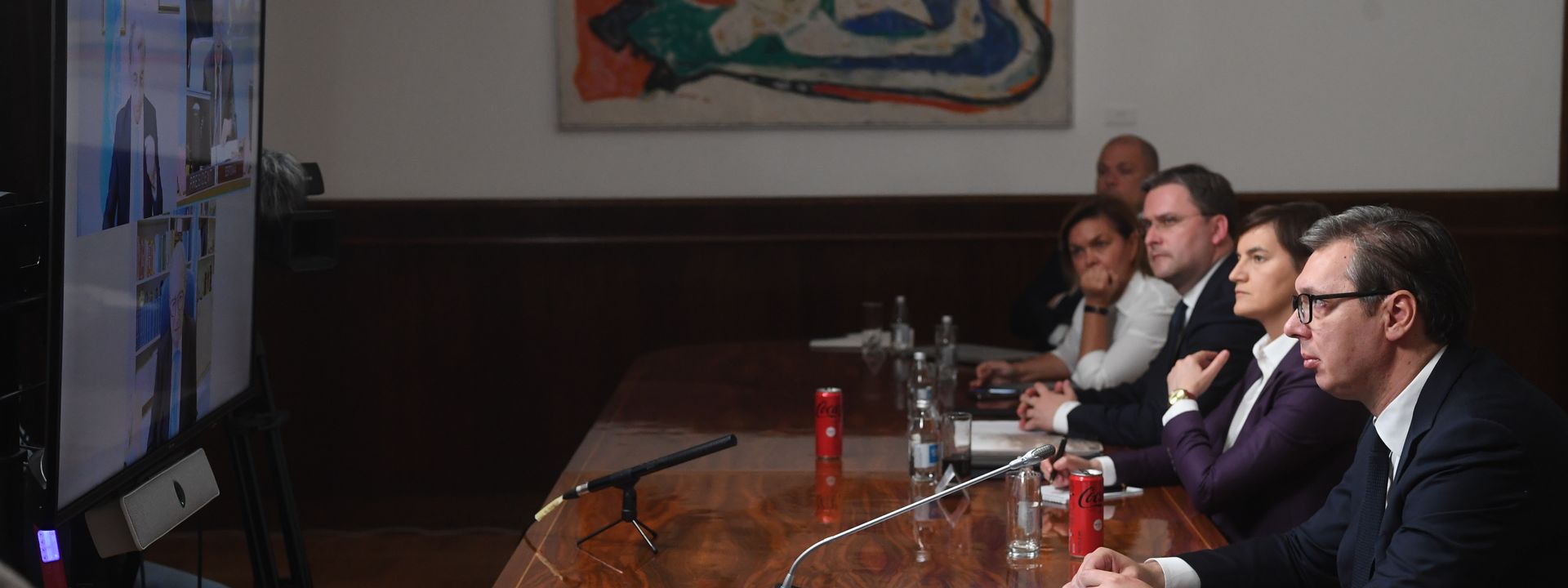
09. June 2021. |
|
|
| Minister Selaković presented the new e-Consulate service |
|
A new service of the Ministry of Foreign Affairs "e-Consulate" was presented in Belgrade today, intended for foreign citizens who apply for a visa and aspire to come to Serbia to work.
On that occasion, Minister of Foreign Affairs of the Republic of Serbia Nikola Selakovic said that this service was one of the indicators of good development of our country, which, as he pointed out, was becoming a magnet for serious foreign companies, which brought a large number of workers from other countries to work in Serbia.
"Not to be pretentious, but completely realistic, this service represents a turning point in the functioning of our system. E-Consulate and digitalization of the procedure for issuing work visas for foreign citizens who want to work in Serbia, is the first electronic service offered by the Foreign Ministry, and I can promise you that this is indeed our first, but by no means the last e-service", Selakovic emphasized.
The Head of Serbian diplomacy pointed out that "e-Consulate" reflected the modernization of an extremely important segment of the activities of diplomatic and consular missions of Serbia, and that we were actually talking about something that was essential for the further development processes of our country.
The Minister recalled that, when the President of the Republic visited the construction site of the Moravian Corridor, he was told that some construction works were delayed because Bechtel company was not issued work visas on time.
“The moment we saw that and heard the President, I alerted the services in the Ministry. We were surprised, as we knew that the issuance of visas in Turkey had a good dynamic, and then we determined that it was actually workers from Bangladesh who applied for a visa through our Embassy in India, where we have a problem with staff shortage”, the Minister explained.
As he added, this is a demanding and laborious task, each of our employees had to receive the documentation on paper, check it, then request additional information, and only then forward it.
"Today, this has been fantastically perfected for our consular officers, all that documentation is submitted in electronic form. We used to have two filters to check the documentation, now we actually have three. And the work is significantly more efficient", Selakovic pointed out.
As he emphasized, this is a service which was promised less than four months ago and it becomes available on Monday, in 95 diplomatic and consular missions of Serbia, i.e. in all our embassies and consulates general.
The biggest result of that endeavor, the Minister pointed out, apart from the advantage it would bring in the future work, was the fact that it was not a project of one state body, but a joint endeavor of the Ministry of Foreign Affairs, IT and eGovernment Office, General Secretariat of the Government, Ministry of the Interior, Ministry of Labor, Employment, Veterans and Social Affairs, National Employment Service.
“We did an extremely good job in record time. This is to the pride of our Ministry, to the pride of the entire state. I am convinced that in the period ahead, we will further modernize our affairs and make Serbia one of the few countries that has such mechanisms and such state-of-the-art provision of consular services", Selakovic said.
Speaking about the "e-Consulate" portal itself, the Minister explained that there is a cartoon of Nikola Tesla and the building of the old railway station with one crane, which actually symbolizes a historical fact - that Tesla was in Belgrade in the year when it was built.
"Today it is the place behind which the Belgrade of the future is rising, and what we managed to do together is an indicator of something that is the future of Serbia, the development of artificial intelligence, IT and creating conditions for more people to live and arrive here in Serbia in the future seeking good life and employment", concluded the Minister.
The Director of the Office for IT and eGovernment, Mihailo Jovanovic, said that this was the first time that e-services were focused on foreign citizens, which was the case with our citizens so far.
In the period from 1 January 2019 to 17 May this year, the most applications for Serbian visas were submitted at the Embassy in Beijing, 6,766 applications, then in New Delhi - 2,973, Shanghai 2,115, Tokyo 1,798, and Cairo 1,756.
In that period, 1,270 requests were submitted in Algiers, 1,095 in Jakarta, and 1,077 in Beirut.
In terms of their nationality, Serbian D visa for employment is most requested by citizens of China - 9,516 applications, followed by India 1,955, and Ukraine - 673.
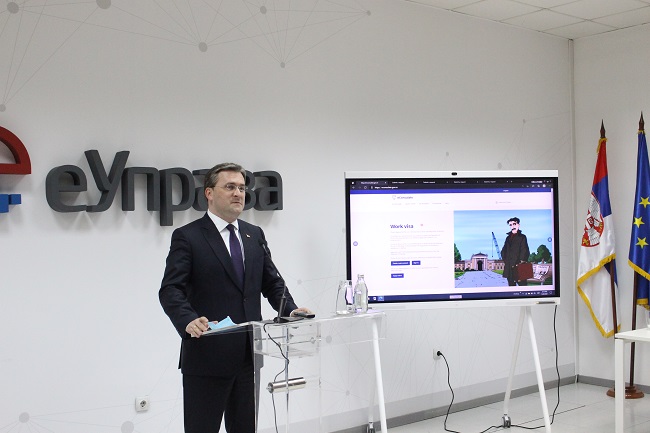
20 May 2021
|
|
|
| Visit by the President of the Republic of Slovenia |
|
Visit by the President of the Republic of Slovenia
President of the Republic of Serbia Aleksandar Vucic met today with President of the Republic of Slovenia Borut Pahor, with whom he discussed bilateral relations, European integration of Serbia, but also important regional processes, as well as the Brdo-Brioni Summit to be held on Monday.
President Vucic said that the high level of bilateral relations was affirmed at the meeting with President Pahor and pointed out that he had presented Serbia's positions on the issue of Kosovo and Metohija to his Slovenian counterpart, and the position that the issue needed to be resolved by compromise, through dialogue, because a frozen conflict was never a good solution, which could still be seen very well today in the examples of the escalation of such conflicts.
"I believe that our position is based on respect for the principles of international law, on solid legal grounds. Our position is not an easy one, it is clear that we have different views on the issue of Kosovo and Metohija", President Vucic said and reiterated that Serbia wanted to continue the EU-facilitated dialogue with Pristina. He emphasized that Slovenia's role in the region of the Western Balkans had always been important for Serbia.
“Slovenia will be holding the EU Presidency from July and the support of Slovenia on our EU path is important for us. Preserving peace and stability is of key importance to us. Serbia has recorded not only good, but excellent economic progress at the European level, a high growth rate and it is crucial that we dedicate ourselves to economic and reforms in the field of the rule of law. I believe that with our partners from the region we can achieve better results. We have good talks and a good dialogue on the position of Serbs in Slovenia and Slovenes in Serbia", President Vucic emphasized and added that the 6th session of the Governments of Serbia and Slovenia is expected to be held. He stated that Serbia was on the European path and that it strongly supported all others on that path, having nothing against a comprehensive approach in the process of enlargement of the Union.
"We consider that it is important that we all take care of the whole region together because we live together, side by side. We have nothing against a comprehensive approach. Of course, you will always have an approach based on progress but we have nothing against a more significant geopolitical approach to the Western Balkans", President Vucic said.
President of the Republic of Slovenia Borut Pahor stated that he was in favour of a geopolitical approach of the EU in the enlargement process and the rapid accession of the Western Balkans, because only that, as he said, could ensure peace, security and stability. He stated that there were currently two types of worrying fatigue - on the one hand, fatigue from EU enlargement, and on the other, in many countries of the Western Balkans, fatigue in the implementation of reforms and a decline in confidence in the European perspective.
"This is not in the interest of the EU or the citizens of the Western Balkans. With a fresh strategy, which would emphasize the geopolitical approach to enlargement, we want to warn Brussels that only the rapid accession of all countries in the region can maintain peace, security and stability”, Slovenian President Pahor underlined and added that he believed that it would be less complicated to solve all the remaining problems after joining the EU. He said that some issues, which were sensitive, bilateral ones, could be resolved more easily or would become irrelevant as a result of a joint accession to the Union, and expressed hope that Brussels would understand Slovenia's message.
"If you look at the map of Europe, you see that the Western Balkans is surrounded by EU countries. If you look at the absorption capacity, this is only about 10 million people, which is not a big challenge and problem for the EU", the Slovenian President emphasized.
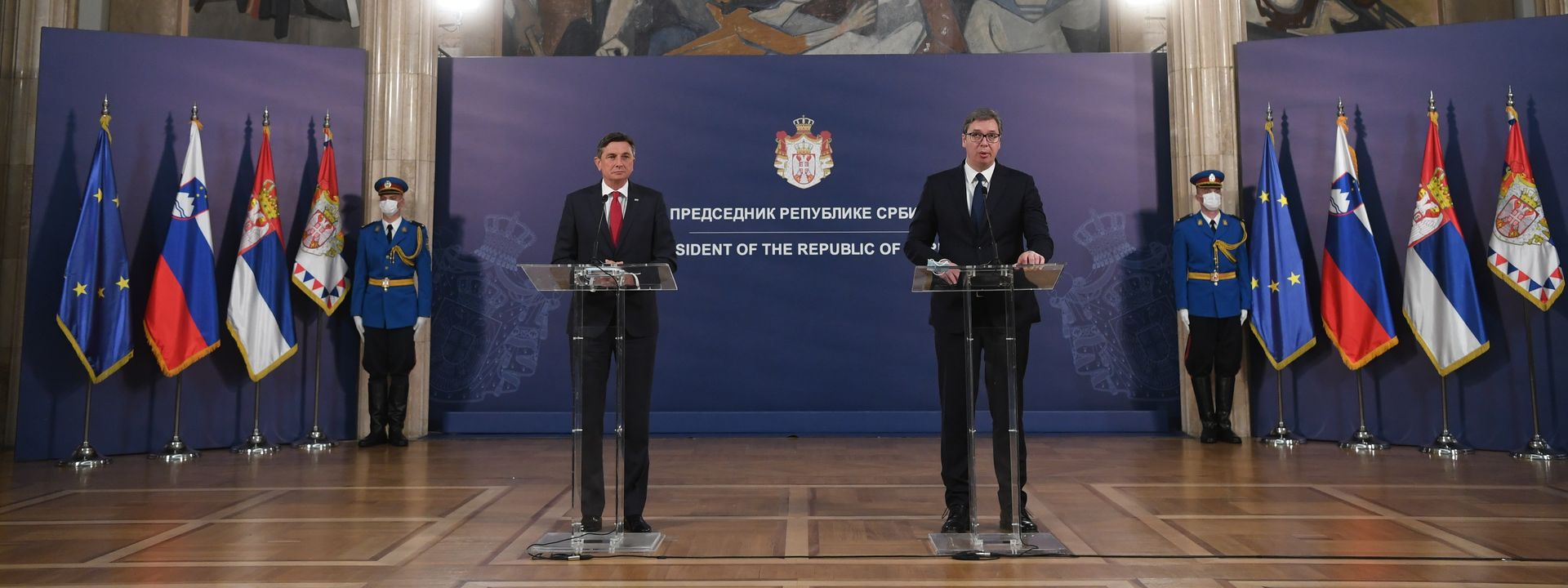
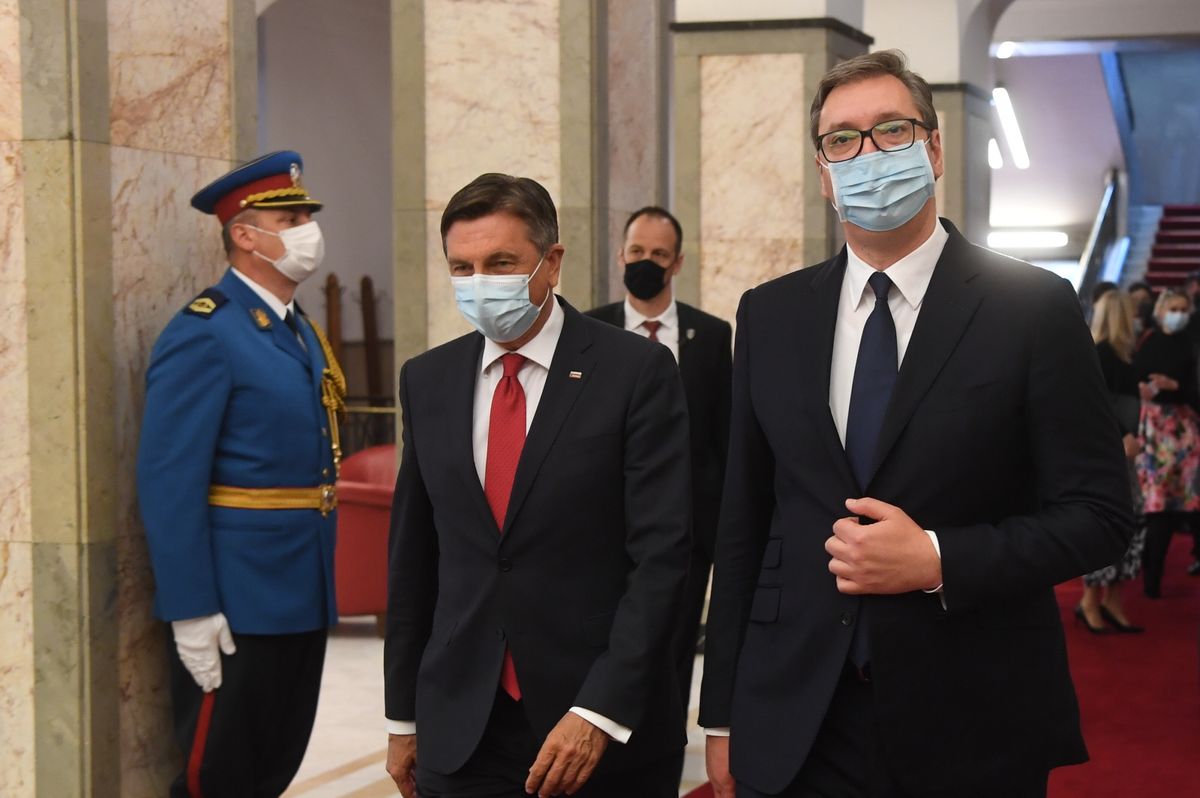
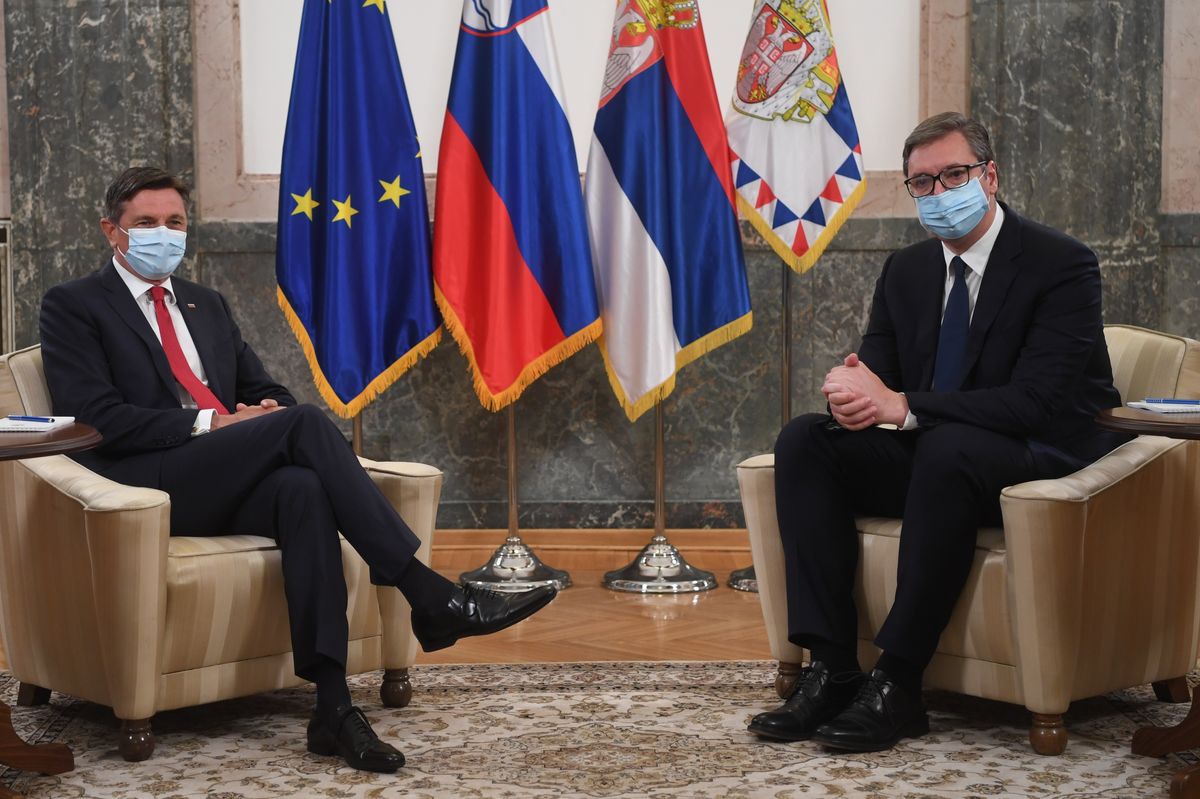
Source: www.predsednik.rs
Photo: Dimitrije Goll
14 May 2021 |
|
|
| Vucic: We consider Europe our home |
|
President Vucic said tonight that the visionary idea of Robert Schuman brought a true victory of the new trust after the Second World War and faith in the unification of differences in peace and solidarity, with the message that Serbia has that faith, as well as hope that it will become a country that will be gladly regarded in the European family of nations.
Congratulating everyone in Serbia and the EU on Europe Day, Vucic reminded that 9 May was also the day when the great victory of freedom is celebrated, which was won with huge sacrifices.
"While the horrors of war were still fresh in memory and Europe was healing the wounds of World War II, it also had people like Robert Schuman who understood that future can only be created based on the reconciliation of nations and their unity", Vucic said at the reception on the occasion of Europe Day.
He pointed out that the European peoples dared to see the recent adversaries as future allies.
"Schuman's visionary idea that peace will be preserved, if the creative forces are commensurate with the dangers that threaten, that Europe will emerge from specific achievements, has brought a true victory of newly found trust and faith in uniting differences in peace and solidarity", Vucic said.
He said that Serbia, although it did not always look like that, had that faith, as well as the hope that our concrete achievements, on the long and not easy path to EU membership, would be adequately valued.
“And that with your help, support and criticism, Serbia will become a country that you will be happy to see in the European community of nations. I believe that with our support, help and criticism, we would also contribute to the EU becoming an even better place to live", Vucic said.
Full membership of the EU, with a compromise solution to the issue of Kosovo and Metohija, is a way to achieve the goal and make Serbia orderly and successful, which would mean that we are on a good, European path, the President of Serbia said.
Vucic said that we still had to make a lot of efforts in reforms, not because someone is asking us to do that, but because we know that it brings us and the country a benefit.
He also pointed out that the reforms in the rule of law were exceptionally important, which were now being approached with much more responsibility.
"In our country, there is a race in who will say that they are more in favour of Europe, while saying under the table that they are the least for Europe. Europe does not belong only to those who would like to use European money, it does not belong to those in the government who say that they are on the European path because they believe that they are in that way preventing the opposition from coming to power, nor to those who think that this is the only way to get hold of power. It belongs to all of us, but we cannot take from Europe only what we like without accepting what we do not like", he explained.
I know, he added, how difficult it is to us in Serbia to hear criticism concerning Kosovo as well as in the field of the rule of law.
"I saw for myself that we are the ones who did not pay enough attention and apply a dedicated approach to the burning problems in that area. I believe that with greater zeal we will be able to change the attitude of the citizens of Serbia and gain greater respect from the EU for what we are doing", he pointed out.
President Vucic also pointed out that the EU was undoubtedly the largest donor, investor, and by far the most important trade partner of Serbia, and recalled that about two-thirds of all trade and even more service activities were EU related and that these were facts, whether someone liked it or not.
He pointed out that seven years ago when he became the Prime Minister, three times fewer people were employed in companies that came from EU countries than today.
"Despite all the problems, it shows how much we managed to do together and make good results, to provide people with life, security at work, to show that we can take care of them more", Vucic said, noting the great EU assistance in the field of education.
He said that during the recent visit to the EU, which he assessed as the best one so far, Serbia received additional support for infrastructure projects, primarily for modernization, i.e. essentially the construction of a new Belgrade-Nis-Presevo railway.
He said that this was confirmed in the letter of the President of the European Commission, Ursula von der Leyen, pointing out that this was the best letter he had ever received from Brussels.
"I am grateful to Von der Leyen for pointing out that this is a game-changer in our relations. It is a turning point because that support exceeds everything we have done together when you look at the scale, strength and significance of that project", he said.
He said that Serbia and its citizens considered Europe as their home and that is why we wanted to give our best contribution to peace through regional connectivity, the Berlin Conference and mini-Schengen.
"Encouraged by the message of European officials, I hope that I will be able to host them soon so that we can discuss the further acceleration of our European path", Vucic concluded.
Head of the Delegation of the European Union to Serbia Sem Fabrizi hosted a reception tonight on the occasion of marking 9 May, Europe Day. In addition to Serbian President Aleksandar Vucic, the reception in the Belgrade City Assembly was attended by Serbian Parliament Speaker Ivica Dacic, Serbian Prime Minister Ana Brnabic, Foreign Minister Nikola Selakovic, European Integration Minister Jadranka Joksimovic, representatives of the diplomatic corps and public figures.
Europe Day was established in memory of the beginning of the creation of the European Union (EU) and the Day of Victory over Fascism in the Second World War. The reception is held in memory of 9 May 1950, when the Schuman Declaration was signed, which laid the foundations of the European Union, a project that brought the longest period without war on the Old Continent.
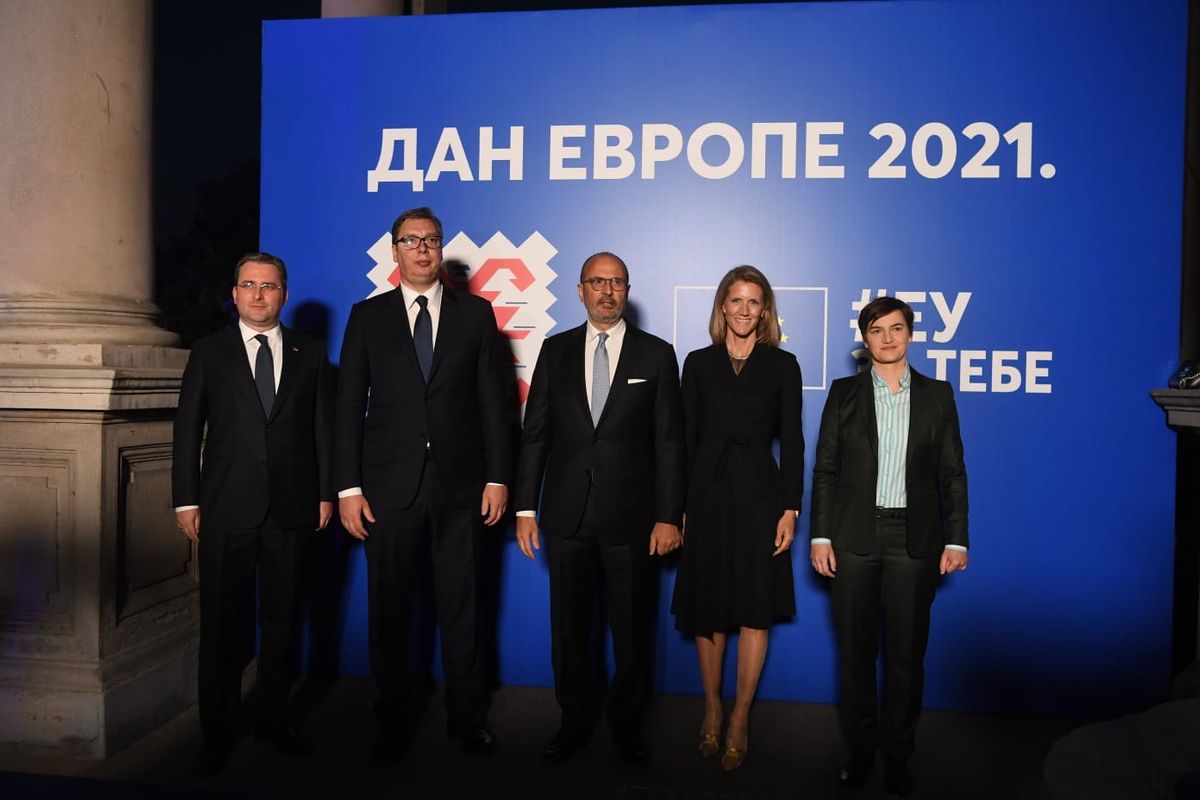
8 May 2021
Source: Tanjug
Photo: Tanjug
|
|
|
| Selakovic: Serbia demonstrated that solidarity does not solely have to be the privilege of the rich |
|
Minister of Foreign Affairs of the Republic of Serbia Nikola Selakovic participated today in the Adriatic and Ionian Council of the Adriatic and Ionian Initiative and the Ministerial Meeting of the EU Strategy for the Adriatic and Ionian Region, stating that it was necessary to include all available resources of this initiative more directly in finding common answers to the challenges posed by the coronavirus pandemic.
The Serbian Foreign Minister pointed out that the pandemic can only be defeated by joint forces, emphasizing that solidarity was the key word in these challenging times.
“Being committed to the principles of solidarity, Serbia vaccinated a large number of foreign nationals, primarily from the region. We have donated a number of vaccine doses to neighbouring countries as well as to the secretariats of regional initiatives in which Serbia participates. In this way, although not one of the economically strongest countries in this initiative, Serbia endeavoured to demonstrate that solidarity does not solely have to be the privilege of the rich”, Minister Selakovic said.
The Minister stressed that Serbia had entered the process of immunization of citizens against Covid-19 at the end of last year, and underlined that Serbia was one of the countries that faced both the epidemic and the vaccination process in the most efficient way.
Selakovic expressed pleasure over the fact that the "Izola Declaration" recognized the importance of a common European response to the pandemic and the need to revise the activity, particularly within the EU Strategy for the Adriatic and Ionian Region, while also being pleased that the Declaration confirmed the European perspective of the Western Balkans.
“Serbia's commitment to building a further European perspective and strengthening regional cooperation has been unequivocal”, Selakovic said adding that Serbia focused special attention on the green and digital transition in line with the European Green Deal, with support from the relevant EU funding programmes.
The meeting was held in video format, within the Slovenian Chairmanship of the initiative.
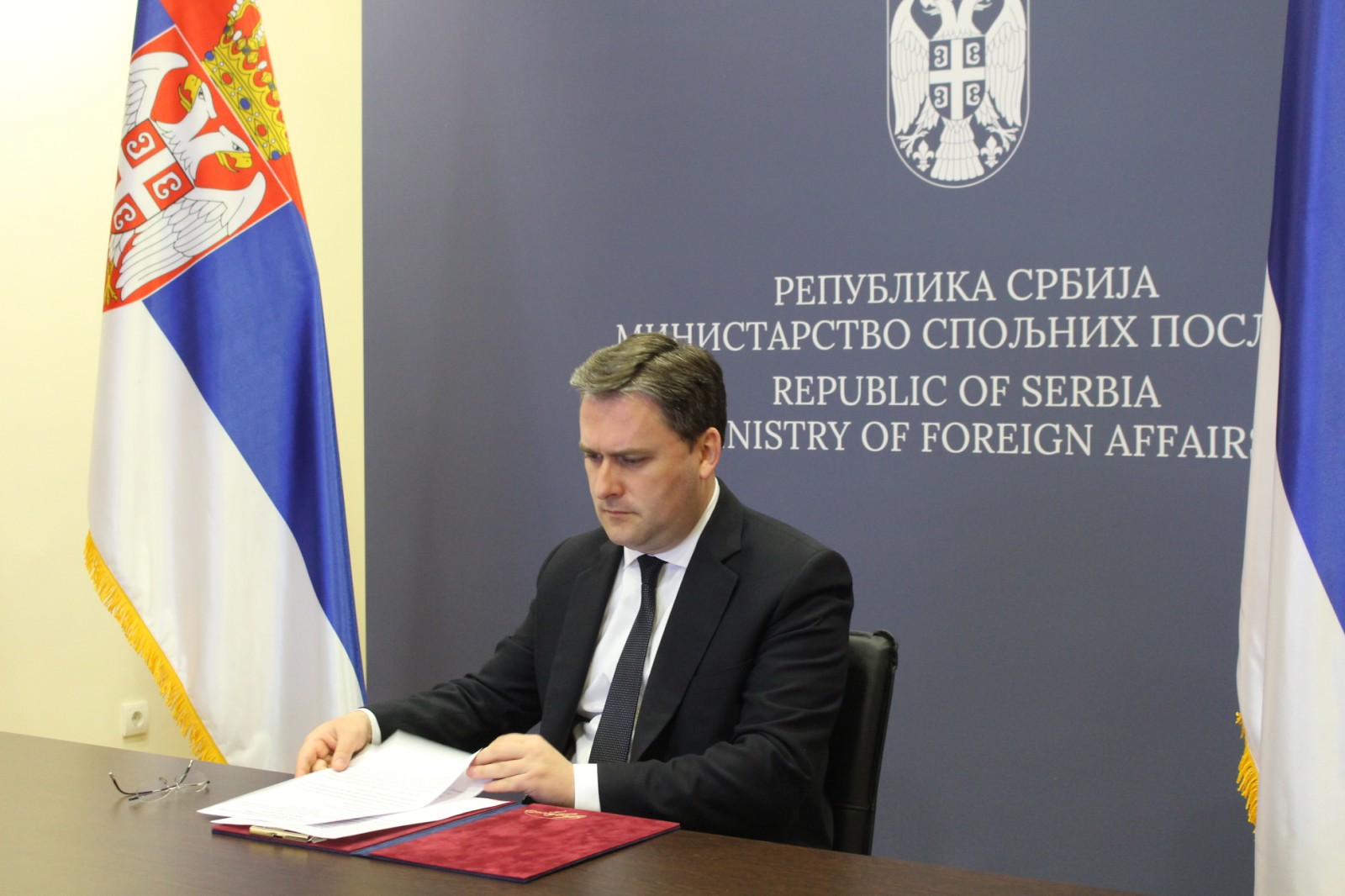
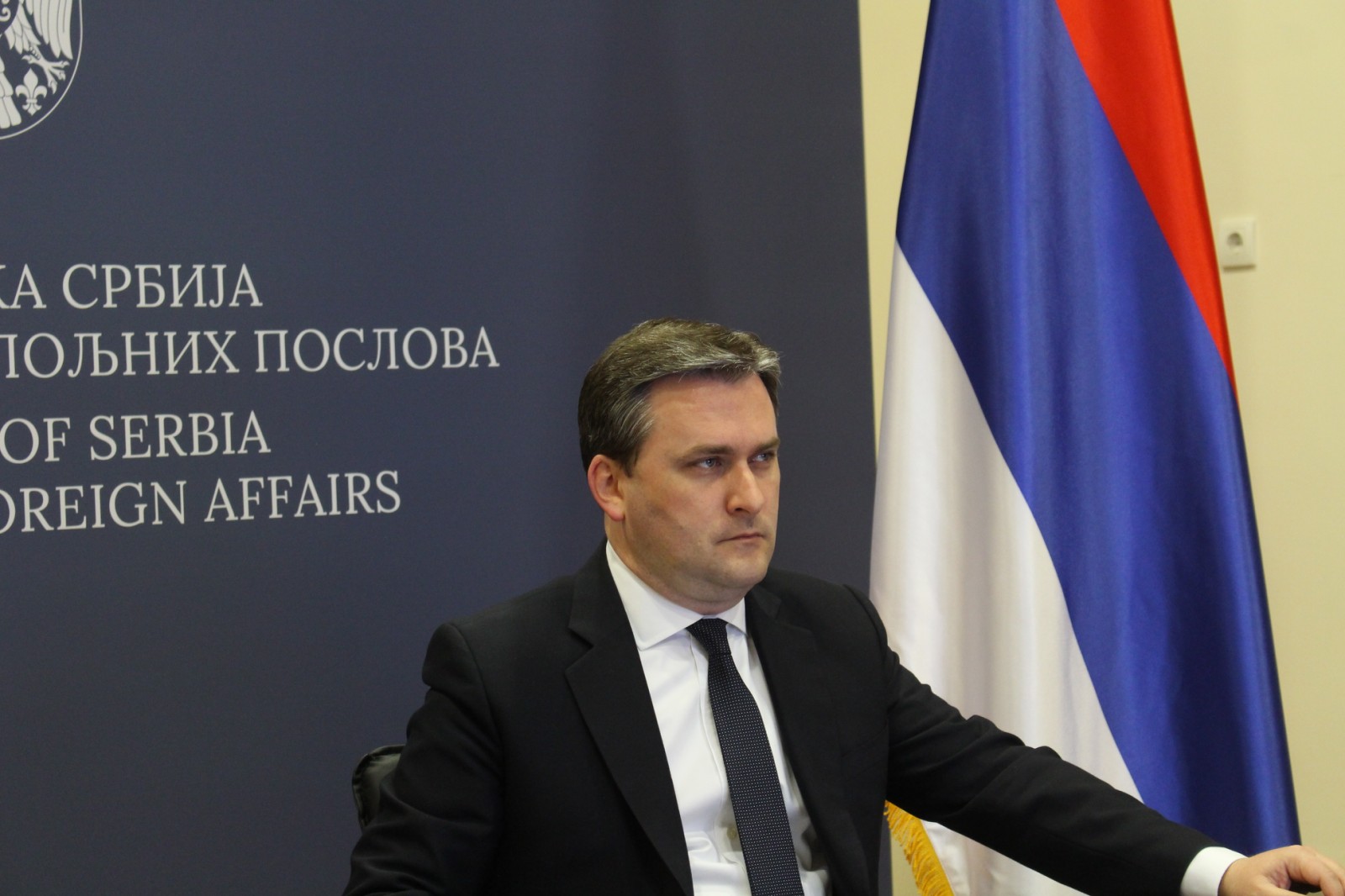
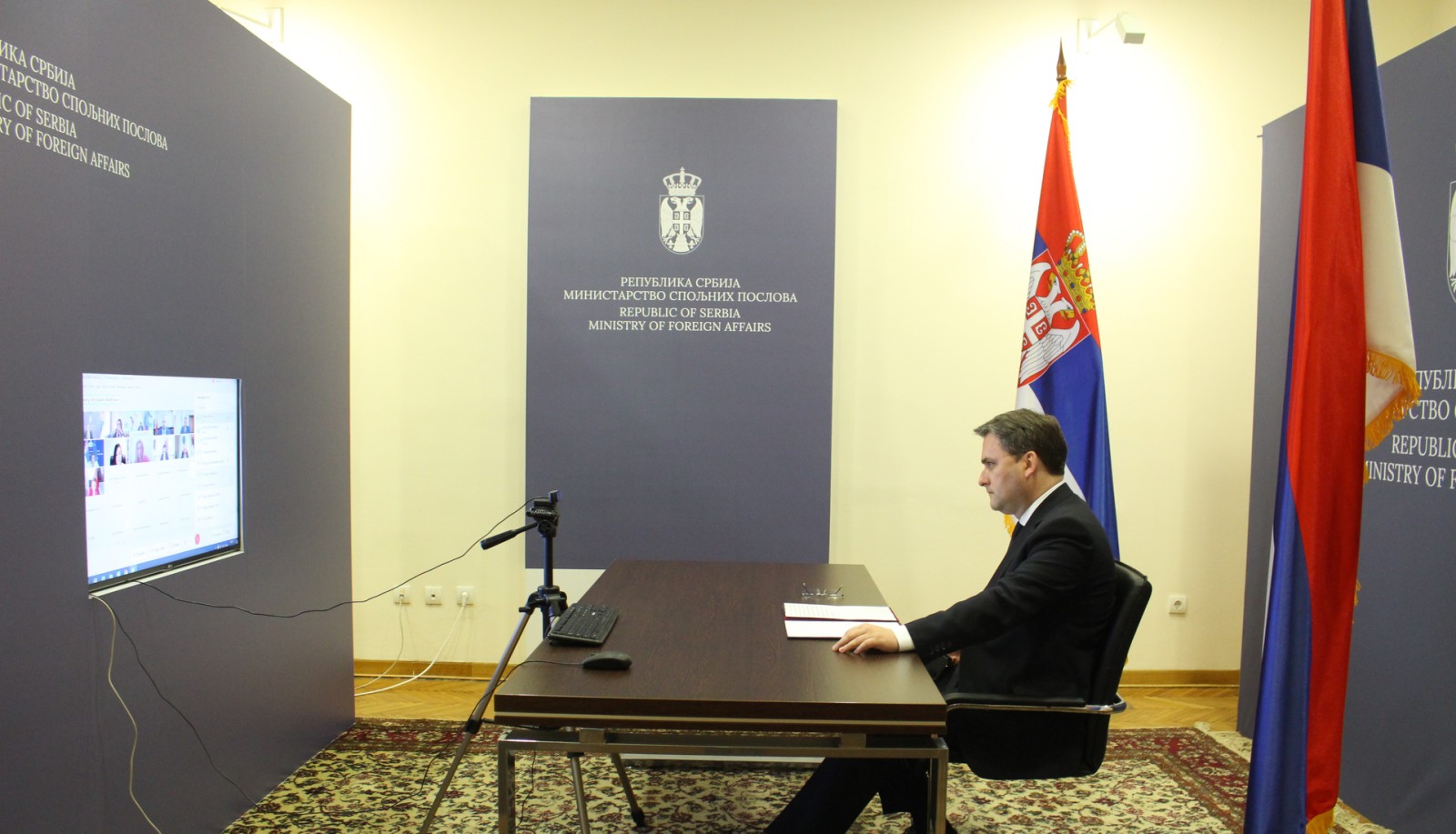
11 May 2021 |
|
|
| Selakovic congratulates Josep Borrell on Europe Day |
|
Minister of Foreign Affairs of the Republic of Serbia Nikola Selakovic extended a congratulatory message on the occasion of 9 May, Europe Day, to High Representative of the EU for Foreign Affairs and Security Policy Josep Borrell, expressing confidence that the idea of uniting in diversity, in peace and solidarity, would continue to be the guiding idea of the European Union.
"I am deeply convinced that the Republic of Serbia, through a policy of peace and good-neighbourly cooperation, can contribute to the European Union becoming an even better place to live, with the sincere belief that our achievements on the path to membership in the European family of nations will be adequately valued", reads the congratulatory message by Minister Selakovic, adding that the European perspective gave a strong impetus for our country to comprehensively implement political, economic and social reforms with the aim of becoming a full member of the European Union in the foreseeable future.
The Serbian Foreign Minister underlined that Serbia historically, culturally and in terms of values, belonged to the circle of countries united under the flag of the European Union and expressed hope that not only our country, but also our neighbours in the Western Balkans, would have the opportunity in the near future to become a part of what is without a doubt the most successful peace, democratic and economic project in the history of our common continent.
Selakovic also took the opportunity to extend gratitude on behalf of Serbia to the European Union for its assistance in the fight against the infectious Covid-19, emphasizing that our country highly appreciated the expressed solidarity and support in the difficult times of the pandemic outbreak and expressing confidence that the period ahead would see us contribute by joint forces to identifying solutions for overcoming the economic consequences of the corona virus pandemic.
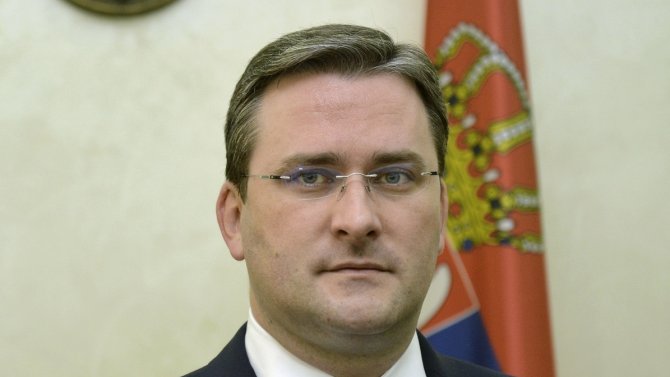
8 May 2021
|
|
|
| President Vučić met via video link with representatives of the IMF delegation |
|
President of the Republic of Serbia Aleksandar Vučić talked today via a video link with the representatives of the delegation of the International Monetary Fund led by the Head of the Mission, Jan Kees Martijn. The interlocutors concluded that Serbia's main goal remains to preserve the hard-earned reputation of a fiscally secure country, as well as to continue with a responsible fiscal policy so that public debt does not exceed 60 per cent of GDP, whereby Serbia continues to work on further economic growth.
During the conversation, President Vučić and Jan Kees Martijn especially referred to the incentive measures and adopted three packages of measures to help the economy and citizens, which preserved macroeconomic stability and even achieved a higher employment rate. Martijn commended the responsible economic policy of Serbia and the successful crisis management during the pandemic.
"Serbia achieved one of the best results last year despite the challenges of the pandemic", Martijn said, noting that Serbia was one of the few countries to which the IMF did not adjust the initial projection of the 5% growth rate it gave last year.
President Vučić added that following the first quarter of 2021, Serbia is well on its way to achieving the planned growth of 6% as planned, since one of the main focuses of the Government is investing in large infrastructure projects and intensifying work on attracting foreign direct investments.
"In 2020, Serbia was at the very top in terms of economic growth in Europe, and I am convinced that this year we can enter the first three or four countries in terms of growth", said President Vučić, adding that he was satisfied that Serbia still, despite the pandemic situation, has an extremely strong inflow of investment.
President Vučić and Jan Kees Martijn also discussed a new advisory arrangement, which is of special importance in light of the improvement of the general investment climate in Serbia, as well as in the context of even greater investor assurance.
"Given Serbia's tremendous progress over the past eight years, the priority goal of this arrangement will be to preserve the results achieved, but also to provide support for further implementation of structural reforms aimed at even faster, stronger and more sustainable growth", said President Vučić and thanked the IMF and the personal engagement of Jan Kees Martijn in the professional and expert support that Serbia is counting on.
President Vučić pointed out that Serbia will pay special attention to reforms in public companies, and that priorities will continue to be investments in infrastructure, creating an even better climate for investments, greater investments in the environment, science and capital projects, which will further contribute to the long term stable financial growth in the coming years.
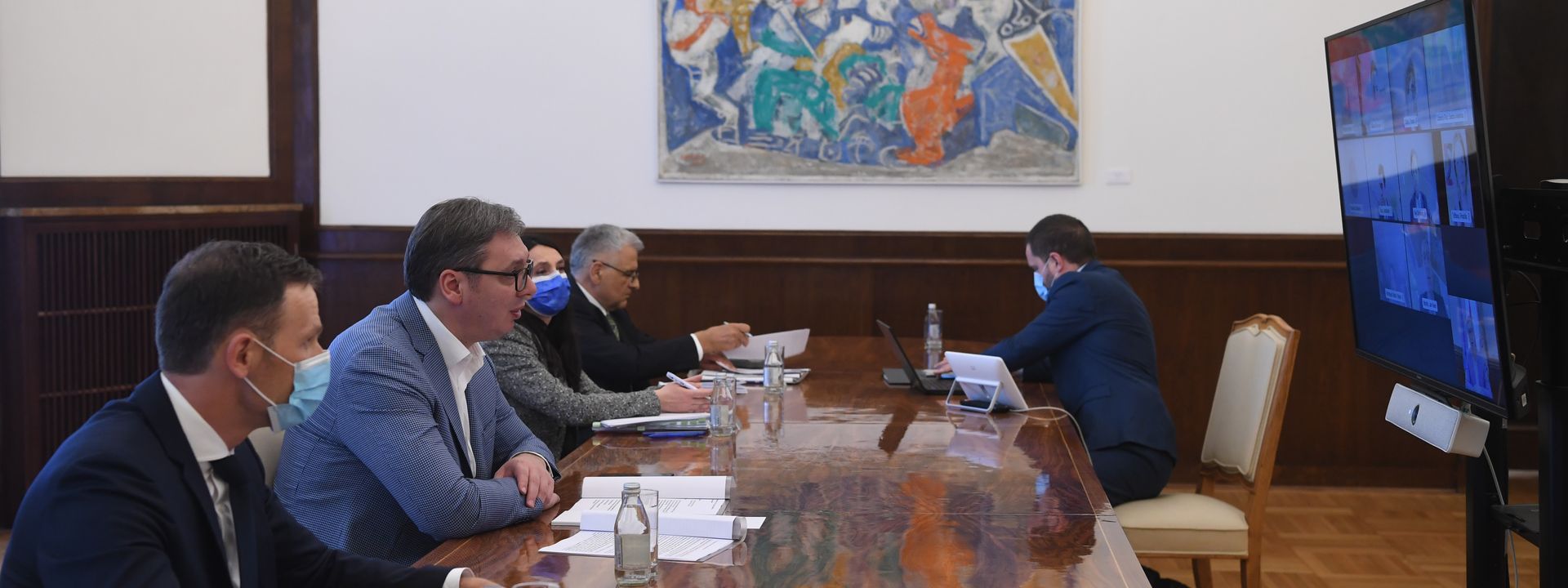
21st April 2021
Source: www.predsednik.rs
Photo: www.predsednik.rs
|
|
|
| Meeting with the World Health Organization Regional Director for Europe |
|
President of the Republic of Serbia Aleksandar Vučić met today with the Regional Director of the World Health Organisation for Europe Hans Kluge, to discuss cooperation in the fight against the COVID-19 pandemic, as well as cooperation in improving health care in our country and other joint activities.
President Vučić thanked Dr Kluge for his personal engagement and support during the current pandemic, especially for technical assistance and expertise. On this occasion, he informed the WHO official about the results of immunisation in Serbia and plans on how to provide the vaccine to all citizens who want to get it.
Dr Kluge congratulated President Vučić on his leadership and personal commitment to provide vaccines. He emphasised that Serbia, with its good immunisation strategy, ranked among the global leaders, thus becoming an example of humanity and solidarity by enabling vaccination of elderly people in rural areas, foreign citizens and donating vaccines to other countries.
"Serbia has accepted the vaccine as a life-saving product and has not looked at it geopolitically", said Dr Kluge.
The two interlocutors agreed that the world should increase production capacities for vaccines, as well as develop new adequate therapies for the fight against COVID-19, and, in this regard, work on increasing the level of citizens' trust in science.
President Vučić informed Dr Kluge about the plans for improving the work of the Institute for Virology, Vaccines and Sera "Torlak".
"We want to make 'Torlak' one of the best vaccine factories in Europe", said President Vučić.
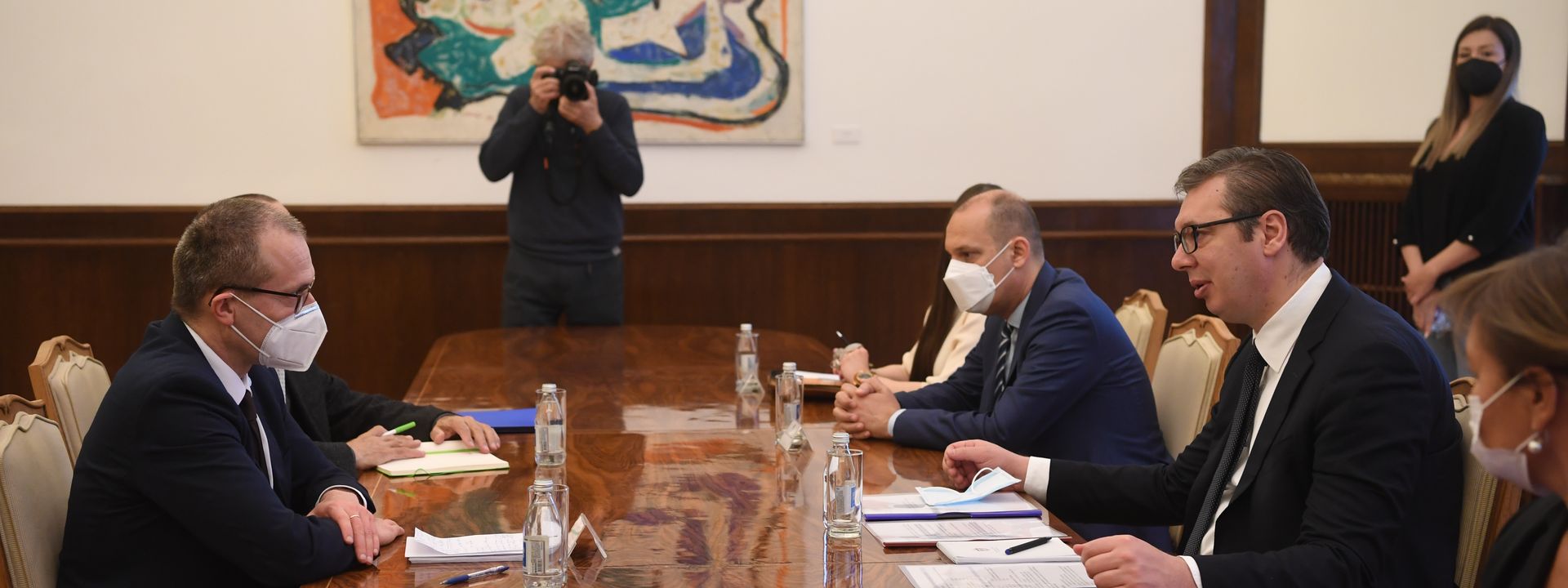
20th April 2021
Source: www.predsednik.rs
Photo: www.predsednik.rs
|
|
|
| WHO describes immunisation process in Serbia as impressive |
|
Prime Minister Ana Brnabic talked today with World Health Organisation (WHO) Regional Director for Europe Hans Kluge about the epidemiological situation and the course of immunisation of citizens in Serbia.
Brnabic expressed gratitude for the cooperation in the fight against the pandemic, technical assistance and expertise, emphasising that the support of this organisation is very important for our country.
She informed the WHO Regional Director for Europe about the course of immunisation of citizens in Serbia, expressing her belief that, thanks to the large number of vaccinated people, we will be able to create collective immunity and return to normal life.
Kluge assessed the immunisation process in Serbia as impressive, and added that Serbia has made a good decision to offer citizens all available vaccines used in the fight against coronavirus.
Expressing concern over the emergence of new strains of the virus, he stressed the need to speed up the immunisation process and show mutual solidarity.
The WHO Regional Director for Europe praised Serbia for the humanity it has shown by donating vaccines to the countries of the region and enabling vaccination for those who do not have a sufficient number of vaccines for their citizens.
The Prime Minister said that Serbia will continue to cooperate with the countries of the region and help in accordance with its capabilities.
When it comes to the project "Roadmap for Health in the Western Balkans 2021-2025", it was stated that, if epidemiological conditions allow, a regional meeting will be held in Belgrade at the end of the year, important for future improvement of cooperation between countries in the field of health challenges.
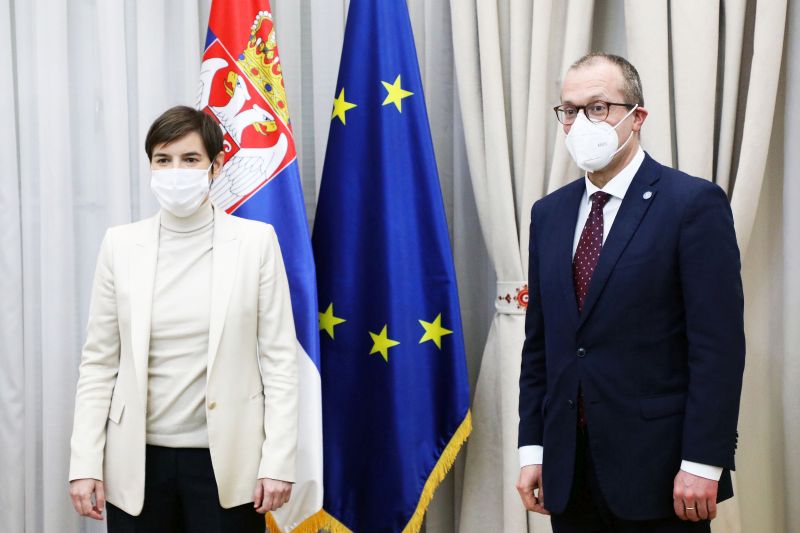
19 April 2021
Source: www.srbija.gov.rs
Photo: www.srbija.gov.rs |
|
|
| Selakovic: Pristina persists in its campaign of hatred against the Serbian people |
|
Minister of Foreign Affairs of Serbia Nikola Selakovic stated today that Pristina further persisted in its campaign of hatred against the Serbian people, which was most drastically seen in the unfounded accusations of mass rapes and genocide.
At the UN Security Council meeting discussing the Report of the UN Secretary-General on the work of UNMIK, Selakovic emphasized that the efforts of the provisional institutions in Kosovo and Metohija to create a narrative about mass rapes of Albanian women were obvious, and that propaganda methods and lies were used for that purpose.
"It is clear that there were victims on all sides in the conflict, as well as that our side has evidence of numerous Serb victims. But the precondition for ensuring the protection of rights that belong to each individual victim is a rational and well-argued approach", Selakovic said responding to the slander of the Pristina representative.
Selakovic underlined that, contrary to the claims of politicians from Pristina about 20,000 raped Albanian women, the information provided by the Commission for the Verification and Recognition of Sexual Violence Victim Status indicates 912 raped persons, however, failing to include in this number the Serb women who were victims of violence.
"Let me emphasize that Serbia condemns every act of sexual violence in conflicts and is committed to achieving justice for all victims. The number of victims certainly does not diminish the horrific effect of this type of violence on each victim individually, but also, speculating on numbers does not contribute to justice being served and leads to politicization and slowing down the reconciliation process", Selakovic said.
Regarding the genocide accusations, Minister Selakovic stated that they only went to prove that Pristina further persisted in its campaign of hatred, propaganda and open hostility towards the Serbian people.
"Through statements given on a daily basis, they attempt to paint a picture that Serbia is to blame for everything and that genocide was committed against Albanians, all in order to hide their own responsibility for the committed crimes", the Serbian Foreign Minister said.
He underlined that anyone who knew what the definition of genocide implied would understand that it was not Serbia that committed something, but that the Serbian people was instead a victim of the "state-building" project of the Kosovo Albanians, based on the dangerous idea of ethnically clean territories, as evidenced by more than 200,000 expelled Serbs from Kosovo and Metohija.
"We are convinced that the civilized world will not agree to be their accomplice in concealing and covering up their crimes, and that a clear message will be sent to them that they must take responsibility for their actions", Selakovic said.
He reminded that until 1999, around 40,000 Serbs lived in Pristina, and that today there were only about twenty of them, that around 17,000 Serbs lived in Pec, and that today there were only the Serbian nuns in the Patriarchate of Pec, that around 12,000 Serbs lived in Prizren before the war, and that today only 17 families remained there, and that in Urosevac, out of 10,000 Serbs who lived there before the war, only the family of a Serbian priest remained.
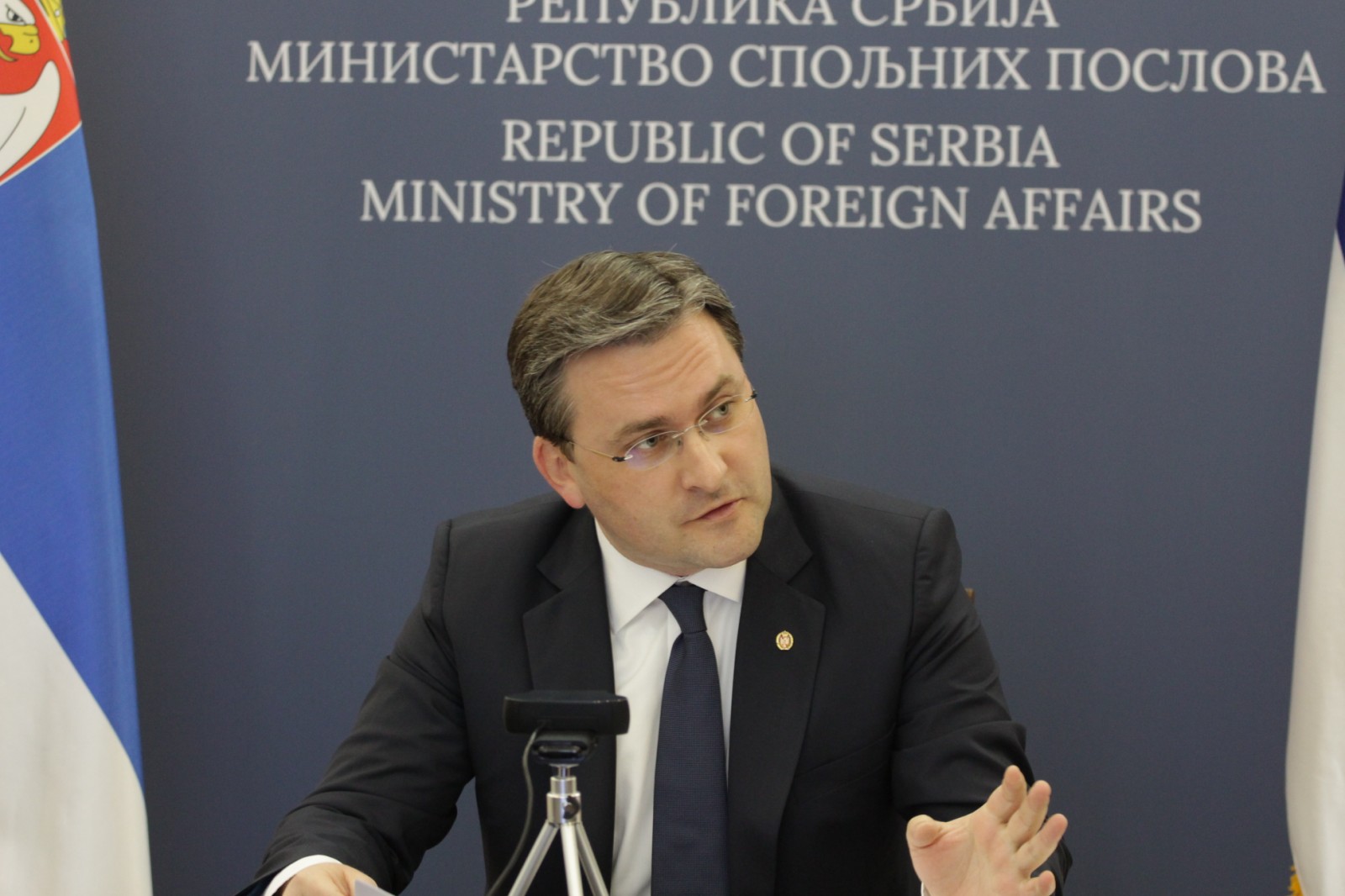
13 April 2021 |
|
|
| Selakovic: Political extremism of Albanians in Kosovo and Metohija is becoming stronger |
|
Minister of Foreign Affairs of Serbia Nikola Selakovic warned, at the United Nations Security Council meeting, that the political extremism among Albanians in Kosovo and Metohija was not decreasing, but on the contrary, was becoming stronger.
At the meeting discussing the Report of the UN Secretary-General on the work of UNMIK, Minister Selakovic recalled that the obligation to form the Community of Serb Municipalities remained unfulfilled for 2,917 days now and that, in fact, 19 April marked eight full years since the agreement was reached in Brussels, while Pristina still refused to follow up on its commitment and enable the formation of the Community of Serb Municipalities.
The Minister reminded that the current Prime Minister of the provisional institutions of self-government in Pristina repeatedly threatened to unite the self-proclaimed Kosovo and Albania, and that he also stated that the dialogue with Belgrade was low on the list of his priorities.
Minister Selakovic pointed out that it was high time for Albanian leaders in Pristina to show responsibility in fulfilling their commitments, but also a sincere commitment to reaching a compromise solution and building mutual trust.
"Serbia is determined and will not give up on identifying a compromise solution, which will be sustainable for future generations as well. The only way to build lasting peace and stability in our region is by working to build trust and insisting on positive political agendas", Selakovic concluded.
According to the Minister, lasting peace and stability can only be achieved if none of the participants in the dialogue pursued maximalist demands and insisted on the complete humiliation of the other.
He pointed out that the Serbian and Albanian peoples, as the two most numerous peoples in the Western Balkans, needed to find a way to reach reconciliation and a basis for cooperation, both in terms of the economy and in achieving shared prospects for membership of the European Union.
"Belgrade has made sincere steps in that direction, by being one of the initiators of the idea of relaxing the flow of people, goods, capital and services, popularly referred to as "mini-Schengen", the Minister underlined.
Pointing out that Serbia had time and time again demonstrated its commitment to dialogue as the only way towards a peaceful, political solution to the problem in Kosovo and Metohija, Selakovic underscored that the recent elections in the Province confirmed that political extremism among Albanians in Kosovo and Metohija was not decreasing, but on the contrary, was becoming stronger, which could be seen during the recent pre-election process.
Minister stressed that political pressures on Serbs continued even after the election process was completed, by denying Serbs fair representation in provisional institutions as the new so-called government in Pristina decided to assign only one ministry to the Serb community.
"Serb returnees represent a particularly vulnerable category, who spend their every day in fear of being attacked. I remind you that the southern Serbian province is still an area with the lowest return rate of displaced persons in the world", the Minister said and emphasized that, in the last year alone, more than 80 attacks and incidents took place in our southern province, targeting Serbs, their property and religious sites.
It is particularly worrying for the Serbian people in Kosovo and Metohija, Selakovic noted, that in the previous period, and especially in March this year, there were frequent physical attacks on the property of the Serbian Orthodox Church.
"A striking example of the disrespectful attitude towards Serbian cultural and religious monuments in the Province, whose exceptional universal value UNESCO confirmed by inscribing them on the World Heritage List, is the case of the Visoki Decani Monastery", the Minister underlined.
Furthermore, the Serbian Foreign Minister assessed as concerning the breaking into the Health Center in Strpce by police inspectors and officers, in January this year, who conducted a search aiming to discover Covid-19 vaccines there, originating from central Serbia.
"Although we consider this to be an intrusion into a health care institution, our reaction was restrained this time as well. We did not want our decisions to cause escalation and politicization of activities that are solely aimed at protecting public health. We organized the vaccination of citizens from Kosovo and Metohija at three locations in central Serbia and thus clearly demonstrated that people's lives are the top priority to us", the Minister stressed.
Minister Selakovic stated that Serbia highly valued the activities of UNMIK mission in Kosovo and Metohija and that it supported it in carrying out its work as efficiently as possible and undiminished in scope, aiming to build and preserve security in the Province.
Selakovic said that the international missions in Kosovo and Metohija - UNMIK, KFOR, EULEX and the OSCE mission, under the administration of the United Nations and in line with UNSC Resolution 1244, played a key role in the preservation of peace and protection of the population.
"We support and respect their engagement and efforts made in the framework of their mandates, with the common goal of creating conditions for a peaceful and safe coexistence of the inhabitants of Kosovo and Metohija. The Serb and other non-Albanian population in Kosovo and Metohija have the utmost confidence in the international presence and consider it a guarantor of security and a barrier against the arbitrariness of the provisional institutions in Pristina", the Minister emphasized.
He said that this demonstrated the need that international missions remain engaged in an undiminished scope, in order to consistently implement UNSC Resolution 1244.
Selakovic further emphasized the importance of KFOR international forces and pointed out that any unilateral attempt to assign to someone else or that someone else assumes a part of KFOR's mandate and responsibilities constitutes a violation of UNSC Resolution 1244.
The Minister also noted as unacceptable the unilateral decisions on the formation of the Pristina "Ministry of Defence" and launching the process of transforming the so-called "Kosovo Security Forces" (KSF) into the so-called "Kosovo Army".
At the beginning of his statement, Minister Selakovic lodged a protest against the abuse of the video format of the session by the representative of Pristina as she had a flag of the self-proclaimed "Kosovo" placed behind her, and the representative of Russia did the same.
Below is an integral version of the speech of the Minister of Foreign Affairs Nikola Selakovic
Distinguished President of the Security Council,
Distinguished Special Representative,
Esteemed members of the Security Council,
At the outset, I have no choice but to lodge a protest against the abuse of the video format of this session on the part of the representatives of Pristina in order to promote the symbols of the so-called statehood of Kosovo. Despite the fact that the representatives of Pristina were warned on several occasions, including by the President of the Security Council at the previous session, that such abuses of Security Council sessions are absolutely unacceptable and constitute a flagrant violation of the Security Council rules on participation of representatives of the provisional institutions of self-government in Pristina, under Rule 39 of the UN Security Council Rules of Procedure, we are again faced with their reckless disregard for the rules of this distinguished body. Let me reiterate our call for the necessary steps to be taken to prevent such abuses.
It is my great pleasure to address this august body at the meeting on the work of the Mission of the United Nations in Kosovo and Metohija. At the outset, I would like to thank Secretary-General of the United Nations Mr. Guterres and Special Representative of the Secretary-General and Head of UNMIK Mr. Tanin for the report submitted and for their efforts made towards the implementation of the UNMIK mandate, and also to the members of the Security Council for the continued attention they have devoted to the issue of Kosovo and Metohija. The Republic of Serbia highly values the activities of the Mission of the United Nations in Kosovo and Metohija and supports it in carrying out its work as efficiently as possible and undiminished in scope, aiming to build and preserve security in the Province.
Mr. President,
In the previous period we have faced political instability in Kosovo and Metohija. We recently had elections in the Province, which unfortunately confirmed that political extremism among Albanians in Kosovo and Metohija is not decreasing, but on the contrary, is becoming stronger. We have witnessed Albanian leaders competing among themselves in efforts to find the best way to provoke an incident in Serb communities, in order to score political points of the Albanian electorate. Under the pretext of amending the voter list, a large number of Serbs in Kosovo and Metohija were deprived of one of their fundamental political rights - the opportunity to elect their political representatives. Out of approximately 140,000 of citizens of Kosovo and Metohija who were removed from the voter list in the latest election process, 85% are Serbs.
Despite numerous challenges and problems, the Serbian people in Kosovo and Metohija have shown, by high turnout and a convincing victory of the Serb List which won all ten seats reserved for Serbian representatives, that nothing can stop them from resolutely defending their position. Political pressures on Serbs continued even after the election process was completed, by denying Serbs fair representation in provisional institutions as the new so-called government in Pristina decided to assign only one ministry to the Serb community.
Distinguished members of the Security Council,
Unfortunately, it was not only during the election activities that we witnessed the unreasonable anti-Serb policy being pursued by the provisional institutions in Pristina. This goes to the length of breaking into the Health Center in Strpce, in the south of Kosovo and Metohija, by police inspectors and officers from Pristina, in January this year, who conducted a search aiming to discover Covid-19 vaccines there, originating from central Serbia, which they did not find. In doing so they demonstrated force and threatened to arrest the director of the Health Center, medical staff and doctors. At a time when the whole world is fighting the pandemic with vaccines being the only way to end this challenge, while Serbia is showing support and solidarity by donating vaccines and medical equipment to all in need in the region, Pristina wants to destroy vaccines only because they originate from central Serbia. As the whole world expresses gratitude to medical doctors, who have made great and heroic sacrifices in combating the virus, the provisional institutions in Pristina are attacking Serbian doctors for doing their job.
Although we believe that intrusions into health care institutions are inadmissible, our reaction was restrained this time as well. We did not want our decisions to cause escalation and politicization of activities that are solely aimed at protecting public health. We organized the vaccination of citizens from Kosovo and Metohija at three locations in central Serbia and thus clearly demonstrated that people's lives are the top priority to us. Serbia continues to be ready to help all in need of assistance, and we call for reason and responsibility, especially in such difficult times.
Mr. President,
Attacks targeting Serbs and their property have been on the rise. In the last year alone, more than 80 attacks and incidents took place in our southern province, targeting Serbs, their property and religious sites. According to the information provided by the OSCE Mission in Kosovo and Metohija, in the second half of last year, the number of incidents increased by more than 30% compared to 2019. Therefore, we cannot agree with the assessment that the "security situation in Kosovo remained stable, with a few incidents reported affecting non-majority communities". Last weekend, for example, an entirely unprovoked physical attack by a group of Albanians on two Serb young men took place in the northern part of Kosovska Mitrovica.
Serb returnees represent a particularly vulnerable category, who spend their every day in fear of being attacked. The fact that one family of returnees was the target of seven attacks clearly indicates the persistence of those who do not want Serbs in Kosovo and Metohija. There is absolutely no trace of political will in Pristina for 212,995 displaced Serbs who have been living outside Kosovo and Metohija for 22 years to return to their homes. Since 1999, the rate of sustainable return of internally displaced persons in Kosovo and Metohija has been only 1.9%, which according to the UN data is officially the lowest percentage of return of expelled population after a conflict anywhere in the world.
At the same time, while arresting internally displaced persons, Pristina authorities are exerting the strongest of pressures on the Specialist Chambers in The Hague. The aim is to completely prevent the further processing of a number of cases against members of the terrorist KLA, on charges of serious crimes committed during the conflict in Kosovo and Metohija against both Serbs and persons belonging to other nationalities. President of the Specialist Chambers Madam Trendafilova recently warned that, should the pressures continue, this would have very dramatic consequences to the trials in progress. President Trendafilova underlined as highly problematic the phenomenon of witness intimidation, who are key for conducting proceedings successfully and rendering a proper verdict.
Although the wait to raise indictments was far too long, we consider it commendable that efforts have finally been made to punish the perpetrators of numerous serious crimes which were committed during the armed conflicts a little over two decades ago, but also upon the arrival of the international forces to Kosovo and Metohija. For example, no one has been held accountable to this day for the killings and abductions of 17 journalists in Kosovo and Metohija, which is currently the largest number of unsolved cases of murdered and kidnapped journalists in Europe. Furthermore, the perpetrators of any of the mass crimes committed against Serb civilians after 1999 have not been brought to justice. I will remind you of only a few of these cases: 14 Serb farmers were killed in the village of Staro Gracko, 12 displaced Serbs were killed and 43 wounded in the attack on the "Niš Express" bus in Livadice near Podujevo, and in Gorazdevac near Pec unknown persons fired automatic weapons on children who were swimming in the Bistrica river. Two Serb children were killed then, and four were seriously injured.
We expect the EULEX Mission to continue to support the Specialist Chambers and the Specialist Prosecutor's Office, as well as its additional engagement in the field of the rule of law. Special attention needs to be devoted to witness protection, and determining the fate of missing persons.
International missions in Kosovo and Metohija - UNMIK, KFOR EULEX and OMIK are an integral part of the international civilian and security presence in our southern province, under the administration of the United Nations and in line with UNSC Resolution 1244 (1999), and play a key role and make an outstanding contribution to the preservation of peace and protection of the population. We support and respect their engagement and efforts made in the framework of their mandates, with the common goal of creating conditions for a peaceful and safe coexistence of the inhabitants of Kosovo and Metohija. The Serb and other non-Albanian population in Kosovo and Metohija have the utmost confidence in the international presence and consider it a guarantor of security and a barrier against the arbitrariness of the provisional institutions in Pristina. This further demonstrates the need that international missions remain engaged in an undiminished scope, in order to consistently implement UNSC Resolution 1244.
I would like to further emphasize the importance of KFOR international forces and point out that any unilateral attempt to assign to someone else or that someone else assumes a part of KFOR's mandate and responsibilities constitutes a violation of the UNSC Resolution 1244, while also being a potential source of instability and tensions. I will remind you that Pristina, contrary to international law and completely ignoring the interests and positions of the Serb community in the Province, would not abandon its plans to install a new security actor in the territory of Kosovo and Metohija. We consider the unilateral decisions on the formation of the "Ministry of Defence" and launching the process of transforming the so-called "Kosovo Security Forces" (KSF) into the so-called "Kosovo Army" to be unacceptable. I would like to reiterate that such unilateral moves on the part of Pristina constitute a gross violation of the UNSC Resolution 1244 and the Military Technical Agreement, according to which only the International Security Forces, that is KFOR, have the mandate for all military aspects of security in the territory of Kosovo and Metohija.
In this context, an additional reason for concern is the announcement of the construction of the largest base of the "Kosovo Security Forces" in the southern part of Kosovska Mitrovica, which Serbs in the north of Kosovo and Metohija perceive as the most open provocation and threat to their physical safety.
Distinguished members of the Security Council,
It is particularly worrying for the Serbian people in Kosovo and Metohija that in the previous period, and especially in March this year, there were frequent physical attacks on the property of the Serbian Orthodox Church. In just two weeks, as many as seven Orthodox landmarks in the province were targeted by vandals, at a time when we all remember the March 2004 pogrom against Serbs and Serbian holy sites in Kosovo and Metohija. The condition of the Serbian cultural and spiritual heritage in Kosovo and Metohija is humiliating, including the four monuments that are inscribed on the UNESCO List of World Heritage in Danger (Visoki Decani, Holy Virgin of Ljevisa, Gracanica and the Patriarchate of Pec). Numerous administrative and technical barriers are imposed on priestly and monastic communities, which makes it more difficult or even impossible for them to survive on church property.
A striking example of the disrespectful attitude towards Serbian cultural and religious monuments in the Province, whose exceptional universal value UNESCO confirmed by inscribing them on the World Heritage List, is the case of the Visoki Decani Monastery.
Distinguished members of the Security Council,
The reason for the nervous behaviour of Pristina is all too obvious, as the project of the so-called independence today fails to be recognized by more than a half of the United Nations Member States, including five members of the European Union. However, it is high time for Albanian leaders in Pristina to show responsibility in fulfilling their commitments, but also a sincere commitment to reaching a compromise solution and building mutual trust.
I will remind you that the current Prime Minister of the provisional institutions of self-government in Pristina has repeatedly threatened to unite the self-proclaimed Kosovo and Albania in the past. A member of his party publicly said last weekend that the self-proclaimed Kosovo and Albania would be united, I quote, "with rifle and gunpowder, or referendum boxes".
I need not explain why such dangerous ideas constitute a direct threat to peace and stability. They violate Resolution 1244, while continuously destabilizing not only our southern province, but the entire region as well, and in no way contribute to the dialogue process, but instead hamper it again.
We have demonstrated time and time again our commitment to dialogue as the only way towards a peaceful, political solution to the problem in Kosovo and Metohija. Even today, after many years of negotiations, but also failure to fulfill what was agreed and constant unilateral moves and provocations on the part of the provisional institutions in Pristina, we are still ready to sit down at the table and talk.
We are ready for dialogue but not to be blackmailed and threatened and especially not for ultimatums recently presented by Prime Minister of the provisional institutions of self-government in Pristina. I will remind you of his statement that the dialogue will be low on the list of priorities of the Pristina authorities. It is bewildering how Pristina refers to ultimatums completely undermining any chance of dialogue, as the European Union also pointed out, as "principles" and how it persistently insists that Belgrade should recognize the unilaterally declared independence of "Kosovo", upon which, they believe, all else would be resolved. What is the purpose of the dialogue then, if Belgrade is only expected to recognize the so-called Kosovo? Does the dialogue imply that one side should give up everything only for the other to win it all? And does the dialogue, in Pristina's opinion, imply that what was agreed should not be fulfilled?
I will remind you that Pristina still refuses to follow up on its obligations arising from the agreements reached so far and does not agree to discuss their implementation within the dialogue. And the situation is quite simple - in April 2013, the first agreement was signed in Brussels, which envisaged four obligations: one for Pristina and three for Belgrade. Belgrade has fulfilled all obligations, while the only obligation that the provisional institutions in Pristina had - to form the Community of Serb Municipalities - has remained unfulfilled for 2,917 days now. In fact, 19 April marks eight full years since the agreement was reached in Brussels, and of Pristina's failure to fulfill the obligation to form the Community of Serb Municipalities.
Distinguished Mr. President,
Regardless of the discouraging messages heard from Pristina and the fact that the dialogue has been in progress for many years, Serbia is determined and will not give up on identifying a compromise solution, which will be sustainable for future generations as well. Lasting peace and stability can only be achieved if none of the participants in the dialogue pursues maximalist demands and insists on the complete humiliation of the other. The Serbian and Albanian peoples, as the two most numerous peoples in the Western Balkans, need to find a way to reach reconciliation and a basis for cooperation, both in terms of the economy and in achieving shared prospects for membership to the European Union.
Belgrade has made sincere steps in that direction, by being one of the initiators of the idea of relaxing the flow of people, goods, capital and services, popularly referred to as "mini-Schengen".
As far as Serbia is concerned, we are convinced that the only way to build lasting peace and stability in our region is by working to build trust and insisting on positive political agendas. The inhabitants of Kosovo and Metohija, of any nationality, whether they are Serbs or Albanians, do not deserve anything less.
Thank you for your attention.
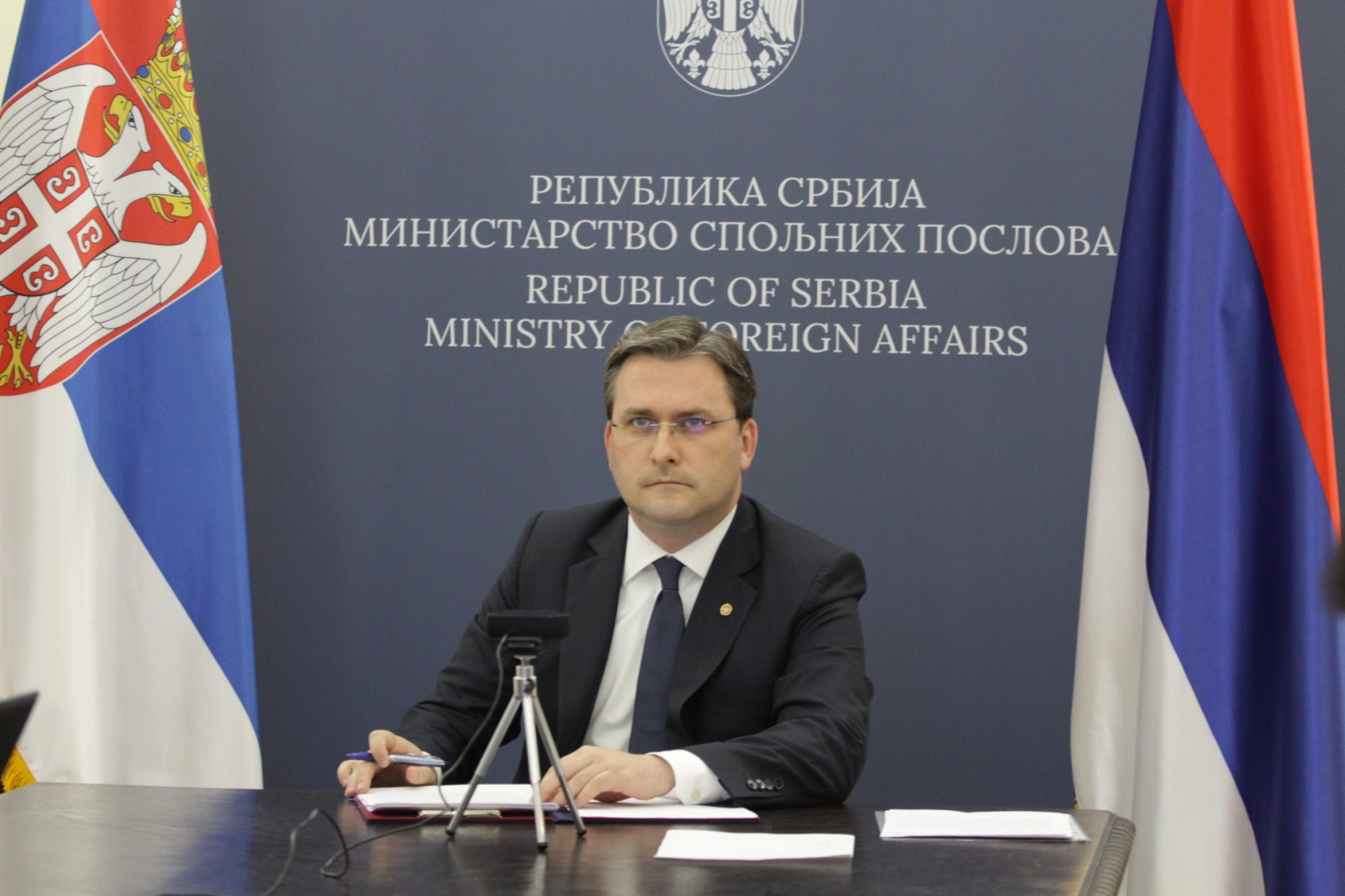
13 April 2021
|
|
|
| Commemorating Remembrance Day of 17 March 2004 - Pogrom in Kosovo and Metohija |
|
President of the Republic of Serbia Aleksandar Vucic participated today in the commemoration of the Remembrance Day of 17 March 2004 - Pogrom in Kosovo and Metohija. He said that exactly 17 years ago, a pogrom took place in Kosovo and Metohija, and that pogrom surpassed all other crimes.
"There may be times when we are powerless to prevent injustice, but there must never be a time when we fail to protest, these words of Elie Wiesel, a camp survivor and Nobel laureate, make it forever incumbent upon us not to remain silent against crime, regardless of who and for what reason committed it", President Vucic stated and added that we remembered and learned every lesson in which we were losers, each one in which we were silent to our own victims, and each one when we were ready to forget.
"Serbia is no longer weak today, nor is it a country of losers, it does not threaten, but it does not forget either, it is ready for talks, but not for humiliation. Serbia, just like everyone else, has the right to take care of its people, their safety and well-being. The right to life is a fundamental human right and we will always defend it", President Vucic said.
President Vucic said that pogrom surpasses all other crimes, because it is not only an act, but an intention, a policy, a premediated attempt to forcibly cleanse persons belonging to other peoples and faiths from a region or a country.
"We have no right to remain silent to that", said the President of Serbia, emphasizing that we have an obligation to be winners without blood spilled and war, to be the best in the economy, healthcare, sports, education and everything else that implies development and progress.
"We also wish others to work on themselves and be successful, because we are aware that crime is a tool for losers that winners do not need, as they remember, but forgive and move on, while the losers keep spinning in the same vicious circle. We Serbs do not want to be that anymore, we want a future in which we will remember, but from which we will not return. We know what happened and we call it by its real name", President Vucic concluded.
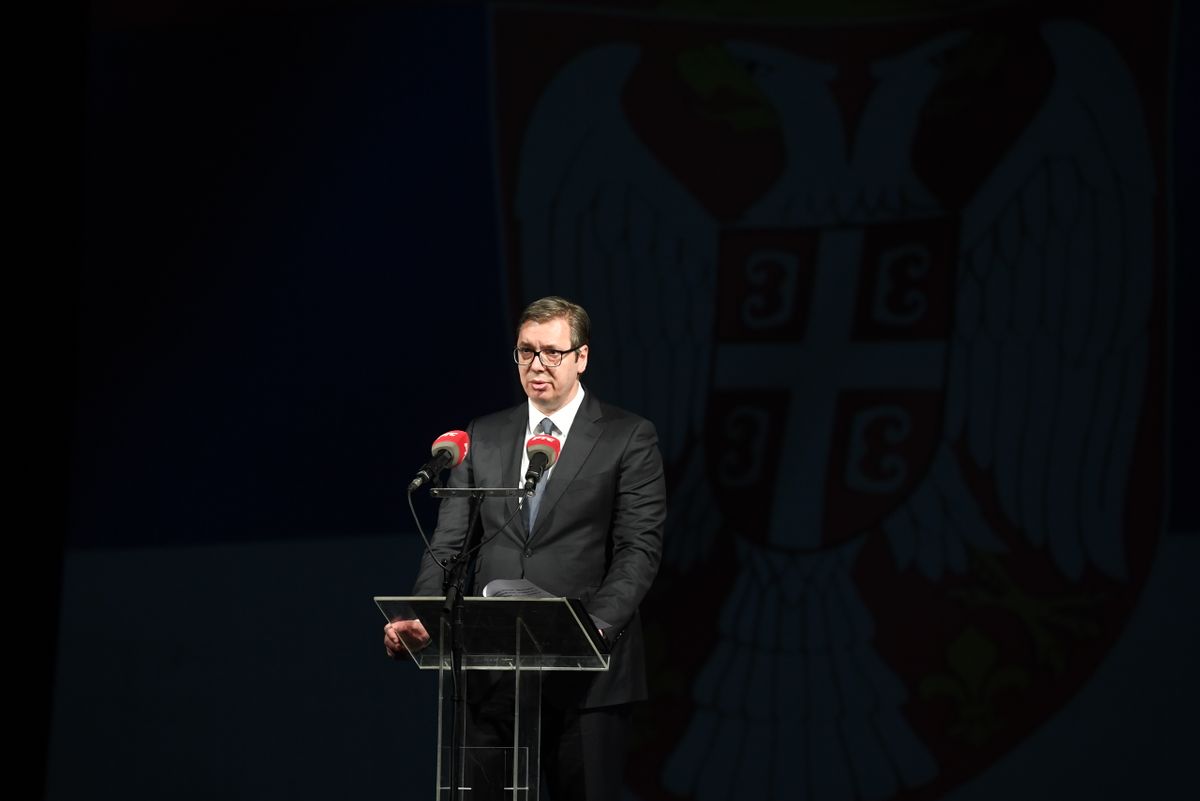
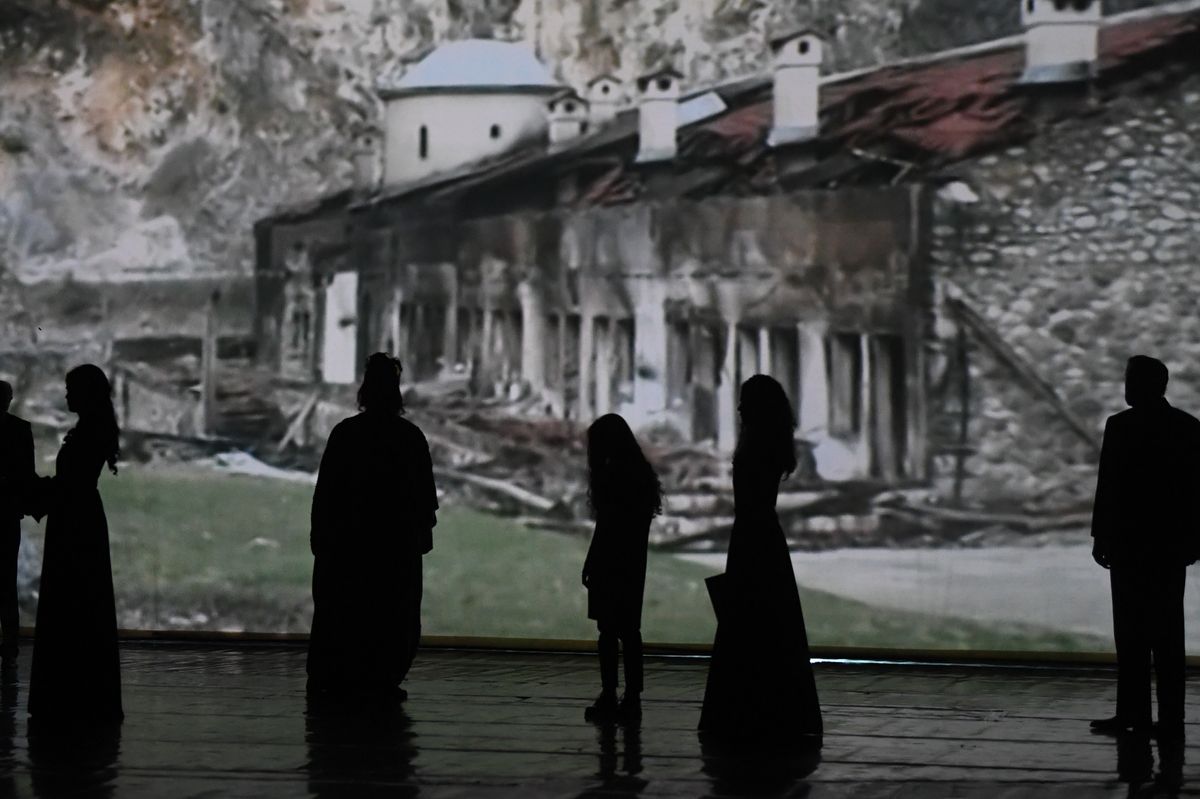
Photo: Dimitrije Goll
|
|
|
| Selakovic: Fight against all forms of crime is a priority of the Serbian Government |
|
Minister of Foreign Affairs of Serbia Nikola Selakovic said today that the fight against all forms of crime was a top priority of the Serbian Government and an integral part of the EU accession process.
"It is also our moral duty, in order to leave a better world for the generations to come", Selakovic said participating via video-link at the 14th UN Congress on Crime Prevention and Criminal Justice, held in Kyoto.
Minister Selakovic emphasized that Serbia, in its Second Serious and Organized Crime Threat Assessment from 2019, identified as its goal to eliminate cybercrime, human trafficking, terrorism and irregular migration.
The Serbian Foreign Minister pointed out that our country had established in a timely manner a normative and institutional framework that regulates prevention of abuse in this area, as well as that the Office of the Special Prosecutor for Cybercrime, a special court department and a special police unit were established.
The Minister underlined that, in the field of the fight against corruption, Serbia was guided by the postulates set out in the UN Convention against Transnational Organized Crime and the UN Convention against Corruption.
Selakovic pointed out the efforts made by the Anti-Corruption Agency, as an independent state body, to protect the public interest, build individual and institutional integrity, strengthen transparency and accountability of the public administration.
"We strongly condemn all forms of terrorism, including extremism and radicalism, and call for them to be fully eradicated, while implementing the relevant UN resolutions and conventions and the UN Global Counter-Terrorism Strategy", the Head of Serbian diplomacy underscored.
In order to combat these complex phenomena efficiently and successfully, Selakovic said, it was of vital importance to build capacities of our societies and states, while exchanging experiences at the regional and global levels.
Minister Selakovic thanked Japanese Ambassador Hikihara for the skill he showed in conducting the talks on harmonizing and adopting the Kyoto Declaration, which, as he stressed, was an important indicator of the commitment to creating and maintaining the institutional framework for crime prevention as one of the main preconditions for promoting sustainable development goals.
"Back in 1970 when Japan hosted this event for the first time, we demonstrated strong political will to draw attention to the problem. Today, it is incumbent upon us to reaffirm this willingness and resolve and translate it into concrete steps", the Serbian Foreign Minister said.
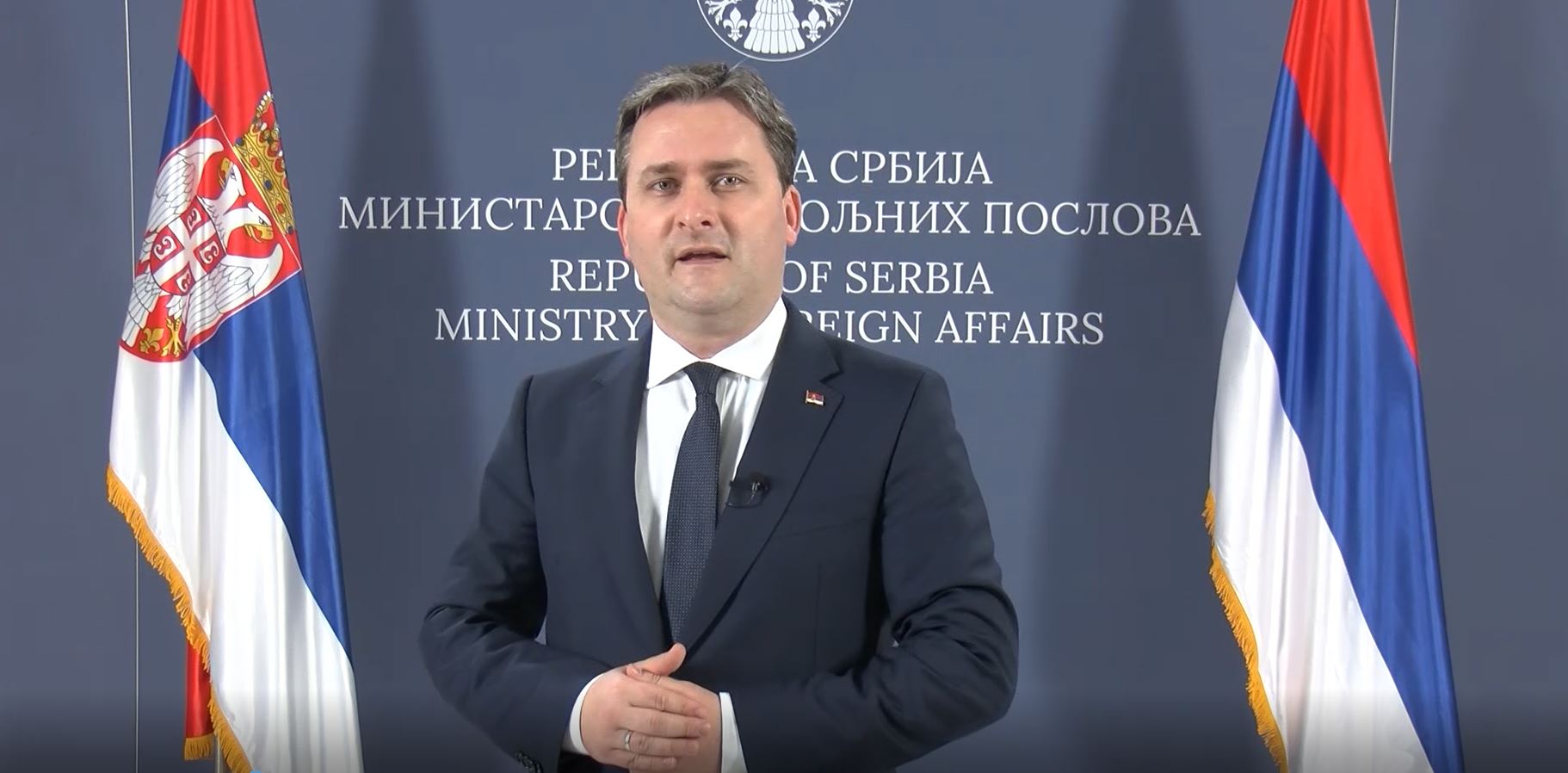
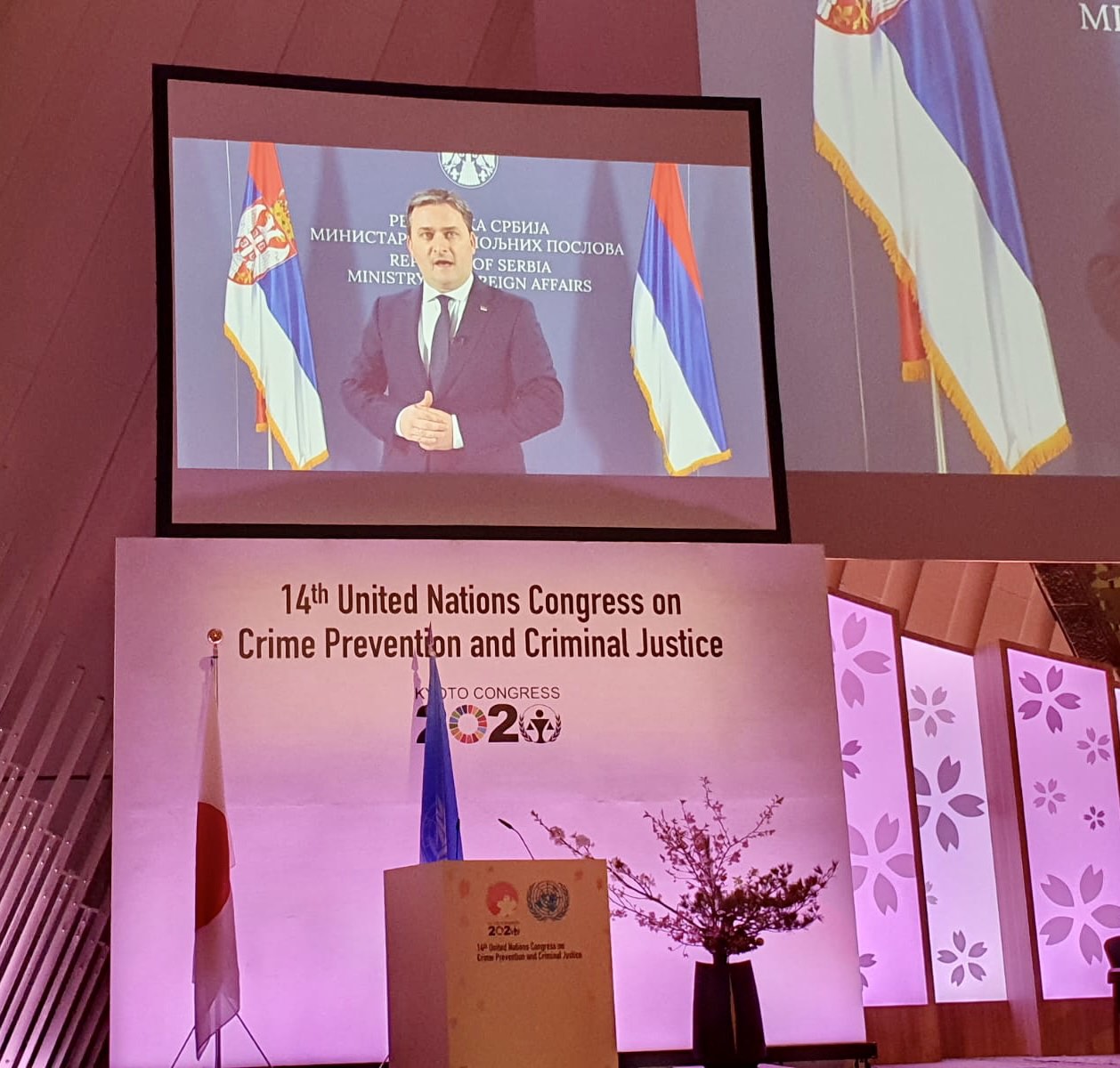
8 March 2021
|
|
|
| An investment conference with Slovenia to be held in the summer or fall |
|
After the meeting with Slovenian Deputy Prime Minister and Minister of Economic Development and Technology Zdravko Počivalšek, the Minister of Trade, Tourism and Telecommunications of the Republic of Serbia Tatjana Matić pointed out that Slovenia was one of the key investors in Serbia.
It was agreed at the meeting to start preparations for the investment conference. The date of the conference will depend on the course of the epidemiological situation, but it is expected that it be held in the summer or early fall at the latest.
Minister Matić expressed her belief that the conference would further accelerate investment growth, when it came to both Slovenian investments in Serbia and Serbian investments in Slovenia.
She stated that the foreign trade in goods between Serbia and Slovenia was good and that last year, during the pandemic, the volume of trade amounted to EUR 1.6 billion.
We believe that the exchange will double when the epidemiological situation improves and the business is done in more favorable conditions, Matić pointed out.
Discussing cooperation in tourism, she stated that Slovenia was a favorite tourist destination for our citizens, as well as that Slovenians were fond of visiting Serbia.
This is evidenced by the fact that the citizens of Slovenia account for 5% of foreign tourists visiting Serbia.
She pointed out great potentials for cooperation between Serbia and Slovenia in the field of tourism, primarily at the regional level, and also through joint participation on other markets.
The collocutors also discussed vaccination and Matić emphasized that Serbia was among the first in Europe in terms of immunization rate, with the exception of Great Britain.
Deputy Prime Minister and Minister of Economic Development and Technology of Slovenia Zdravko Počivalšek pointed out that Slovenia could look up to Serbia which made a big step forward in that area.
He assessed that, in the future, we should expect the potentials for cooperation between the two countries to be greater in all fields.
Počivalšek pointed out that the issue of crossing the border must be resolved, thus enabling the citizens of both countries to travel and cross the borders of either state without impediments, and added that Slovenia would endeavour to find European solutions to this problem. If that proves to be impossible, bilateral talks will be started in order to enable the citizens to cross the borders more easily, when the situation with Covid subdues.
He expressed satisfaction with the talks with the Serbian delegation and the agreement made to organize an investment conference as soon as the epidemic permits.
He confirmed that the exchange between the two countries was good and presented data according to which the Slovenian side exported goods worth around EUR 1.2 billion to Serbia, while imports from Serbia to Slovenia amounted to EUR 800 million.
Investment cooperation has been good as well. There was almost EUR 1 billion of Slovenian investments in Serbia, and EUR 250 million of Serbian investments in Slovenia, the Slovenian Minister stated.
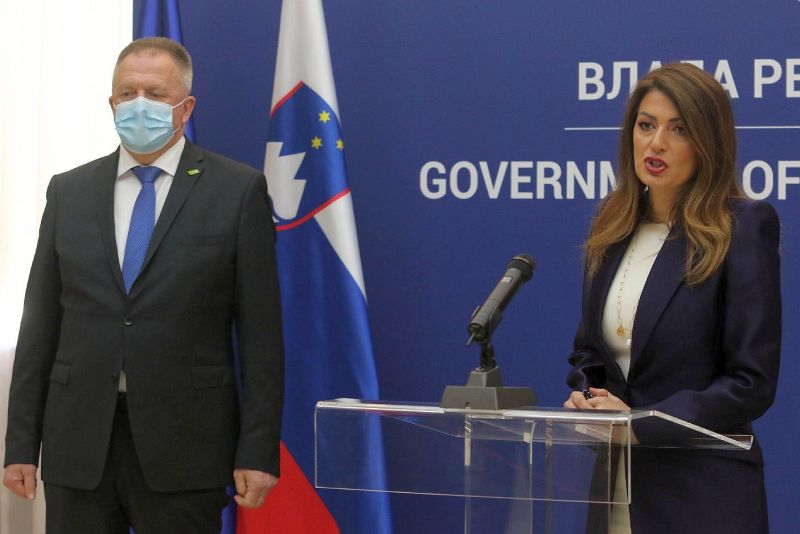
23 February 2021
Source: Tanjug
Photo: Fonet
|
|
|
| Metropolitan Porfirije of Zagreb and Ljubljana elected as the new Patriarch of Serbia |
|
The Holy Assembly of Bishops of the Serbian Orthodox Church elected His Eminence Metropolitan Porfirije of Zagreb-Ljubljana, PhD, as the new Serbian Patriarch, in its convocation in Memorial Cathedral of Saint Sava in Belgrade on 18 February 2021.
Immediately after the election a thanksgiving service was officiated and Many Years was chanted to the Archbishop of Pec, Metropolitan of Belgrade-Karlovci and Serbian Patriarch Porfirije. Bells at Saint Sava Cathedral in the Vracar district of Belgrade rang a few minutes before 4:00 pm indicating that the 46th Patriarch of Serbia was elected.
Newly-elected Archbishop of Pec, Metropolitan of Belgrade-Karlovci and Serbian Patriarch Porfirije (Peric) was born on 22 July 1961 in Becej, to father Radivoje and Mother Radojka. He was baptized as Prvoslav. He finished primary school in Curug, and the “Jovan Jovanovic Zmaj” Grammar School in Novi Sad. He was ordained a monk according to the rite of small schime by his spiritual father, then hieromonk Dr. Irinej (Bulovic), at Decani Monastery on Sunday of St. Thomas in 1985.
He graduated from the Faculty of Orthodox Theology in Belgrade in 1986, when the then Bishop of Raska-Prizren Diocese, future Serbian Patriarch Pavle of blessed memory, ordained him a hierodeacon at the monastery of Holy Trinity in Musutiste.
He attended postgraduate studies in Athens from 1986 until 1990. That year, upon the blessing of Bishop Dr. Irinej of Backa, he joined the monastery of Holy Archangels in Kovilj, where he was ordained as hieromonk and became its abbot.
Many young monks and novices came to the monastery following him. These were the years when the Kovilj Monastery became a spiritual center for many young people: intellectuals, artists, popular actors and rock musicians, especially from Novi Sad and Belgrade. Since then abbot Porfirije has particularly dealt with drug-addicted patients. In 2005, he formed for this purpose a therapeutic community called “The Land of the Living”, which is recognized as the most successful drug-addiction therapy project and, under the leadership of Bishop Porfirije, it has more than a hundred residents in camps throughout Serbia today.
During the ordinary meeting of the Holy Assembly of Bishops of the Serbian Orthodox Church in Belgrade on 14 May 1999 he was elected as Bishop of Jegar, Vicar of the Diocese of Backa.
He defended his PhD thesis Possibility of knowability of God in St. Paul’s understanding according to the interpretation of Saint John Chrysostom at the Faculty of Theology of the University of Athens in 2004.
He became a lecturer at the Faculty of Orthodox Theology - Department of Pastoral Psychology - succeeding famous psychiatrist, academician Dr. Vladeta Jerotic. His lectures have been attended not only by students of the Faculty of Orthodox Theology, but other Belgrade faculties as well.
Together with a group of experts: psychologists, doctors, criminologists, sociologists, Bishop Porfirije founded a civic association that deals with the resocialization of victims of destructive religious sects and cults.
Bishop Porfirije has not been just president of the Steering Board for a decade, but a real spiritus movens of the Humanitarian Fund “Privrednik”, which has provided scholarships for a great number of gifted, but poor pupils and students, regardless of their nationality or religious affiliation.
In 2005, the National Assembly elected him as representative of all Churches and religious communities, to be a member of the Council of the Republic Broadcasting Agency, and in 2008 the RBA elected him its president. As President of the Council of the Republic Broadcasting Agency, Bishop Porfirije supported the long-term interests of society and citizens, unaffected by political influences.
Since then, church radio stations have been heard in the broadcasting spectrum of Serbia. He has made a key contribution to launching of a series of radio and television shows dealing with religious topics.
In 2010, The Holy Assembly of Bishops entrusted him to establish military chaplaincy in the Serbian Armed Forces. The fruits of his labour in that field include not only the suitable legal regulations, but also the selection of military chaplains, the organization and equipping of churches at barracks and performance of the first religious services.
His expert theological works Bishop Porfirije published in magazines both in Serbia and abroad. He participated in a large number of scientific conferences and symposia across the globe.
Bishop Porfirije, as one of the most prominent contemporary Serbian clergymen and intellectuals, has an extremely wide circle of friends, not only in the Homeland, and he fosters personal friendship and close cooperation with priests and representatives of other Churches and religious communities.
He speaks Greek, English, German and uses the Russian language, while his style of communication is always adapted to his interlocutors.
He was enthroned as the Metropolitan of Zagreb and Ljubljana on 13 July 2014 in the Cathedral Church of the Transfiguration of the Lord in Zagreb. The solemn Hierarchal Liturgy was served by Serbian Patriarch Irinej, accompanied by a large number of archbishops of the Serbian Church and other sister Churches, as well as priests and monks, and pious people.
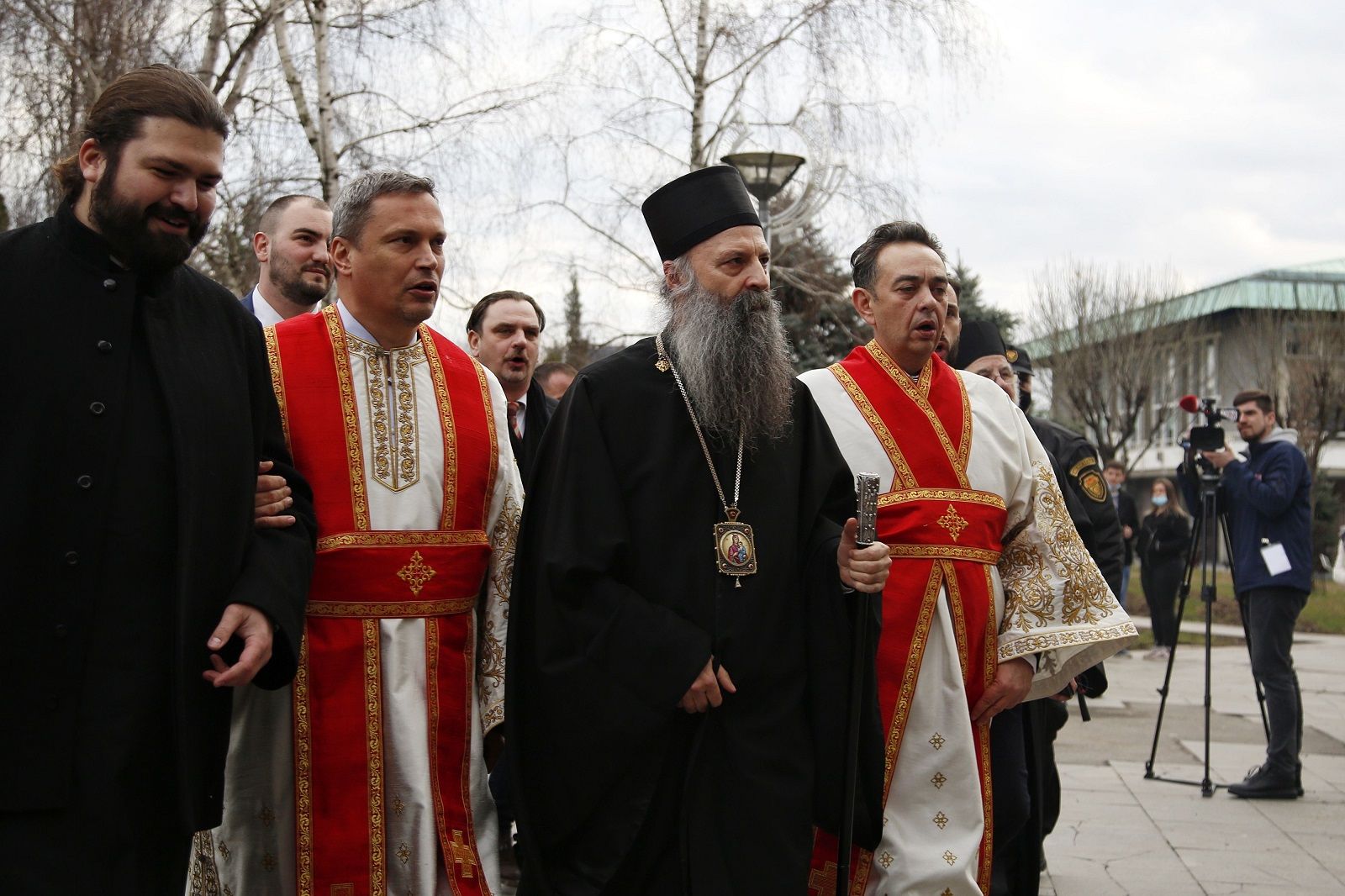
18 February 2021
Source: SPC/Serbian Orthodox Church
|
|
|
| Statehood Day of the Republic of Serbia - 15.02.2021. |
|
In honor of Statehood Day of the Republic of Serbia, Ministry of Foreign Affairs of the Republic of Serbia has prepared video material, which you can view here . |
|
|
| President Vucic: Serbia is ready for dialogue on Kosovo and Metohija, but will refuse being humiliated |
|
President of the Republic and Supreme Commander of the Serbian Army Aleksandar Vucic attended a demonstration of capabilities of one part of Serbian Army units in the "Rastko Nemanjić" barracks in Pancevo. On this occasion, President Vucic stated that Serbia was ready to continue the EU-facilitated dialogue with Pristina at any point, while respecting also the position of the United States as well as the positions of Russia and China.
The President said that he would rather put his "head on the chopping block" than sign any document with a recognition and reminded that he had already once refused to do so in Washington, where there were two versions of the agreement.
He stated that he immediately had his delegation leave the meeting, that he told the U.S. delegation that Serbia would not sign such an agreement, while conveying that Serbia would always endeavour to hold peaceful talks in order to preserve peace, but that it would not take any humiliation.
The Serbian President thanked the U.S. President Joe Biden for the letter of congratulations on the occasion of the upcoming Statehood Day, in which, in addition to the usual emphasis on commitment to promoting economic cooperation, regional stability and democratic values, he unequivocally called for mutual recognition of Serbia and "Kosovo" as a result.
Mutual recognition between Serbia and "Kosovo" is not part of any act of any world organization, the President pointed out and reiterated that Serbia was ready to continue the EU-facilitated dialogue with Pristina at any point, while respecting also the position of the United States as well as the positions of Russia and China.
According to the president, the situation is difficult and will only be increasingly difficult.
"As I told you three days ago, I can see it and I expect it, I can see the situation slowly tightening, because the conflicts between them at the global level have been increasing and intensifying, and then we have to pay the price", the President said.
President Vucic said that said that it was up to our state to continue strengthening the country in the economic sense.
The President added that the role of the army was very important in the highly complex security and political conditions of the modern world, and that was why Serbia needed to do everything it could to deter any potential aggressor and attacks on citizens and the country.
"The policy of strengthening the armed forces will continue at a faster pace", the President emphasized, adding that the goal was for the Serbian Army to play a stabilizing role with regard to the political developments in the region.
According to him, it should be clear to everyone that Serbia was not a punching bag and that not everyone could attack and threaten it like it was the case in the past.
Vucic said that he was pleased with what he saw and that a lot had been done in the previous period, pointing out that the salaries of military personnel would be significantly increased as of April.
President Vucic also stated that investments in the Serbian Army would continue, whom he told that he expected the Army to continue to be the guardian of our country, its integrity and freedom.
"We expect you to be the guardians of our country, its integrity and freedom, the defenders of our people, the guardians of the homeland, the protectors of the interests of the state of Serbia and to be a deterrent factor for every aggressor and anyone who might consider attacking Serbia", Vucic said.
The military exercise called "Spearhead" demostrated the capabilities of the 72nd Special Operations Brigade, and the event, which the President of Serbia and the Supreme Commander of the Serbian Army assessed as very good, was also attended by Deputy Prime Minister and Minister of Defence Nebojsa Stefanovic and Chief of General Staff of the Serbian Armed Forces, General Milan Mojsilovic.
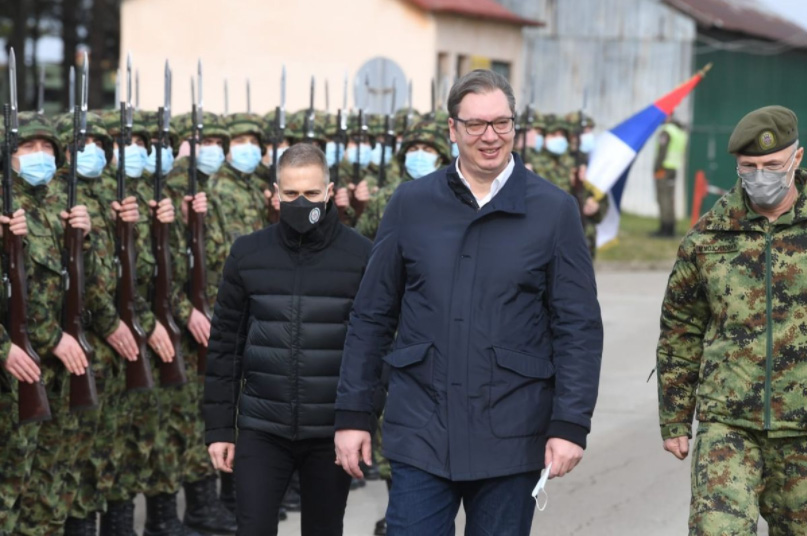
Photo: Presidency of Serbia / Dimitrije Goll
Belgrade,
7 February 2021 |
|
|
| Minister Selakovic: We do not respond to provocations, we want peace in the region |
|
Minister of Foreign Affairs Nikola Selakovic stated today that the position of Serbia was not to respond to the provocations of certain politicians from the region, because, he pointed out, it was determined to remain the factor of peace and stability in the region. Asked by the journalist to comment on Serbia's relations with other countries in the region in the context of more and more frequently heard provocative statements about our country, Minister Selakovic said that Serbia did not want to respond to provocations but to be the protagonist of all good initiatives bringing development to the region.
"Serbia's position in the region, politically speaking, is anything but simple, but what we will not give up on and in which we are completely determined is that Serbia is, will be and should remain the factor of stability in the region", Selakovic said.
He pointed out that the state demonstrated its role as a "factor of stability in the region" in several ways, including by refraining from commenting on and responding to provocations.
"There have been constant provocations, and as you are well aware, in previous decades, it was a kind of a hobby or regular activity to call out Serbia during the election campaigns in the region", Selakovic stated. He added that the state leadership never reacted to those provocations in a way that could be detrimental to our country as well as to others.
"On the other hand, we demonstrate our resolve to remain the factor of stability in the region, aiming to preserve political stability and peace, through our initiatives", Minister Selakovic pointed out, adding that "mini-Schengen" was one of these initiatives.
He recalled that the initiative advocated a tight market connectivity in the region and also that it was an opportunity for the entire region to strengthen its infrastructure and economy. Furthemore, the initiative implied the freedoms on which the EU is based upon - free flow of goods, people, capital and ideas, Selakovic said.
"This is the kind of initiatives Serbia has been presenting to its partners in the region, as the protagonist of those ideas", Selakovic underlined. He emphasized that in the period ahead, the focus would be on having other countries in the Western Balkans join "mini-Schengen".
Source: Tanjug
|
|
|
| Meeting with the Head of the Delegation of the European Union to Serbia |
|
President of the Republic of Serbia Aleksandar Vučić met earlier today with the Head of the Delegation of the European Union to Serbia, Ambassador Sem Fabrizi, to discuss Serbia's European path, continuation fight against the COVID-19 pandemic, implementation of political and economic reforms, with particular emphasis on the rule of law and plans for new EU investments in our country.
President Vučić thanked the EU for its support to Serbia in structural reforms and economic measures and the EU investments in our country. The President especially expressed hope that the first contingents of vaccines from the COVAX programme promoted by the European Union will arrive soon.
"Serbia was among the first to join this programme, thus showing once again that it is a serious and reliable partner of the European Union. I am convinced that together, with solidarity and mutual understanding, we will manage to get out of this crisis and continue working to recover the economy," said President Vučić, adding that the EU is the most important foreign trade and investment partner of our country since two-thirds of our trade and investments are related to EU countries.
The Head of the EU Delegation, Sem Fabrizi, affirmed that the EU will continue with solidarity to the fullest extent and that it will continuously work on ensuring the distribution of vaccines both in Serbia and in the Western Balkans countries. He expressed satisfaction with the Government of Serbia's results, especially emphasising that timely and decisive measures taken in the fight against the coronavirus contributed to maintaining the country's economic stability during the pandemic.
"Thanks to the current structural reforms, Serbia, in line with the accession process, has shown resilience to the crisis and the ability to mitigate the effects on the economy with excellent results in the healthcare area", Sem Fabrizi said, stressing that the pandemic did not affect the undoubted commitment of the Western Balkans to the EU process.
Ambassador Fabrizi also introduced President Vučić to the new head of the EIB's Office for the Western Balkans, Alessandro Bragonzi, who pointed out that it was a great honour for him to take over activities for the region at a time when it is facing such a difficult crisis.
The European Investment Bank invested 873 million euros in the Western Balkans during 2020, which is about 50 per cent more than in the previous year. Most of the assets, i.e. 531 million euros, are in line with the European Union's priorities for increasing connectivity and has been invested in the construction and modernisation of transportation infrastructure in the region.
"Serbia will continue its outstanding cooperation with the EIB, as we are strongly committed to building an economy based on sound and solid foundations, as well as on innovation and all other projects supported by the EIB so far, which have undoubtedly contributed to our good economic results in 2020", said President Vučić and pointed out that further improvement of the health system in Serbia, development of the infrastructure network and implementation of the green and digital agenda remain key priorities of Serbia. The President also expressed hope that with the EIB's support, the planned projects will be successfully completed.
"Following this commitment, Serbia is determined to create an even more favourable business climate with additional packages of subsidies for the investors from the EU who want to invest in our country", said President Vučić.
"The European Union and the European Investment Bank, with the approach of 'Team Europe', support Serbia's strategic goals, including in the field of connectivity, environment and energy and work on priority projects such as reconstruction and construction of an additional building of the Clinical Centre of Serbia, reconstruction of the Clinical Centre Vojvodina, modernisation of railway infrastructure, gas interconnector from Bulgaria, Mir highway and Corridor 10", said Ambassador Fabrizi and expressed the EU's readiness to continue with investments that will encourage further economic growth of Serbia, which are at the heart of the new EU economic and investment plan for the Western Balkans.
He said that Serbia must continue its European path and that further support of the Union in strengthening, adopting and implementing reforms is critical, for the benefit of the citizens.
"We will continue to work intensively on fulfilling the European agenda, aimed at opening new chapters and faster progress on the path to EU membership", concluded President Vučić.
President Vučić and Ambassador Fabrizi discussed the process of harmonising Serbia's legislation with the legislation of the European Union and agreed that more energetic work is needed in the area of the rule of law.
The two interlocutors also discussed judicial reform, the fight against corruption, media freedom and the resumption of inter-party dialogue.
Ambassador Fabrizi and President Vučić confirmed the importance of continuing the EU facilitated dialogue with Priština.
Belgrade,
4th February 2021 |
|
|
| President Vucic: Serbia is the first in Europe in terms of growth |
|
Serbian President Aleksandar Vucic pointed out that Serbia is the first in Europe in terms of economic growth, which will be officially confirmed at the end of March, and that this was possible owing to the reform measures taken since 2014 and the rapid opening of the country after the first wave of corona virus.
The President pointed out that Serbia had a growth of 5.2 percent in the first quarter, while the Eurozone was at minus 3.2 percent, in the second quarter Serbia had a growth of minus 6.3 percent, while the Eurozone was at minus 14.7 percent, and in the third quarter, when the Eurozone was at minus 4.3 percent, Serbia's figure was only minus 1.4 percent.
Vucic stated that Montenegro, for example, recorded as much as 26 percent minus in the third quarter.
Furthermore, the President emphasized that hospitals were built and renovated in our country, and that two hospitals were built from the ground up in just four months.
He said that the state made significant efforts to procure respirators, masks, gloves, protective suits, medicines, everything that was needed, and pointed out that work was being done on 10 general hospitals throughout Serbia, adding that all these were major achievements that were only possible owing to the success of the 2014 reforms, the enactment of the Labor Law, which yielded excellent results, and also through fiscal consolidation measures.
"These are unprecedented results for Serbia. Was Serbia ever before the first in Europe in terms of growth rate? We will get the results on 31 March that will confirm that Serbia is number one in Europe. All that was possible thanks to people who believed in difficult changes", Vucic said.
According to the President, this year, as many as six highways will be built in Serbia at the same time, and in this regard, he noted that Bulgaria has announced that the highway from our border to Sofia will be completed by the end of the year, after which it will be possible to use motorway to travel to Istanbul, which is very important to ensure that our country is on a transport route.
President Vucic emphasized that in 2020, the so-called year of corona, our country had a net inflow of foreign direct investment amounting to EUR 2.9 billion net, and three billion gross, which means that many foreign companies such as Toyota Tires, Boysen, ZTF and Brose have invested in Serbia even in this year of crisis.
The President said that Serbia has the highest average wages in the region, amounting to 511 or 512 euros, and that in February, due to the January increase, the average wage will be 535 or 536 euros, and that only in Belgrade in the last seven years the average wage increased by 180 euros or 40 percent.
That President said that Serbia was fourth in the region in terms of salaries before, and that today we are officially the first, and that the difference in relation to other countries will only increase faster. He also pointed out that the employment rate is growing in Serbia as well as that our public debt increased less than in most European countries. This is illustrated by the data that in Italy the public debt surged to 156 percent, in Germany to 87 percent, in France to 114 percent, in Croatia to 88 percent, while in Serbia it is at 57 percent.
The Serbian President announced that by Sretenje, 15 February, an additional package of assistance to the economy will be earmarked, and as he explained, it will be a new capital injection for companies, the trade, entrepreneurs, small, medium and large enterprises which, as he said, concerns 1,052,000 people within that system.
Vucic specified that it will most likely be help in the form of two or three payments amounting to half a minimum wage each, and that there will also be sectoral aid for tourism, hotel owners, travel agencies, guides, for bus carriers, through another half minimum wage payment.
The President added that efforts will be made to extend the guarantee schemes as well, which proved to be excellent, amounting to 1.5 billion, and this time, through the same system, two more portions amounting to 500 million each could be provided.
Vucic said that the first agreements with DFC worth 300 to 400 million dollars are expected in seven days.
He also stated that the state will endeavour to help pensioners further, in addition to increasing pensions by 5.9 percent in January, which will be reflected in their first checks in February, and added that pensioners should by March receive symbolic aid in the form of packages with vitamin C, D and zinc, which, as the President said, are small things, but they reflect the state's care and efforts made to protect health.
The President announced that negotiations on the procurement of the Chinese vaccine would be completed in the next seven to eight days, after the first quantities of the Pfizer and Sputnik V vaccines have arrived in Serbia, and pointed out that the Chinese vaccine was of exceptional quality, but probably the most expensive, which is why he wrote to the Chinese President and asked for a discount for our country.
Vucic thanked the Americans for deciding to sell the vaccine to our country and noted that no one in the region other than Serbia has received it, except for the small quantity that Albania got.
He pointed out that our state relied on itself and its own capacities, and that our state leadership anticipated that vaccines within the European COVAX plan would arrive late.
The President rejected the claims about bad results of Serbia in the fight against the corona virus and stated that our country has recorded the lowest corona virus mortality rate in the region.
He presented statistical information indicating that Slovenia had 144 deaths per 100,000 inhabitants, North Macedonia 126, Bosnia and Herzegovina 123, Bulgaria 115, Montenegro 115, Hungary 110, Croatia 107, Romania 85, and Serbia 51.
"The mortality rate in the region is as follows: Bulgaria 3.9, Bosnia and Herzegovina 3.7, Hungary 3.11, North Macedonia 3.03, Romania 2.48. Slovenia 2.15, Croatia 1.99, Montenegro 1.4, and Serbia 1.0. This can be seen in the graphs and is no fabrication", the President stressed.
He said that the state will fight for vaccines, and that only Serbia, in the Western Balkans, received significant quantities of vaccines, other than a smaller quantity that Albania received, and added that in one day since the registration for vaccination opened, as many as 63,000 persons have registered.
President Vucic expressed his belief that the year ahead will be better than the previous one as well as that the corona virus will be defeated through vaccination of citizens.
Belgrade,
12 January 2021 |
|
|
| Every Serb in the diaspora is potentially a lobbyist |
|
Our compatriots living abroad are one of the great potentials that the state has not recognized in the right way so far, which is why a different approach is needed to the issue of how to strengthen our diaspora and use the good will of people who are potential lobbyists for the interests of Serbia and the Serbian people, Foreign Minister Nikola Selakovic said.
"When it comes to Serbs in the diaspora, and especially in the region, this issue has been a kind of an unattended crop which requires a lot of work, and even when a lot is done at once this is not apparent immediately ", Minister Selakovic stated in an interview with Tanjug.
He emphasized that the appointment of the Director of the Office for Cooperation with the Diaspora and Serbs in the Region for the first time after almost seven years since this body was formed within the Ministry of Foreign Affairs, shows that it is one of the priorities of the Ministry he is at the helm of.
Selaković notes that intensive efforts have been long underway on forming a plan to make the diaspora more visible both outside the borders of Serbia and in the mother country itself.
"Every person in the diaspora is a potential lobbyist for the interests of our country and people, and we need to find the right way to use that", he said.
That much can be done in that regar Selakovic illustrates with the fact that only in Switzerland, in 24 cities, there are Serbian cultural and artistic associations which amounts to more than 3,000 young people who get together in order to preserve our tradition, culture, the Serbian language and history.
"If they were able to set up such associations in 24 cities, it speaks volumes about the enthusiasm of these people. There is so much enthusiasm, energy and love in these people. We need to explore ways to help them and use their good will and potential", the Minister points out.
He also cites the example of an emigrant family in Canada, the Varaklic family from southwestern Serbia, who sends Christmas packages for children in the Raska region every year. He adds that they have so far donated hundreds of thousands of dollars to non-governmental organizations for those needs alone, but he says that we do not see that here.
"The state does not recognize this, and these are people who gained success as entrepreneurs working in a distant country, who can be serious lobbyists for Serbia, for Serbian interests, someone who represents us in the best possible way", Minister Selakovic said.
Minister Selakovic also pointed out that Arnaud Gouillon has been appointed as head of the Office for Cooperation with the Diaspora and Serbs in the Region and described him as a man of extraordinary energy, great love for the Serbian people, which he showed in his engagement towards Serbs in Kosovo and Metohija, where they were seriously endangered.
"By doing so, he showed and set an example to many of our compatriots of what an individual can do. And when one such individual focuses energy, enthusiasm and love for people, on work done within the state administration system, I think that the preconditions have been created for such activities to yield good results", Minister Selakovic said.
3 January 2021
Source: Tanjug |
|
|
| Serbian Prime Minister the first PM in Europe to receive a Covid-19 vaccine |
|
Prime Minister of the Republic of Serbia Ana Brnabic received today the first vaccine against the coronavirus made by Pfizer company, at the Torlak Institute of Virology, Vaccines and Sera.
Brnabic, who is the first European Prime Minister to receive the vaccine, pointed out that this day may be the first since 6 March that we have a reason for a smile on our faces as it marks the beginning of the end of the coronavirus pandemic in Serbia, but also in Europe and the world.
As Prime Minister and as someone who leads the COVID-19 Crisis Response Team, I felt obliged to be the first to receive the vaccine, to show that we believe in it, as well as in our institutions - the Medicines and Medical Devices Agency of Serbia and experts who worked round the clock to test the vaccine, she said.
Underlining that it was an honour to do this for her country and be the first to pave the way for all citizens, the Prime Minister said that she agreed with President of the Republic Aleksandar Vucic that the two of them receive different vaccines, so he will most likely receive the next one that arrives, most probably the one produced by China.
At the moment we have the Pfizer-BioNTech consortium vaccine, and the vaccines from the Chinese Sinopharm are expected in the near future, as well as certain quantities of the Russian vaccine Sputnik V.
She expressed her belief that at the end of the first quarter or the beginning of the second quarter of next year we will have the vaccine of the company AstraZeneca, and after that the vaccine manufactured by Moderna.
As we promised, all vaccines licensed in their countries and approved by relevant international agencies will be available to our citizens, and of course they will be tested by all of our agencies and institutes as well, the Prime Minister pointed out.
She said that prior to the vaccination of health care workers, Minister of Health Zlatibor Loncar will also receive a vaccine shot as we endeavour to serve as an example and show how confident we are in the vaccines and institutions.
Brnabic pointed out that Serbia, not counting Great Britain, is the first country in Europe to receive the Pfizer-BioNTech vaccine, and the third to start a mass immunization and campaign for giving the vaccine - after Great Britain and Switzerland.
We achieved something very important and we will not stop even for a moment until the immunization of the population is completed, the Prime Minister said.
She specified that our country will receive another 16,000 doses of Pfizer-BioNTech vaccine in January, as well as that together with other vaccines we will have a total of one million doses in January, and a total of approximately two million doses during the first quarter of next year.
There is a dynamic on which Pfizer delivers vaccines and it varies depending on the production, and this is the case with deliveries to both Serbia and all other countries worldwide. We expected to receive 10,000 doses from Pfizer-BioNTech in December, however 4,807 doses arrived, the Prime Minister explained.
Serbia demonstrated that it is able to fight and succeed if we all work as a team, Brnabic said and called on all not to see the beginning of vaccination as the end of the fight already, but to continue to apply all measures instead.
This is to be certain and to be able to help our health care workers, and once the immunity is acquired we will be able to slowly start taking off the masks in 2021, but until then we should not see this as a victory but as the beginning of the end, the Prime Minister concluded.
After the Prime Minister, vaccine shots were also administered to the Minister of Labour, Employment, Veteran and Social Affairs and a member of the COVID-19 Crisis Response Team Darija Kisic Tepavcevic and to Predrag Kon who is also on the COVID-19 Crisis Response Team.
Furthermore, vaccine shots were also given to Head of the MMA Department for the Prevention and Control of Nosocomial Infections prof. Dr. Vesna Suljagic and academician Predrag Pesko, professor of Belgrade and Heidelberg universities and full member of the Serbian Academy of Sciences and Arts.
The first quantities of the vaccine arrived in Serbia on 22 December, and today they will be administered to patrons of nursing homes in Belgrade and Novi Sad.
Serbia is the first country in the region to receive a shipment of Pfizer-BioNTech vaccine.
In addition to procuring the vaccine among the first countries in the world, even before EU countries, Serbia is one of the rare countries that managed to build and open two covid hospitals in record time. The hospitals with 930 beds in Batajnica and 500 beds in Krusevac are a major contribution to the expansion of capacities and strengthening the health care system in the fight against coronavirus and, as President Vucic said, represent a monument of the future, that will talk about the accomplishments the state made in a short time.
Also, we recall that investments in health infrastructure have been large in Serbia, and since 2016, 80 health centers and clinics have been renovated, and works are underway on six large health centers. This way more than EUR 200 million was invested in the reconstruction, construction and equipping of hospitals and more than 300 million in the renovation of clinics and specialized hospitals, and many have already been completed, such as the University Children's Hospital Tiršova, and KBC Zemun nad KBC "Dragiša Mišović" hospitals.
The absolute priority of the Serbian Government is the successful completion of health infrastructure projects that are underway, but great attention is also paid to health workers,
whose salaries have, by 2020, been increased by 56.8% for specialist doctors, and 66.9% for
nurses, while significant funding is invested in the education of health professionals, as well as in equipment and working conditions.
Like other countries, Serbia has faced great challenges this year, most notably health challenges, and all factors in the state were focused on preventing the spread of the virus and safeguarding the lives and health of citizens. Serbia has faced these challenges better than many wealthier and more developed countries in Europe and the world.
Belgrade,
24 December 2020 |
|
|
| Gouillon with Serbs in Slovenia, donation for Serbian language schools |
|
Acting Director of the Office for Cooperation with the Diaspora and Serbs in the Region Arnaud Gouillon is on a two-day visit to Ljubljana where he attended the celebration of the religious holiday of Saint Nicholas and handed over a textbooks donation to the supplementary Serbian language school in Slovenia.
Gouillon expressed satisfaction at the fact that he began his first official visit on Saint Nicholas day, one of the most widely celebrated Serbian patron saint days, and that he handed over a donation of 1,500 textbooks and classic book sets to improve teaching in Serbian language primary schools in Slovenia.
He said that it was a good way to preserve the Cyrillic script and continue the activities that the Office has been carrying out for many years.
"We are here to help and show the care of the state of Serbia towards each and every member of the Serbian people, wherever they may be, primarily starting with the youngest who represent our future," Gouillon said at the Serbian Embassy in Ljubljana.
Gouillon held an online class in the digital classroom, in the presence of supplementary school teachers, and explained how he learned the Serbian language.
The supplementary school of the Serbian language in Slovenia has started working in the 2020/2021 school year and so far 60 teaching groups with 817 students have been formed.
The project was realized by the joint efforts of the competent institutions of Serbia, several Serb associations in Slovenia, Serbian Orthodox Church clergy, numerous individuals and interested parents.
In the course of 2020, the Office for Cooperation with the Diaspora and Serbs in the Region distributed more than 4,000 textbooks and educational publications in the Serbian language for the needs of supplementary Serbian language schools abroad.
During his visit to Ljubljana, Gouillon met with the Ambassador of Serbia to Slovenia Zorana Vlatkovic and visited the Orthodox Church of Sts.Cyril and Methodius and the Parish Home. |
|
|
| J. Joksimović and Roth on Serbia’s negotiations and new methodology |
|
Minister of European Integration Jadranka Joksimović has held a video meeting today with Michael Roth, the Minister of State for Europe at the German Federal Foreign Office. They have discussed the current epidemiological situation in the two countries and the EU, as well as Serbia’s European integration process.
Joksimović and Roth have also talked about the issues related to the EU’s internal situation, particularly regarding the new seven-year budget, the place and the future of the enlargement policy and the Western Balkans, notably about all aspects of Serbia’s accession process, challenges and expectations from the new methodology, which should bring a faster negotiation process that would be better monitored and directed under stronger political steering.
Joksimović has particularly informed Roth about the fact that the Government of Serbia prepared a concrete implementation plan for the first negotiation cluster on the rule of law, which comprises five rule-of-law chapters that have already been opened, adding that the realisation of the plan has already begun.
“This serious implementation plan includes a repeated initiative sent to the National Assembly for the adoption of constitutional amendments, the adoption of the Action Plan for the implementation of the Media Strategy, as well as the Working Group on monitoring the implementation of the Action Plan and the Working Group on journalist safety and protection”, said Joksimović, according to the press release published by the Ministry of European Integration.
She has also stressed that GRECO recommendations for the fight against corruption have been published in a transparent way, and that further actions will be taken in line with them.
She has further presented all other important segments of Serbia’s reform policy in all six clusters, including Green Agenda, digitisation, Economic and Investment Plan for the WB, and stable and sound macroeconomic indicators, stressing that, therefore, this year, Serbia has again undeniably demonstrated that it deeply and substantively participates in key EU policies and that it is a credible European country.
Joksimović has emphasised that Serbia understands that the EU and member states will need some more time to define the application of the new methodology to Serbia’s negotiation process, and that it is therefore important to maintain a constant and open dialogue so as to direct the process in line with the new methodology.
She has expressed regret that conclusions on enlargement have not been adopted this year and that, consequently, the political Intergovernmental Conference with Serbia has not been held during the German presidency.
On the other hand, the Minister has expressed belief that the upcoming Stabilisation and Association Council will offer an opportunity to discuss all political and economic aspects of Serbia’s process at the highest level.
Roth has thanked Minister Joksimović for the information and issues she shared, as well as for Serbia’s proactive approach regarding reforms and active acceptance of the new methodology.
He has underlined that Germany supports Serbia and the enlargement policy, particularly welcoming all significant steps that the new Serbian Government has already taken, especially regarding cluster 1 – rule of law, where he stressed that they are an important and positive signal for Serbia’s European path.
He has agreed with Minister Joksimović about the need to urgently define the application of the new methodology to countries that are already in the accession process, where clusters of European policies and Serbia’s participation therein become an instrument for measuring progress in the accession process.
He has conveyed that Germany will advocate the holding of the political Intergovernmental Conference with Serbia in the first half of 2021.
The interlocutors have particularly discussed the Economic and Investment Plan for the Western Balkans, agreeing that it represents another proof that the European Union gives strategic importance to a stable and sustainable development of the region, particularly in difficult circumstances of curbing the effects of the COVID-19 pandemic.
Joksimović has thanked Minister Roth for Germany’s long-term and concrete assistance to Serbia’s European integration, not only at the political level, but also through providing development assistance for financing reform projects, and successful strategic investments that have created a significant number of new jobs.
The interlocutors have also agreed that it is extremely important that, through the COVAX Facility, Serbia has ensured that its access to vaccines procured by the EU will be almost simultaneous with the EU member states’ access.
|
|
|
| STATEMENT BY THE MINISTRY OF FOREIGN AFFAIRS OF THE REPUBLIC OF SERBIA |
|
On the occasion of 10 December, the international Human Rights Day, the Ministry of Foreign Affairs of the Republic of Serbia reaffirms its commitment to the principles and values of the Universal Declaration of Human Rights, adopted on this day in 1948.
The principles enshrined in the Universal Declaration of Human Rights have been the foundation for the development of international law in this field, and of the international system for the promotion and protection of human rights, as a unique achievement of modern civilization. It is incumbent upon us today to safeguard and strengthen the international system ensuring respect for human rights, to develop human rights standards, control the implementation of commitments, and also to continue cooperating with international and regional institutions on the protection of human rights.
Serbia is fully committed to the universal values of human rights and implementing in practice the international legal instruments relating to human rights. Our continued cooperation with the Human Rights Council mechanisms in the framework of the United Nations, with the Council of Europe and the mechanisms of the OSCE human dimension, represents an important segment of activities carried out by all state authorities, thus demonstrating our consistent commitment to the implementation of international human rights standards.
The international Human Rights Day is an opportunity to point out once again that Serb and other non-Albanian population is being deprived of its rights in Kosovo and Metohija and to call again on the international community to ensure the respect for the guaranteed international human rights norms and contribute to creating conditions for the return of internally displaced persons and giving them back their usurped property.
|
|
|
| President meets the ambassadors of the EU member states accredited to Serbia and the head of the European Union Delegation |
|
The President of the Republic of Serbia Aleksandar Vučić met today the ambassadors of EU Member States accredited to Serbia and the Head of the EU Delegation Sem Fabrizi in the Palace of Serbia, to talk to them about topics such as dynamics of the accession negotiations between Serbia and EU, stability in the region, regional projects, as well as the Economic and Investment Plan presented by the European Commission together with the Enlargement package.
President Vučić once again confirmed that cooperation with the European Union and fully-fledged membership of Serbia remain one of the key foreign policy priorities of our country. He particularly emphasised that in this respect Serbia is honestly dedicated to further and deeper reforms, approaching them with responsibility and seriousness, and that it tries to adopt and apply the best practice through cooperation with institutions of the EU and its member states.
"Serbia will continue being dedicated to the promotion of peace and stability in the region, by improving bilateral relations with neighbours, and by strengthening regional cooperation while respecting all concluded agreements", President Vučić stated, adding that the European future of the Western Balkans is of utmost importance for both stability of the entire region and security and further prosperity of the EU.
Ambassadors pointed out that declarations on the common regional market and the Western Balkans green agenda, which were signed by Serbia and all leaders of the region, received a warm welcome in Brussels and EU Member Stated, and that good and solid connectivity and integration of the region largely facilitates the cooperation of the very Union with the Western Balkans in all areas of joint interest.
"As much as 70% of foreign investments come from the countries whose representatives are sitting here today", Head of the EU Delegation to Serbia Sem Fabrizi said, adding that Serbia can rest assured the EU will continue supporting and investing in the Serbian economy. While Covid-19 has put all economies under stress, Serbian economy has resisted and proved its resilience. With the Economic and Investment Plan for the Western Balkans, the EU will remain Serbia's strongest partner for economic recovery which will support infrastructures, green and digital transition. We welcome the announced reforms in the areas of rule of law, including judiciary reforms and media freedom. This is precisely the base for acceleration of the accession process and we encourage the new government to keep working and implementing in this direction", Fabrizi said.
President Vučić pointed out that Serbia highly appreciates that the EU, despite numerous challenges it is facing has managed to preserve the enlargement issue on its agenda, especially through the recent adoption of a new, changed methodology of the negotiation process.
"In this respect, we expect from the EU that Serbia's accession negotiation dynamics follows and values our reform efforts", President Vučić said pointing out that Serbia is ready to continue working with its European partners on implementation of the reforms and numerous joint projects.
President Vučić particularly noted that Serbia welcomes the Economic and investment plan presented by the EC together with the Enlargement package, and expressed our country's readiness to continue working with the partners in the region on the implementation of this Plan so as to improve the economic potential of the region and achieve better infrastructure connection, which would bring us closer to the single European market.
"In this context, we hope the Multiannual financial framework 2021-2027 will be adopted soon, because that will mean a possibility to use funds designed for reform implementation in Serbia and in the region", President Vučić said, reiterating that Serbia remains on its European path with an honest faith in cooperation with the European partners.
"2020 has been an extremely difficult year for all, especially the impact of COVID–19. When I look at new Government's commitment to implement reforms, the Economic and Investment Plan of the EU, the new methodology and increased cooperation to fight COVID-19, I see 2021 with a much more favourable perspective for progressing the enlargement", Fabrizi concluded.
President Vučić also pointed out that Serbia is prepared to work intensively with the EU Member States on finding an adequate response to the new challenges, such as COVID-19 pandemic.
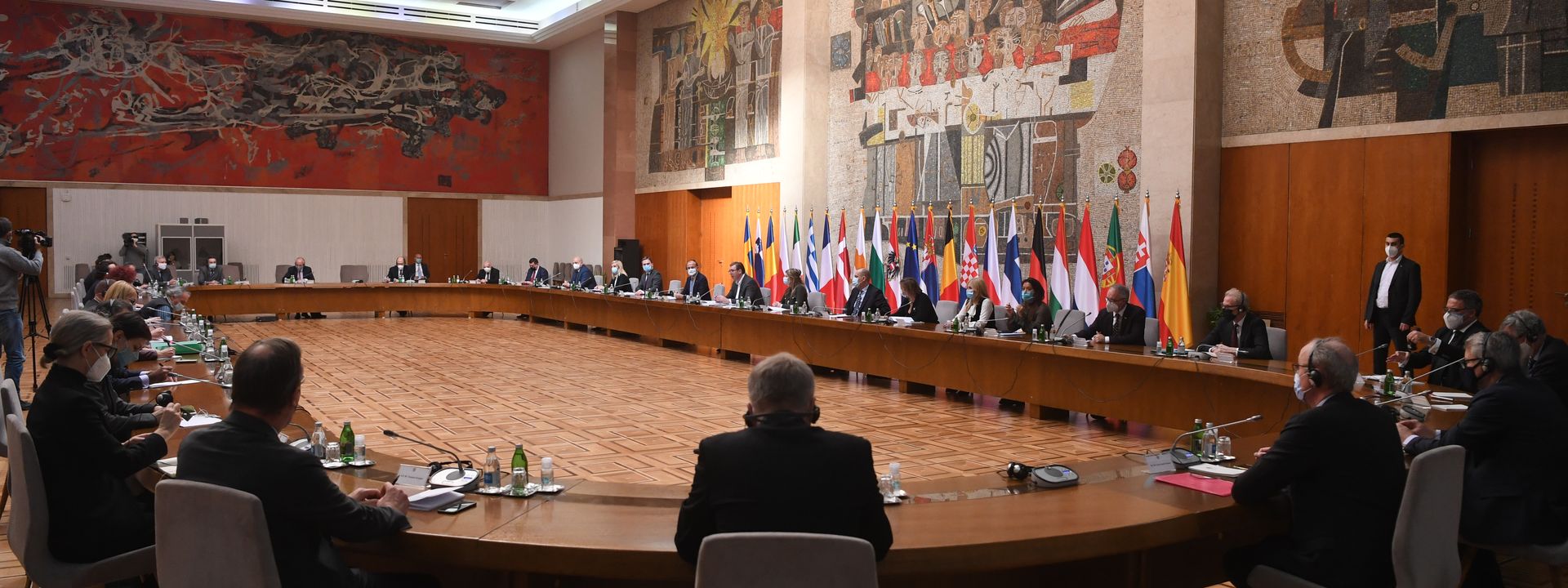
|
|
|
| INVITATION TO TENDER FOR THE PROVISION OF REAL ESTATE SALES SERVICES – THE SALE OF DIPLOMATIC REAL ESTATE IN NEW YORK (UNITED STATES OF AMERICA), TOKYO (JAPAN), BONN (GERMANY), AND BERNE (SWITZERLAND) |
|
INVITATION TO TENDER FOR THE PROVISION OF REAL ESTATE SALES SERVICES – THE SALE OF DIPLOMATIC REAL ESTATE IN NEW YORK (UNITED STATES OF AMERICA), TOKYO (JAPAN), BONN (GERMANY), AND BERNE (SWITZERLAND) is published in the Financial Times and the Economist. |
|
|
|
|
|